FLORIDA PLANNING
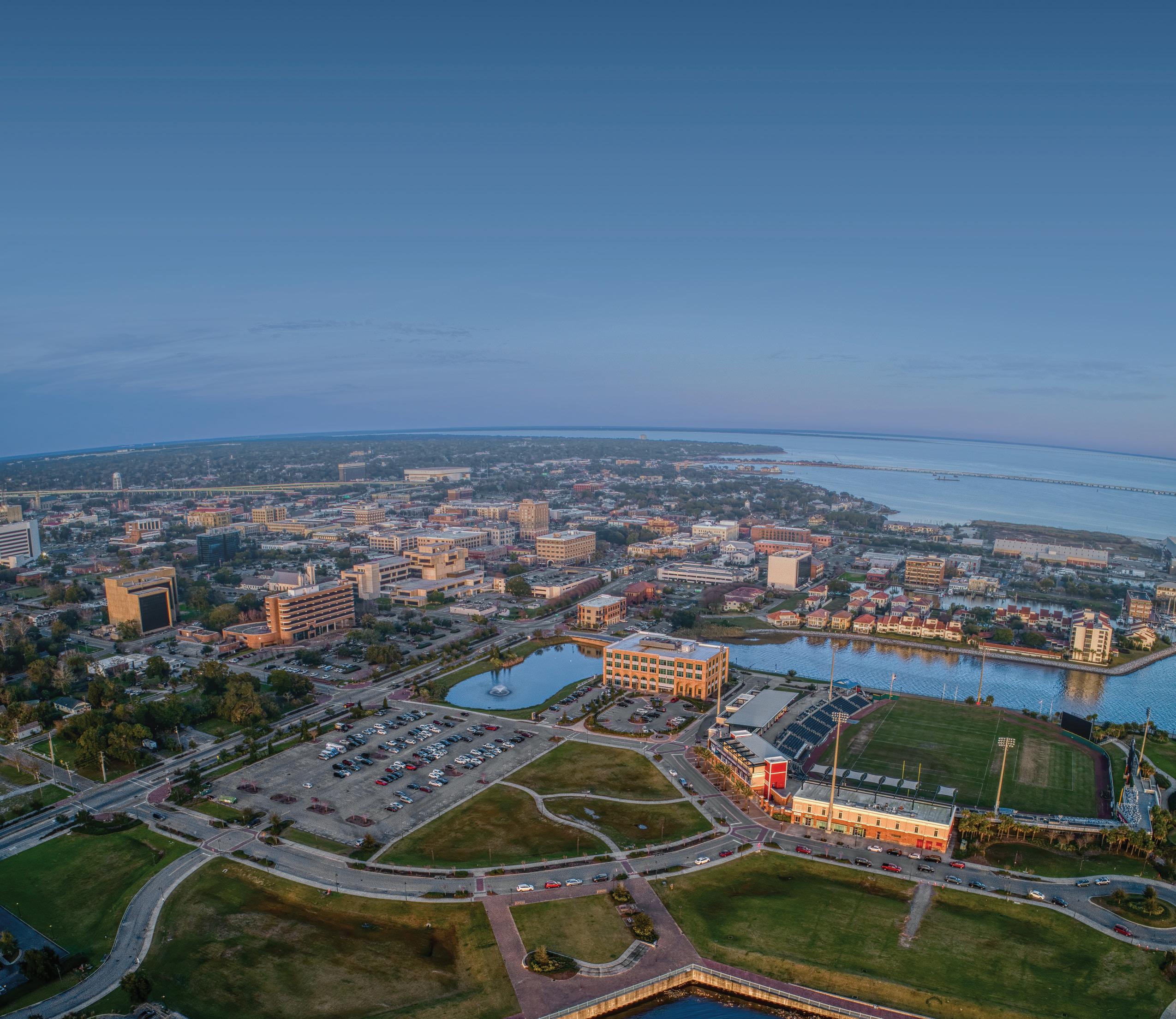
the Hard & Soft Costs
By Cynthia Cannon, AICP


By Cynthia Cannon, AICP
APA Florida Executive Committee
President Allara Mills-Gutcher, AICP
president@floridaplanning.org
Immediate Past President Whit Blanton, FAICP pastpresident@floridaplanning.org fx
President-Elect Edward Ng, AICP, MPP, MPA presidentelect@floridaplanning.org
Treasurer Brad Cornelius, AICP,CFM,CPM treasurer@floridaplanning.org
Secretary Jerry Bell, AICP secretary@floridaplanning.org
VP Communications Ali Palmer communications@floridaplanning.org
VP Continuing Education Lara Bouck, AICP, PE certmaintenance@floridaplanning.org
VP Conference Services Kathie Ebaugh, FAICP conferencesvcs@floridaplanning.org
VP Professional Development Melissa Dickens, AICP profdevelopment@floridaplanning.org
VP Membership/Outreach Tony Palermo, AICP membership@floridaplanning.org f
VP Section Affairs Juan Mullerat sectionaffairs@floridaplanning.org
Atlantic Coast Section Brad Parrish, AICP atlanticcoast@floridaplanning.org
Broward Section Hing Wong, FAICP broward@floridaplanning.org
Capital Area Section Kwentin Eastberg, AICP capitalarea@floridaplanning.org
Emerald Coast Section Melissa Ward, AICP emeraldcoast@floridaplanning.org
First Coast Section Casey Dendor, AICP firstcoast@floridaplanning.org
Gold Coast Section Jared Beck, AICP goldcoast@floridaplanning.org
Heart of Florida Section Julie Womble heartoffl@floridaplanning.org
Orlando Metro Section Roxann Read, AICP, CMA, FRA RA orlandometro@floridaplanning.org
Promised Lands Section Laura Tefft, AICP promisedlands@floridaplanning.org
San Felasco Section Gerry Dedenbach, AICP sanfelasco@floridaplanning.org
Sun Coast Section Nousheen Rahman, AICP suncoast@floridaplanning.org
Treasure Coast Section Scott Evans, AICP treasurecoast@floridaplanning.org
University Liaison Billie Ventimiglia university@floridaplanning.org
EPG Representative Fatima Elkott epg@floridaplanning.org af Student Representative Kaitlyn Nieman students@floridaplanning.org
Executive Director Stefanie Svisco ssvisco@floridaplanning.org
Ad. Assistant/Bookkeeper Suzie Gray sgray@floridaplanning.org
Communications Manager Patti Shea pshea@floridaplanning.org
Legislative Representative Lester Abberger contact@floridaplanning.org Metz Husband & Daughton
Communications Intern Chloe Harbin intern@floridaplanning.org
Graphic Design (Consultant) Summer Taylor summerapafl@gmail.com
All other inquiries, contact APA Florida at 850-201-3272 or e-mail contact@floridaplanning.org
WORDS MATTER, AND HOW WE CONVEY THEM IS IMPORTANT.
We are in a time of significant change. I hear your concerns and recognize the uncertainty many of you feel about the evolving role of professional planners and the influence we hold on shaping our communities.
At different points in our lives, each of us has encountered beliefs or statements that challenge our values or professional ethics. As planners, we are social scientists; we care deeply about our communities. We work to ensure that they are safe, inclusive, resilient, and thriving. When policies or events seem to jeopardize that mission, it is natural, and I’d argue appropriate, for us to speak up.
But our response must focus on the issue, not the individual. We must remain strategic and mindful of our audience, especially when engaging in legislative or policy decisions at the state or local level.
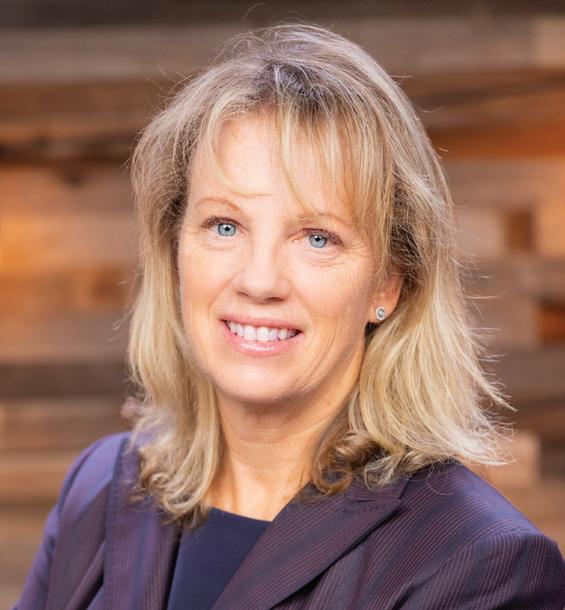
We are fortunate to have experts supporting our advocacy, including Jason Jordan, APA’s Public Affairs Principal, and our dedicated Florida legislative consultants. From them, we hear a clear, actionable approach for public messaging:
• Know the purpose of your message. What do you want your message to achieve? Will it move the needle? Will the message build bridges or burn them? If an issue has already been passed or approved, can taking a public stance still support ongoing advocacy?
• Be transparent and realistic. Honesty and integrity are crucial to becoming a “turn-to” in becoming a trusted resource.
• Ground our message in with our mission, vision, and values. We have recently updated our principles to better reflect who we are and where we’re going. Our purpose is that: “We exist to champion a stronger tomorrow together.” Our mission is that “We are the leading voice for Florida’s future.” We are collectively stronger than we are alone, and through collaboration, we will become a trusted and impactful voice for our profession and the communities we serve.
• Be clear and concise. Our Legislative Policy Committee is refining and prioritizing its focus to deliver a streamlined and effective advocacy message that clearly communicates our platform.
At different points in our lives, each of us has encountered beliefs or statements that challenge our values or professional ethics.
We should also ask ourselves:
• Do we have a demonstrated track record on the topic?
• Can we share relevant experiences and outcomes?
• Does the issue have a direct and tangible impact on the planning profession?
The credibility of our message depends on our ability to speak from experience – with authenticity, depth, and empathy. We need to be able to illustrate the real-world impact on the people and communities our elected officials represent.
At the same time, we must consider the risk to our diverse membership. APA Florida includes professionals in public, private, and nonprofit roles, each with different scopes and authority and political contexts. As an organization, our responsibility is to support and elevate all our members and the planning profession as a whole.
With that in mind, we want to hear from you.
In the coming weeks, we’ll be offering opportunities for you to share what’s happening in your communities, how recent legislative changes are affecting your work, and how APA Florida can help amplify your voice.
Your stories are powerful and they are essential to strengthening our advocacy efforts with credibility and impact. Let’s move foward together with purpose, clarity, and unity.
Allara Mills-Gutcher, AICP APA Florida President
continued from cover page
As important as those bounce-back tactics are, planners in Florida are broadening their view of resiliency to include prevention, mitigation and adaptation strategies in order to avoid as many impacts as possible. They’re also acknowledging that our social infrastructure is equally important as our physical infrastructure.
This past year, the Resilient Florida Grant Program provided funding for the City of Pensacola to complete a Vulnerability Assessment, which has already proven to be a valuable planning tool. The primary focus of the assessment is on the built environment, and it identifies critical municipal and regionally significant assets that may be impacted over horizons 2040, 2070, and 2100.
This asset inventory serves as a foundation for prioritizing our aging infrastructure system from the highest to the least vulnerable based on risk and exposure to sea level rise and compound flooding events. Additionally, the report identifies areas of immediate need and “hot spots” based on the intensity of flooding; and it includes non-governmental assets such as healthcare and utility assets.
The Social Vulnerability Index (SVI) data layer is also incorporated in Pensacola’s Vulnerability Assessment and highlights the importance of social vulnerabilities in community resilience. The emotional and mental devastation in the aftermath of flooding and natural disasters isn’t as visible as physical destruction and yet, just as impactful to a community's ability to recover. For example, the term “blue roof syndrome,” has become a regular part of our dialogue during hurricane season because it’s a ubiquitous visual that cannot be avoided after a storm.
After Hurricane Katrina, we started learning about “Katrina Brain” and gained a better understanding of the toll these disasters would have on the human spirit. Bankruptcy, suicide, and divorce rates all increase at alarming rates. Suicide rates increase on
Pensacola Storymap
FEMA Social Vulnerability
NOAA Coastal Resilience Index
average by thirty-one percent after a hurricane, and thirteen percent after a major flooding event. Social resiliency is challenging. It requires data to be factored into a community's overall resilience score and requires establishment of strong partnerships and community ties with non-government organizations, i.e., faith-based networks, civic organizations, and neighborhood associations, to strengthen social systems.
Another tool that has incorporated soft factors is NOAA’s Coastal Resilience Index (CRI), A Community Self-Assessment which evaluates how prepared your community is for a disaster. The evaluation metrics include transportation issues, critical infrastructure, mitigation measures, community plans, business plans, and social systems. This tool helps guide communities in defining the social systems that serve as the core of their community. Strengthening those social systems should be ongoing and a top priority.
Cynthia Cannon, AICP is the Planning and Zoning Manager for the City of Pensacola. She can be reached at ccannon@cityofpensacola.com


By Chris Niforatos, P.E.
In an era marked by climate uncertainty and aging infrastructure, resilience has become a cornerstone of modern water and wastewater utility planning.
Three seasoned engineers from Kimley-Horn — Chip Votava, Chris Igo, and Chris Niforatos — recently shared their insights on how the industry is evolving to meet these challenges head-on.
With more than 60 years of combined experience, the trio emphasized that resilience is not a one-size-fits-all concept.
“Resilience means planning for an uncertain future,” said Chris Niforatos, who has worked on resilience projects both nationally and internationally. “It’s about preparing utilities to withstand both sudden shocks like hurricanes and chronic stresses like sea level rise or drought.”
Chip Votava, based in Virginia Beach, recounted how a devastating hurricane early in his career shaped his approach to utility design. “We lost power to nearly 90% of our pump stations — over 350 facilities,” he said. “That experience taught me the importance of redundancy and emergency planning.”

Chris Igo, who works in North Texas, highlighted the importance of maintaining service continuity. “Resilience is about how a utility continues to fulfill its mission — providing safe and reliable water — even during crises,” he said. He pointed to the 2010–2011 droughts and subsequent flooding as examples of why long-term planning is essential.
The engineers also discussed the historical evolution of risk management in the water sector. From the Cold War-era focus on infrastructure protection to the post-9/11 Bioterrorism Act and the more recent America’s Water Infrastructure Act (AWIA) of 2018, the regulatory landscape has steadily pushed utilities toward more comprehensive risk assessments and emergency response planning.
Under AWIA, all drinking water systems serving more than 3,300 people must conduct risk and resilience assessments and update their emergency response plans every five years. “It’s not just a box to check,” Igo said. “It’s a chance to identify vulnerabilities, prioritize investments, and build partnerships across city departments.”
In Florida, where rising seas and extreme weather are pressing concerns, new state legislation will soon require sea level impact projections for cost-share projects in vulnerable areas. “It’s about stewardship,” Niforatos said.
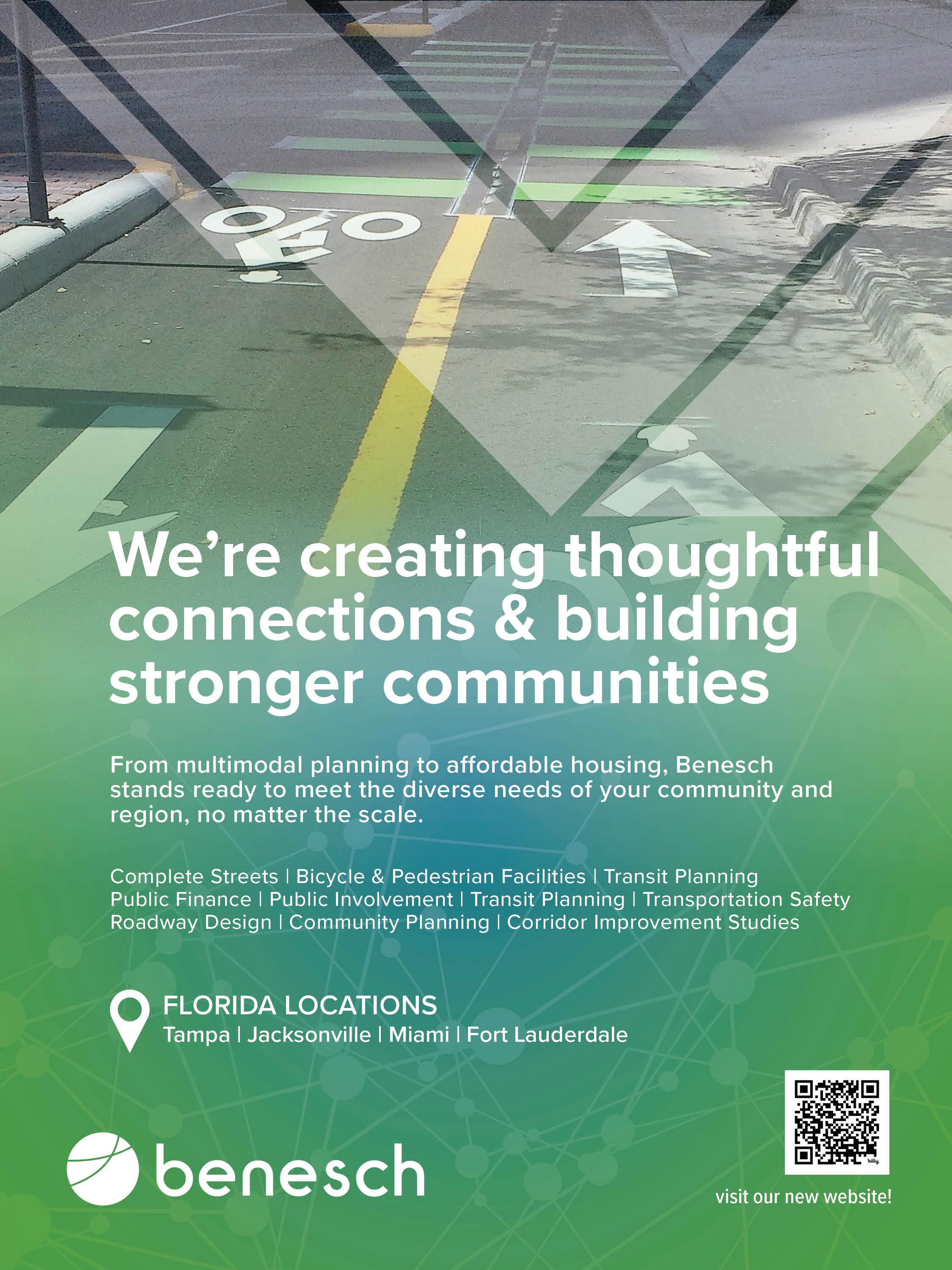
Ali Palmer and Macy Falcon, AICP

The Town of Lantana, Fla., has taken a proactive step toward building a more resilient future with the development of its Post Disaster Redevelopment Plan (PDRP). Funded through a Community Planning Technical Assistance Grant from the Florida Department of Economic Opportunity, the plan serves as a comprehensive guide for restoring infrastructure, revitalizing the economy, and supporting vulnerable populations in the aftermath of a disaster.
A key strength of the plan is its emphasis on stakeholder engagement. Through surveys and interviews with residents, local officials, and community organizations, Lantana identified pressing concerns such as property damage, communication gaps, and access to emergency resources.
These insights informed the plan’s focus areas: community, housing, economic development, infrastructure, and environment.
The PDRP outlines a strategic framework for both shortterm recovery and long-term redevelopment. Short-term efforts focus on restoring safety and essential services, such as clearing debris, reestablishing power, and providing access to food, water, and healthcare. Long-term strategies aim to rebuild stronger, more hazard-resilient infrastructure, housing, and community systems.
A key strength of the plan is its emphasis on stakeholder engagement. Through surveys and interviews with residents, local officials, and community organizations, Lantana identified pressing concerns such as property damage, communication gaps, and access to emergency resources. These insights informed the plan’s focus areas: community, housing, economic development, infrastructure, and environment.
The community plan highlights the needs of vulnerable populations, including seniors, disabled individuals, and non-English speakers. Recommendations include developing a robust outreach strategy, establishing security checkpoints, and forming a healthcare providers coalition to ensure continuity of care during emergencies.
Housing resilience is another cornerstone of the PDRP. With over 30 percent of residential units located in flood-prone areas and 86 percent built before modern building codes, the plan proposes updating zoning regulations, promoting
flood mitigation programs, and creating a rapid permitting process for post-disaster rebuilding. Temporary housing strategies are also detailed, ranging from emergency shelters to long-term rental solutions.
Economic recovery is addressed through support for small businesses, many of which struggle to reopen after disasters. The plan recommends forming an economic redevelopment subcommittee, securing temporary office space, and offering incentives to attract new businesses.
Workforce transportation and digital infrastructure are also prioritized to ensure economic continuity.
Infrastructure improvements include hardening critical facilities like the Town Hall and water treatment plant against high winds and flooding. The plan encourages undergrounding utilities, elevating roads, and enhancing stormwater systems. A detailed debris management strategy ensures efficient cleanup and coordination with county and state agencies.
Environmental resilience is woven throughout the plan, with a focus on protecting wetlands, managing wellfield zones, and expanding the urban tree canopy. The town aims to integrate green infrastructure and low-impact development practices into future planning.
To ensure the PDRP remains relevant, Lantana will review and update the plan annually and conduct a comprehensive revision every five years. This ongoing maintenance will reflect changes in community needs, growth patterns, and available resources.
By aligning local policies with state and federal recovery frameworks, the Town of Lantana’s PDRP positions the community to not only recover from disasters but to emerge stronger, safer, and more connected than before.
Ali Palmer is an Association Planner with Kimley-Horn. She can be reached at ali.palmer@kimley-horn.com. Macy Falcon, AICP is an Associate Planner with Kimley-Horn. She can be reached a macy.falcon@kimley-horn.com
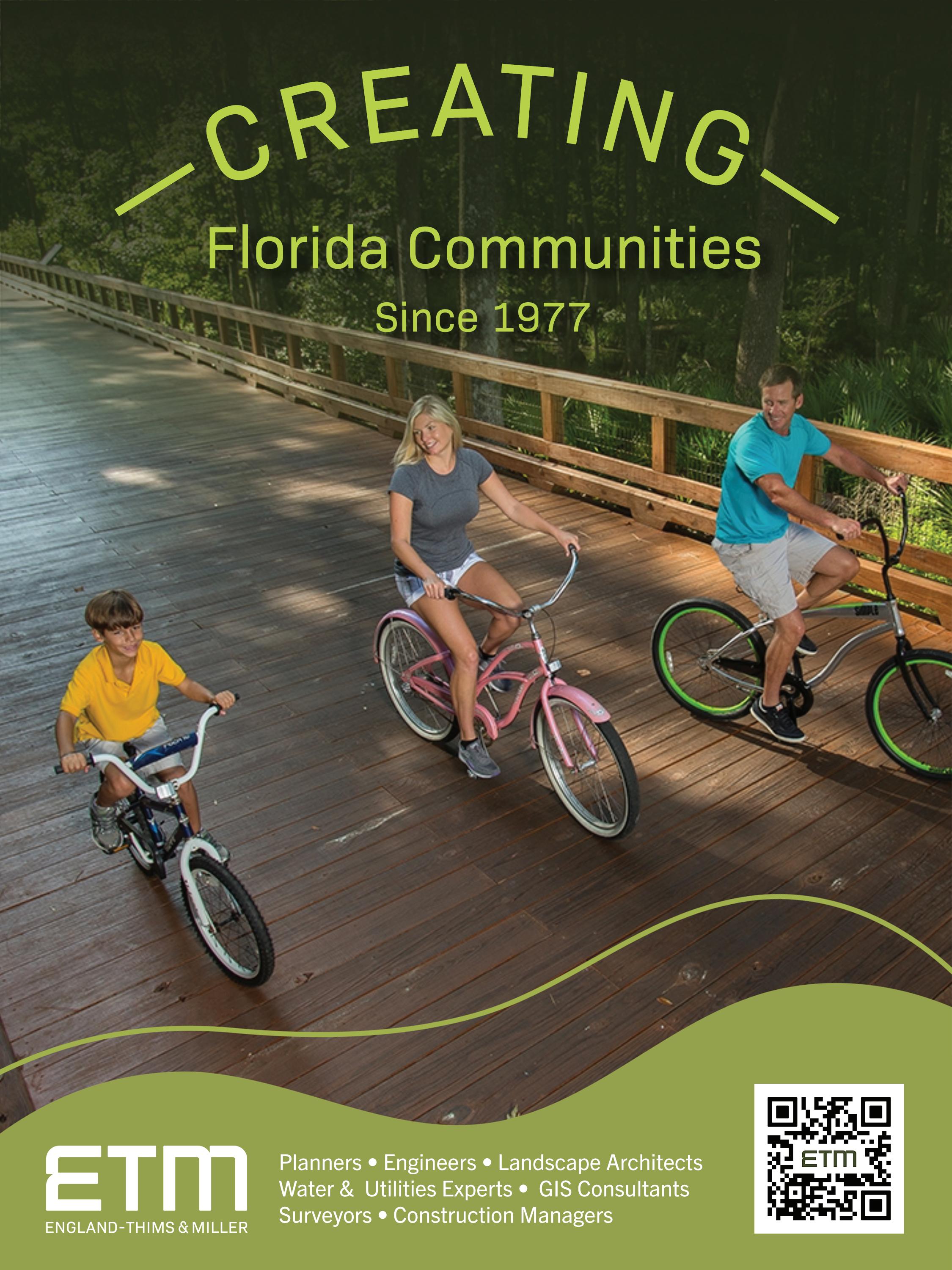
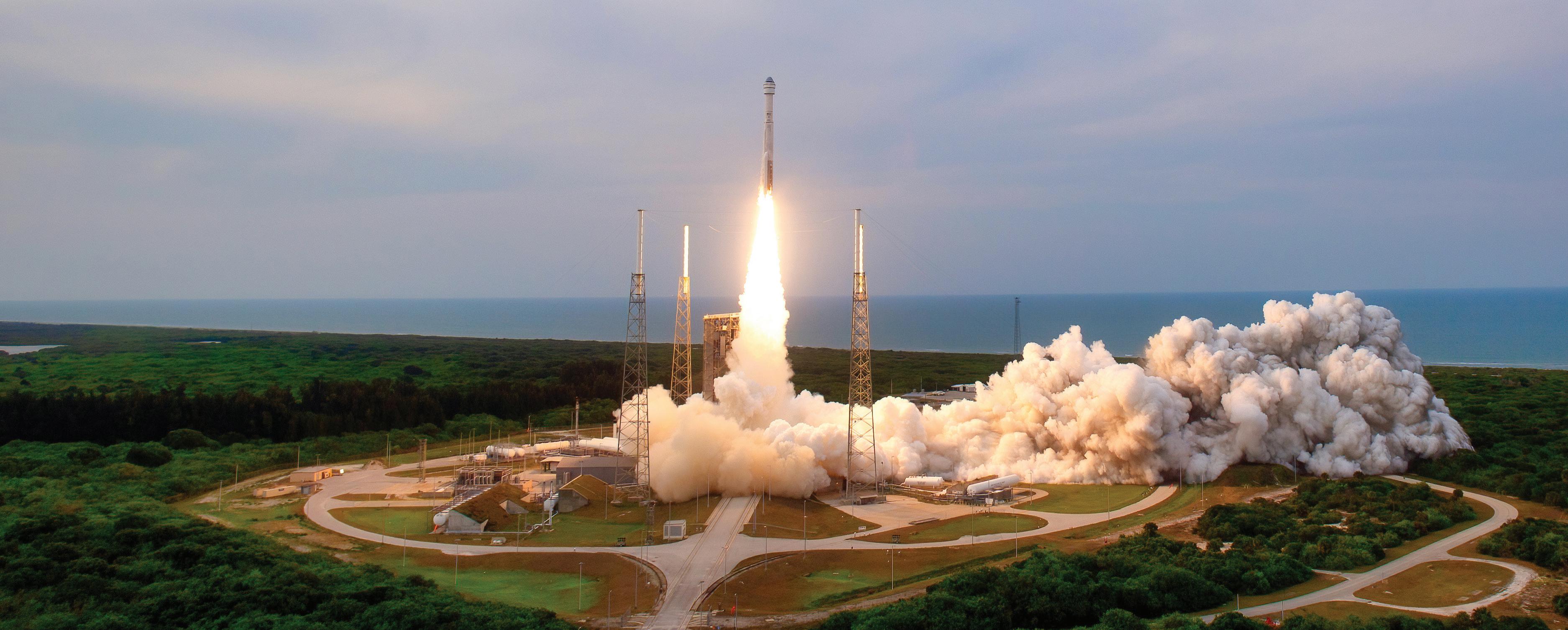
By: Kelley Klepper, AICP & Zach Eichholz
The City of Cape Canaveral has unveiled an ambitious and forward-thinking initiative to transform its historic Presidential Streets neighborhood into a model of resilience, accessibility, and community vibrancy.
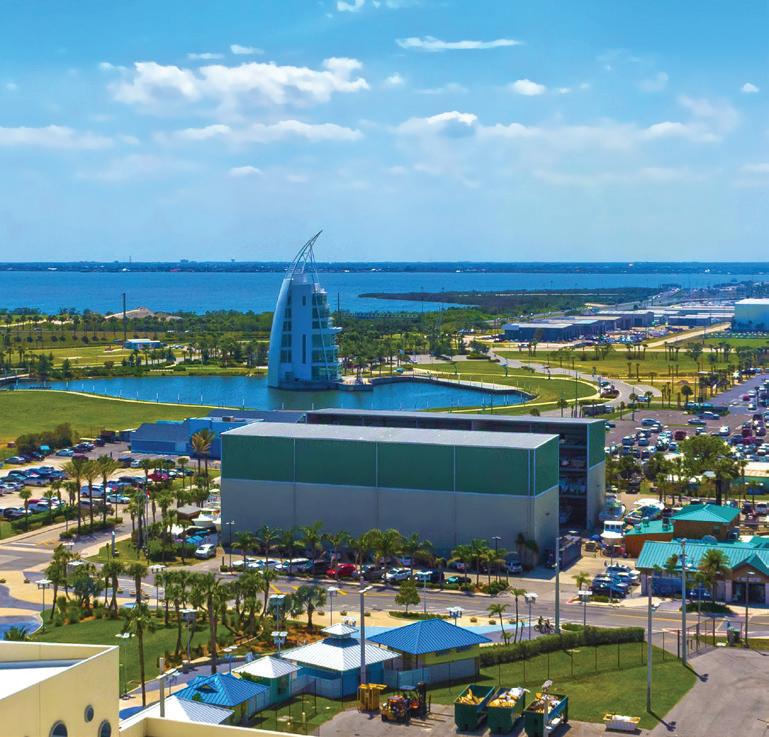
The Presidential Streets Master Plan, developed in collaboration with Kimley-Horn and Associates and shaped by extensive community input, outlines a comprehensive strategy to enhance infrastructure, improve mobility, and address environmental challenges in this core area of the city.
Spanning 256 acres and more than 13 miles of roadway, the Presidential Streets area — named after U.S. presidents from Washington to Johnson — serves as a vital link between residential neighborhoods, civic institutions, and the Atlantic coastline. The plan’s vision is rooted in three guiding principles: creating a strong sense of place, fostering an equitable and environmentally sustainable community, and building a connected, multi-modal transportation network.
To achieve these goals, the plan introduces a Framework Toolkit with eight categories of improvements: pedestrian and bicycle infrastructure, roadway enhancements, intersection upgrades, placemaking design, traffic calming, beach access improvements, stormwater management, and resiliency measures. These tools are designed to be flexible and scalable, allowing the city to implement projects as funding becomes available.
Key recommendations include widening sidewalks, adding ADA-compliant crosswalks, installing solar-powered and turtle-friendly lighting, and integrating green infrastructure such as rain gardens and bioswales. Streets like Fillmore and Poinsetta avenues are targeted for major upgrades, including oneway conversions, bike boulevards, and permeable pavement to reduce flooding.
Stormwater management is a central focus, with the plan building on previous studies and proposing infrastructure upgrades across multiple drainage basins. The city also aims to establish a Resiliency Hub and promote lowimpact development through grants and incentives for homeowners to install rain barrels, pervious driveways, and native landscaping.
Community engagement played a pivotal role in shaping the plan. Two public workshops and interactive surveys revealed residents’ top concerns: flooding, pedestrian safety, and the need for more shade trees. These insights directly

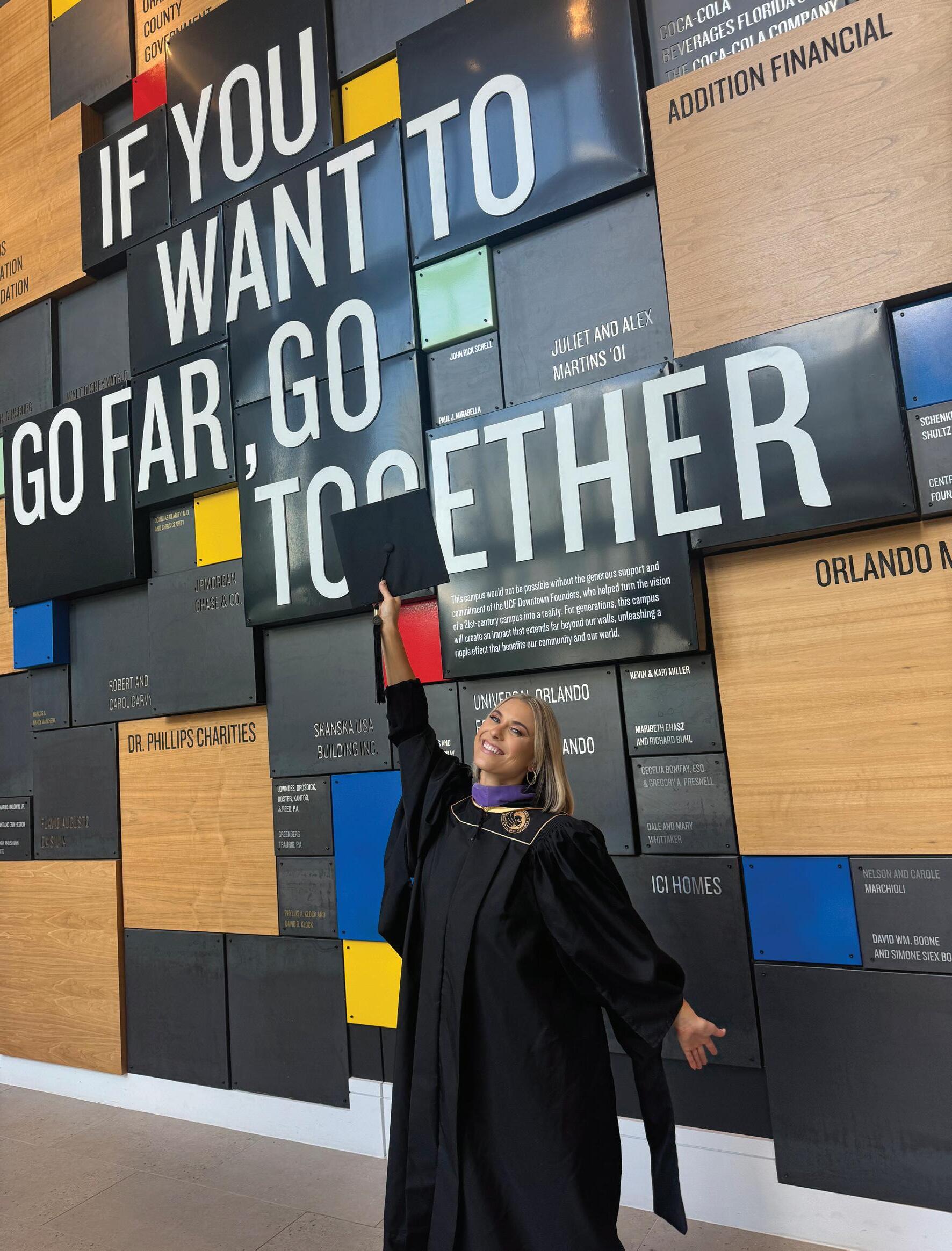
By McKenna Korzeniewski
Being a resilience planner is not just about preparing infrastructure for a future with more intense storms, extreme rainfall, and higher storm surges. Instead, it involves lessening the impacts of man-made, technological, and natural disasters for all facets of a society. This ranges from preparing local businesses to withstand turbulence and establishing routes for transporting basic needs like water; to hardening shorelines and increasing public awareness about the growing hazards and risks.
This newfound connection between urban planning and emergency management comes to an intersection called resilience planning. Resilience planning incorporates all the traditional sectors of urban planning, but with a new twist: the absolute worst-case scenario. While no one can truly predict the future, there is enough data available to support a type of planning that can mitigate the impacts of disasters—such as cyber-attacks, hurricanes, mass ca-
continued from page 12
sualty incidents, and wildfires in order to protect lives and property. Geographic information systems (GIS) and scientific projections are being used around the country to develop vulnerability assessments, local mitigation strategies, and hazard identification risk assessments to support decision-making and balance risks.
Resilience planning does not stop at long-range planning. After a disaster, recovery efforts play a vital role in bringing the community back to normalcy. Developing policies and implementing actions highlighted in action plans prior to a disaster can accelerate a community’s ability to recover its environment, economy, and public well-being.
My journey in resilience planning started in an undergraduate sociology class called, “Environment and Society”. The goal of this class was to determine the human relationship with the natural world and how cities fit into that dynamic. I have spent much of my early career making an attempt to figure this out.
Through this inquisitive thinking, I began connecting the relationship with natural disasters and how society typically views them only when directly impacted. For this reason, I pursued a graduate degree from the University of Central Florida in Urban and Regional Planning, with a Graduate Certificate in Emergency Management.
My role as a resilience planner involves mitigating the natural world's impact on the built environment, and, conversely, lessening the built environment's impact on natural systems. This is more crucial than ever, as we've seen a clear increase in the frequency and severity of these events.
Mitigation through emergency management is no longer the sole solution. Adaptation strategies must be expanded into all areas of urban planning to truly build a resilient community that can withstand the increased frequency and costs of natural disasters. Adaption is not a matter of if, but when. Resilience planners have a key role to play in bridging this gap. Communities with robust building codes, strong green-grey infrastructure, and well-prepared social programs will have a better ability to not only bounce back from a disaster quicker than others but bounce forward while also giving communities the opportunity to thrive.
McKenna Korzeniewski was a Resilience Planner II at the East Coast Central Florida Regional Planning Council but now works for Freese in Austin. She can be reached at mckenna.korzeniewski@freese.com
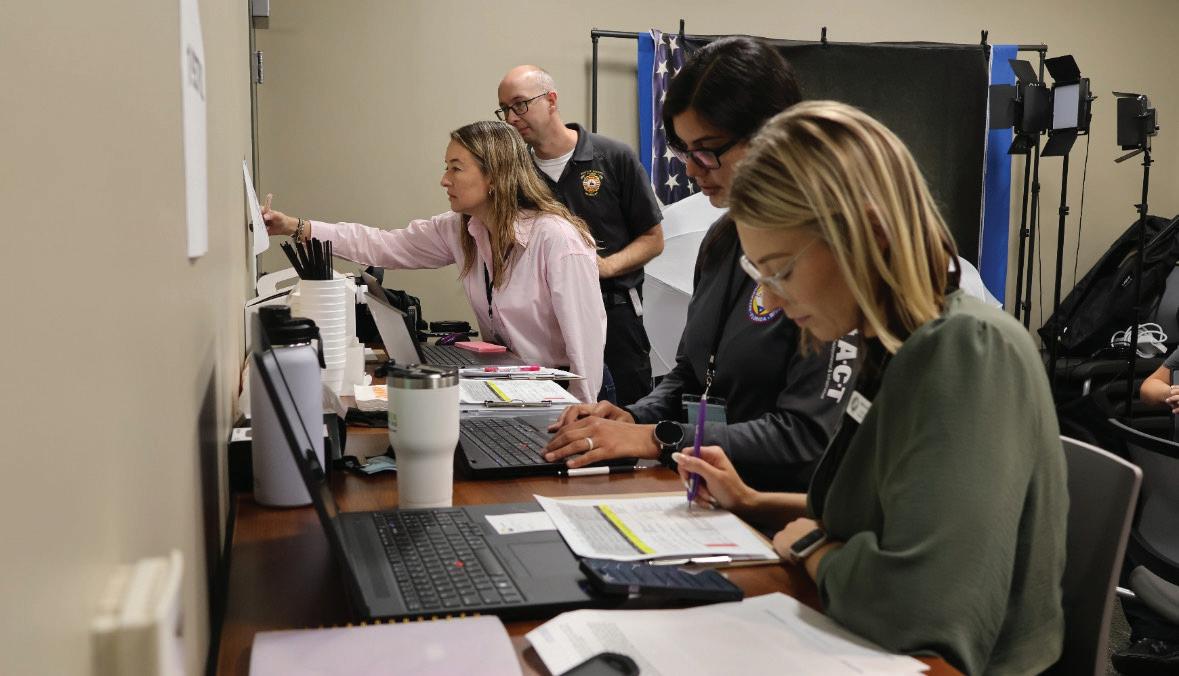
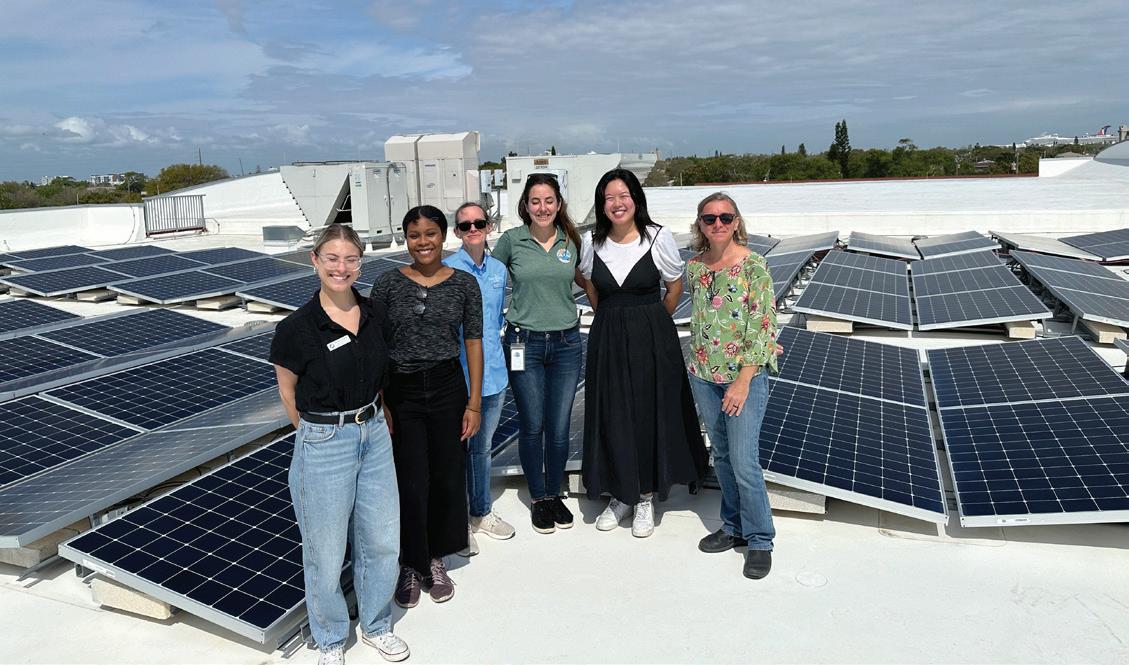
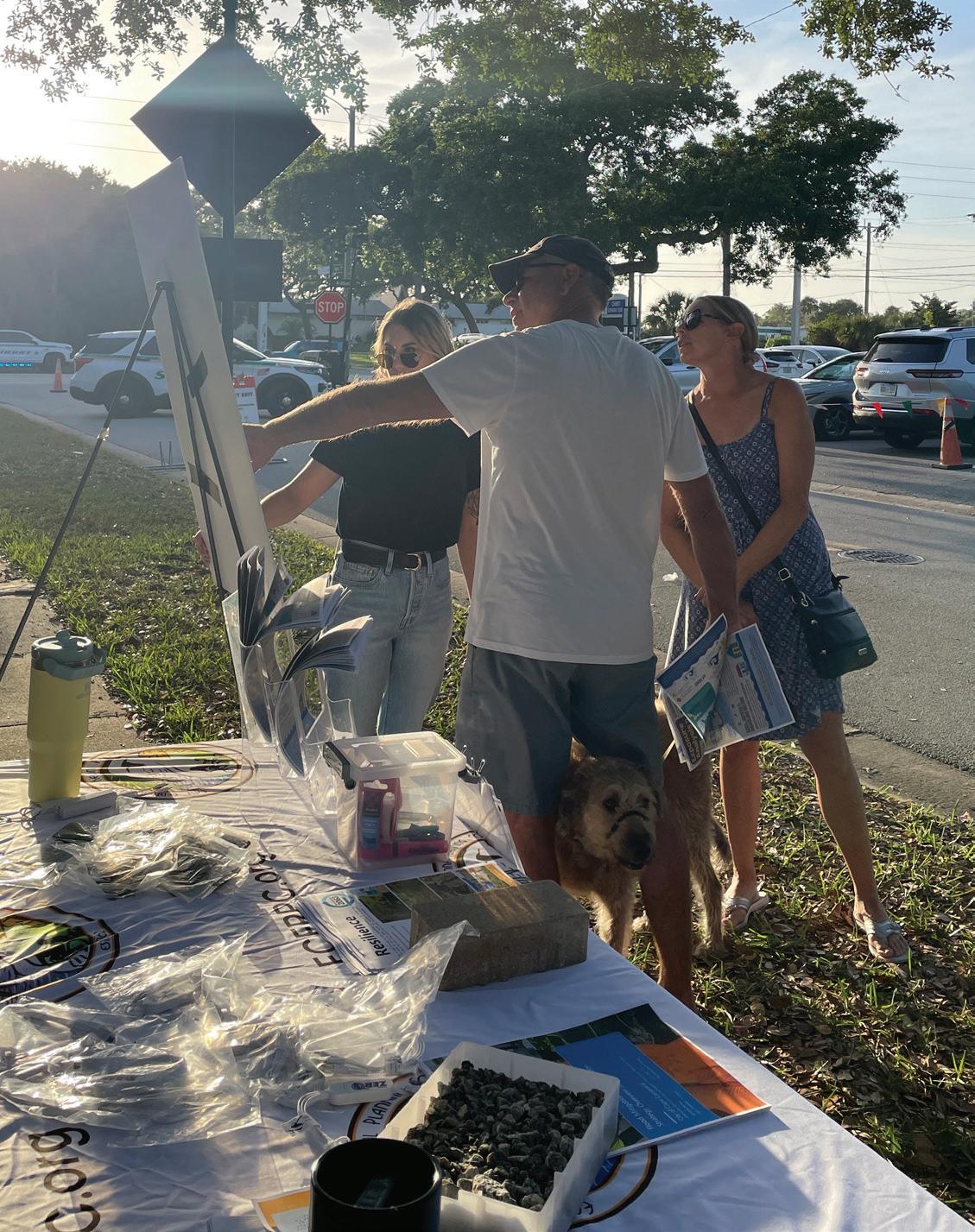
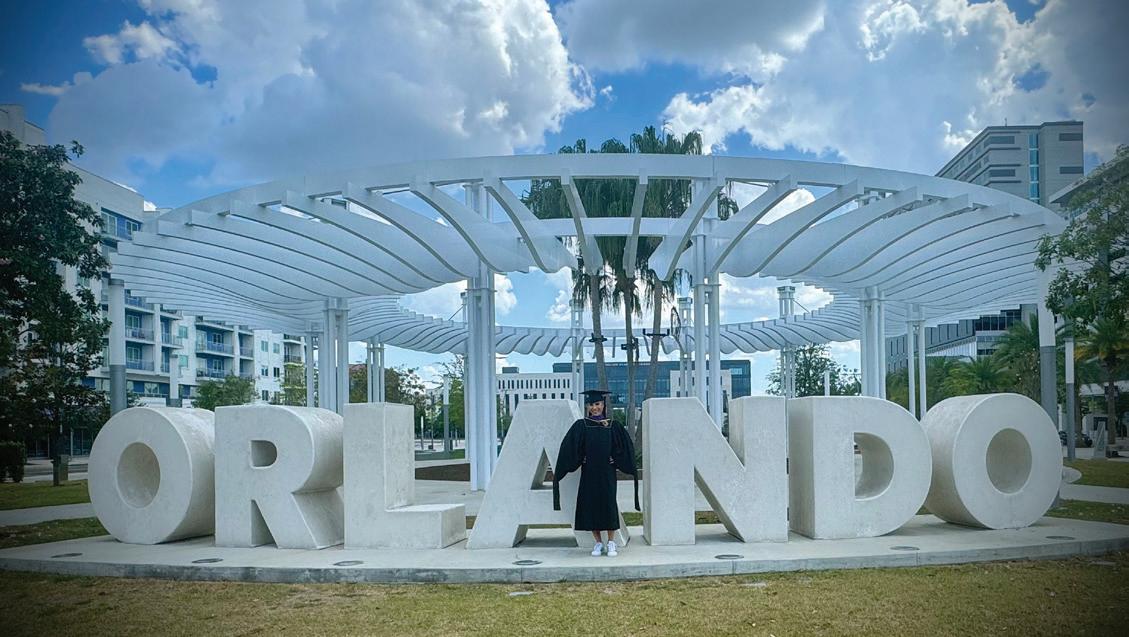
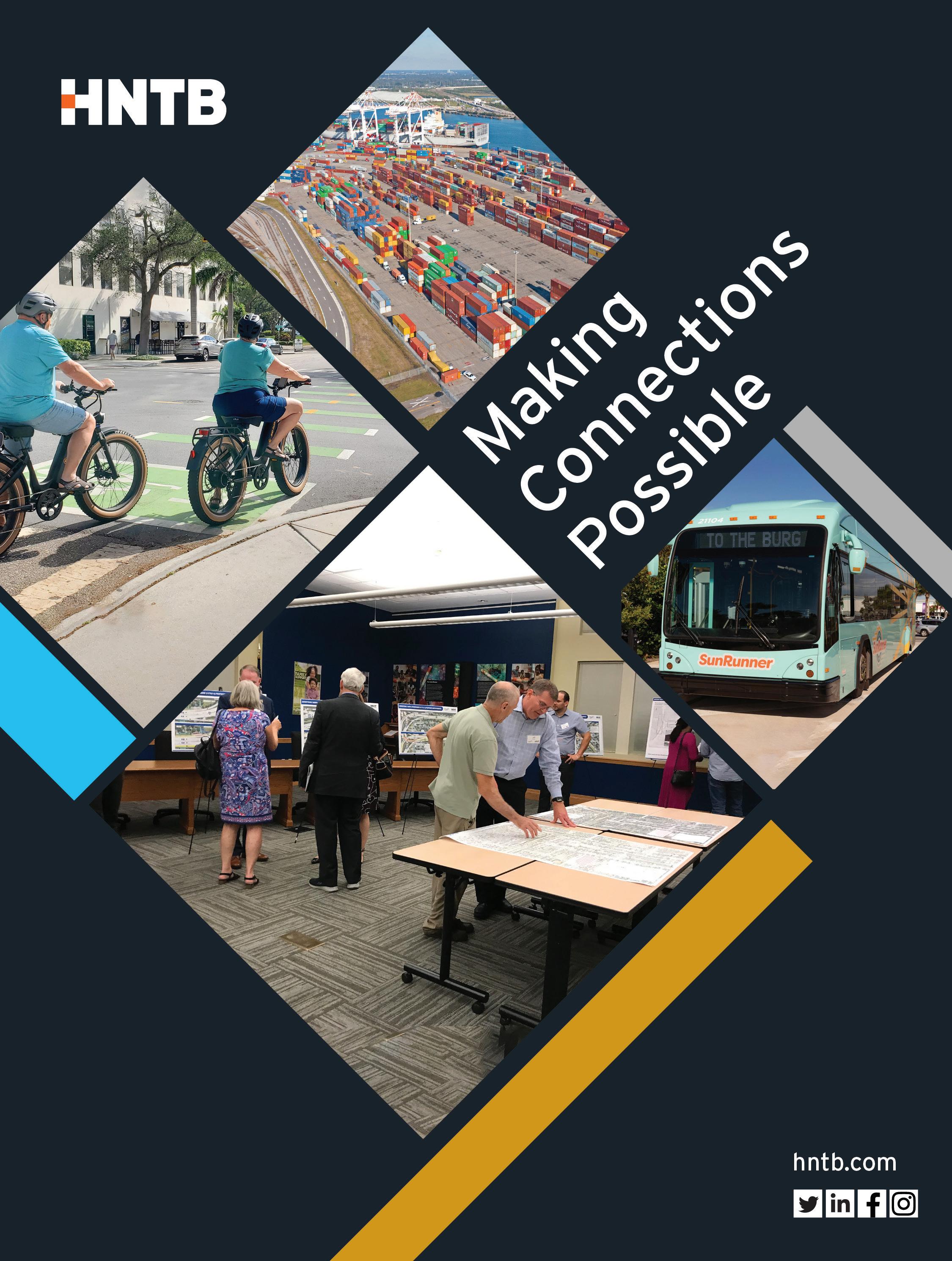
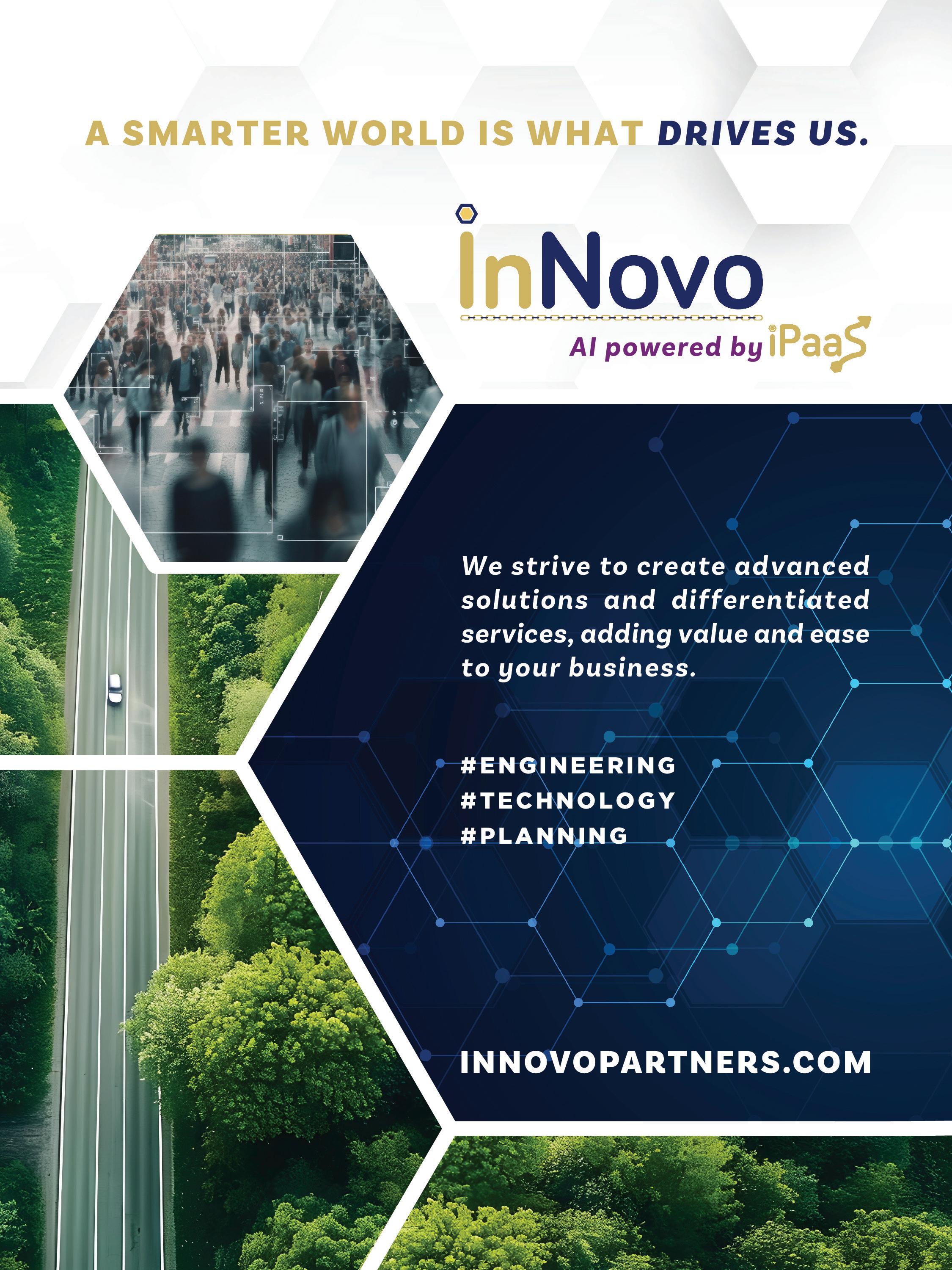
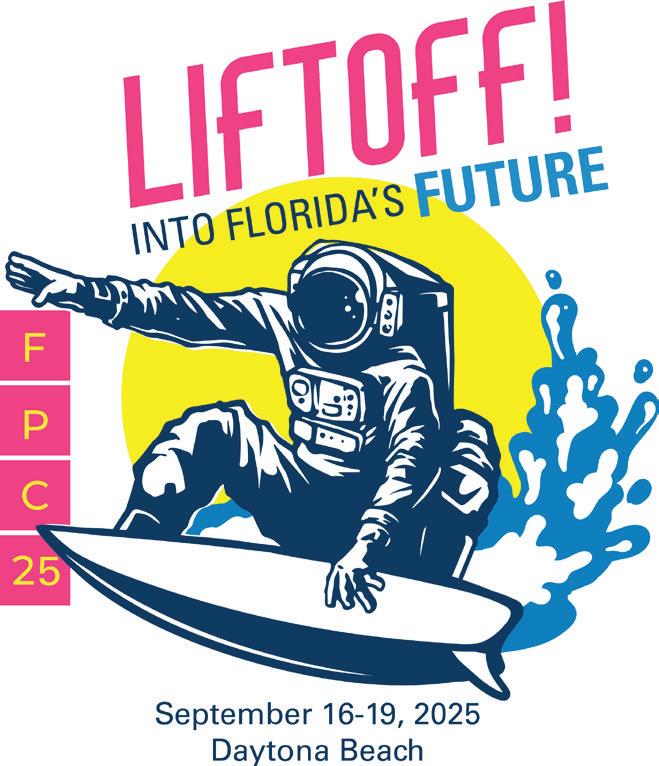
We are a little over a month away from the 2025 Florida Planning Conference in Daytona Beach. More than 650 of your colleagues have already registered … don’t get left behind as regular pricing ends on Aug. 15!
We’re expecting 850-900 planning professionals from across Florida, and spots for workshops, mobile tours, and hotel rooms are filling up fast.
Day One kicks off on Tuesday with a full-day mobile tour to Kennedy Space Center, along with a variety of all-day and two-hour workshops and sessions. Don’t delay — secure your spot today and be part of Florida’s premier planning event!
Review the full conference program
�� PLANNERS + PUPPIES IS BACK.
Looking for a little puppy (or kitty) love between sessions? We’ve got you covered! We are once again teaming up with the Halifax Humane Society for a heartwarming Meet & Greet featuring adorable, adoptable dogs and cats. Come cuddle all the fur babies on Wednesday and Thursday while taking a break from the conference buzz!
�� WRAP UP FPC25 WITH A BEACHSIDE BONFIRE!!
Wind down from a packed conference week and soak in the coastal vibes at our Beach Bonfire on Daytona Beach! Join fellow planners for a relaxed evening of ocean views, casual bites, and great conversation. It’s the perfect way to celebrate the close of FPC25—don’t miss it! We'll have S'more kits for everyone!
�� BOOTH PARADE: SURFIN’ THRU SPACE!
Get ready to blast off into a galaxy of creativity at this year’s Booth Parade – where the Space Coast meets surf culture in the ultimate planning showdown! We have tasked our Sponsors and Exhibitors to embrace our far out theme and you get to vote for your fave!
�� RUBBER DUCK HUNT
Nope, your eyes aren’t playing tricks on you—rubber duckies of all styles will be popping up across the conference space again this year! Our team will be hiding a limited number of ducks each day in unexpected places. Find one, get a prize. continued on page 18
CALLING ALL COMMISSIONERS: A PLANNING OFFICIALS TRAINING JUST FOR YOU!
We’re excited to once again host the Planning Officials Training Workshop at FPC—a full-day, in-depth session led by some of Florida’s top planning experts.
Whether you're an appointed advisory board member, serve on a utilities or historic preservation board, are a city clerk, or work in local government, this workshop is designed to strengthen your understanding of:
✅ Local planning and zoning fundamentals
✅ Land use law and legal frameworks
✅ Future planning trends and best practices
✅ Effective public engagement strategies
✅ Ethics of the planning practice
All backgrounds and positions are welcome—no prior experience in planning is required. This is a valuable opportunity to grow your knowledge and contribute more effectively to your community.
�� Download this flier and share it with colleagues or local officials who would benefit from this training.
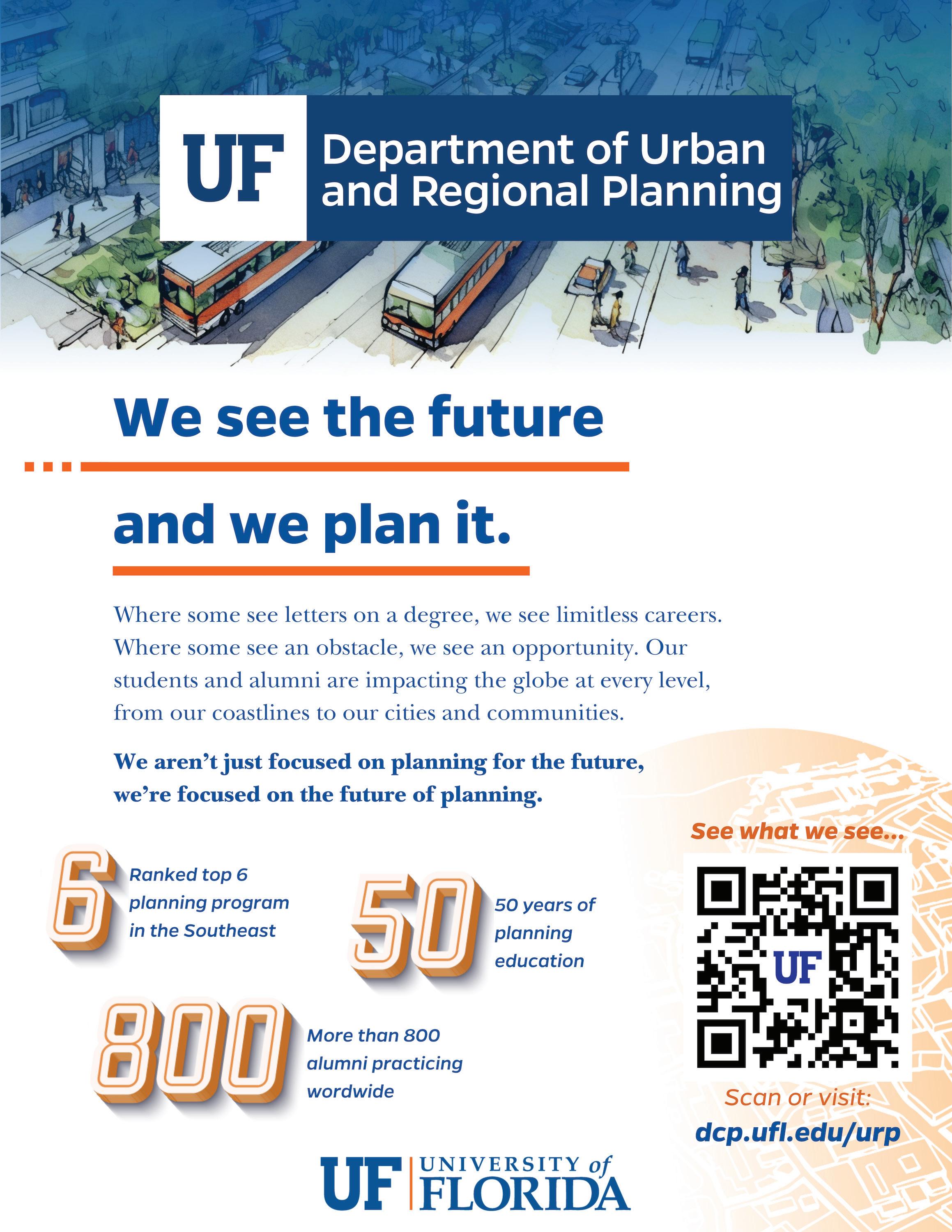
[FPC25] CONFERENCE
continued from page 16
Step outside the session rooms and into Florida’s vibrant communities with our expertly curated Mobile Tours! From historic neighborhoods to cutting-edge transit systems, these immersive experiences bring planning to life—up close and on the ground (or space or water or rail).
Whether you’re interested in coastal resilience, urban design, affordable housing, or innovative redevelopment, there’s a tour that puts you right in the action.
• See real projects shaping Florida’s future
• Engage with local experts and community stakeholders
• Get inspired by success stories and lessons learned in the field
• Network with fellow planners in a dynamic, hands-on setting
TUESDAY
Check out the full lineup below and reserve your tour today: View Mobile Tours
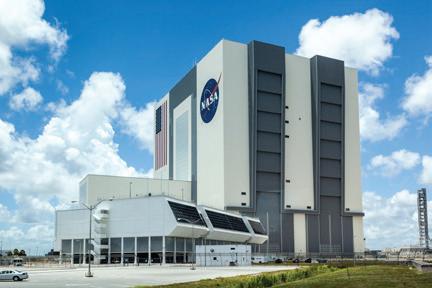
This combined tour of the Kennedy Space Center (KSC) and Port Canaveral will focus on the integration of space exploration, logistics, infrastructure, and future urban development in a rapidly evolving region. The tour will delve into the historical, technological, and economic impacts of these two vital sites on both the local and global stages. Attendees will have a chance to see a portion of KSC’s 140,000 acres and learn how Space Florida is supporting the development in conjunction with Port Canaveral, the world’s second largest cruise port.
By the end of the tour, planners will have a comprehensive understanding of how space exploration, port logistics, and urban development intersect in the Space Coast region of Florida. The focus on infrastructure, sustainability, economic growth, and the future vision for these areas will provide valuable insight for any professional involved in large-scale planning and development projects.
wednesday
BIKE TRAILS AND TRANSIT ORIENTED DEVELOPMENT (HALF DAY)
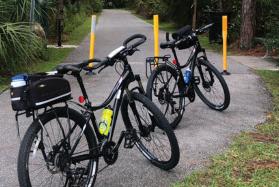
Start your morning with a bike ride from the beautiful City of Sanford, a newly recognized Trail Town by the FDEP Office of Greenways and Trails, then travel the south side of Lake Monroe along a newly completed Lake Monroe Loop trail. The tour will head north over the St. Johns River to Lake Monroe Park, learning about the history and connectivity to Volusia County and another beautiful trail town, City of Debary.
Attendees will learn from planners and experienced cyclists how these wonderful trails make up a critical piece of the Coast to Coast Trail and how these communities worked together to make a seamless transition between one trail to the other.
continued on page 20
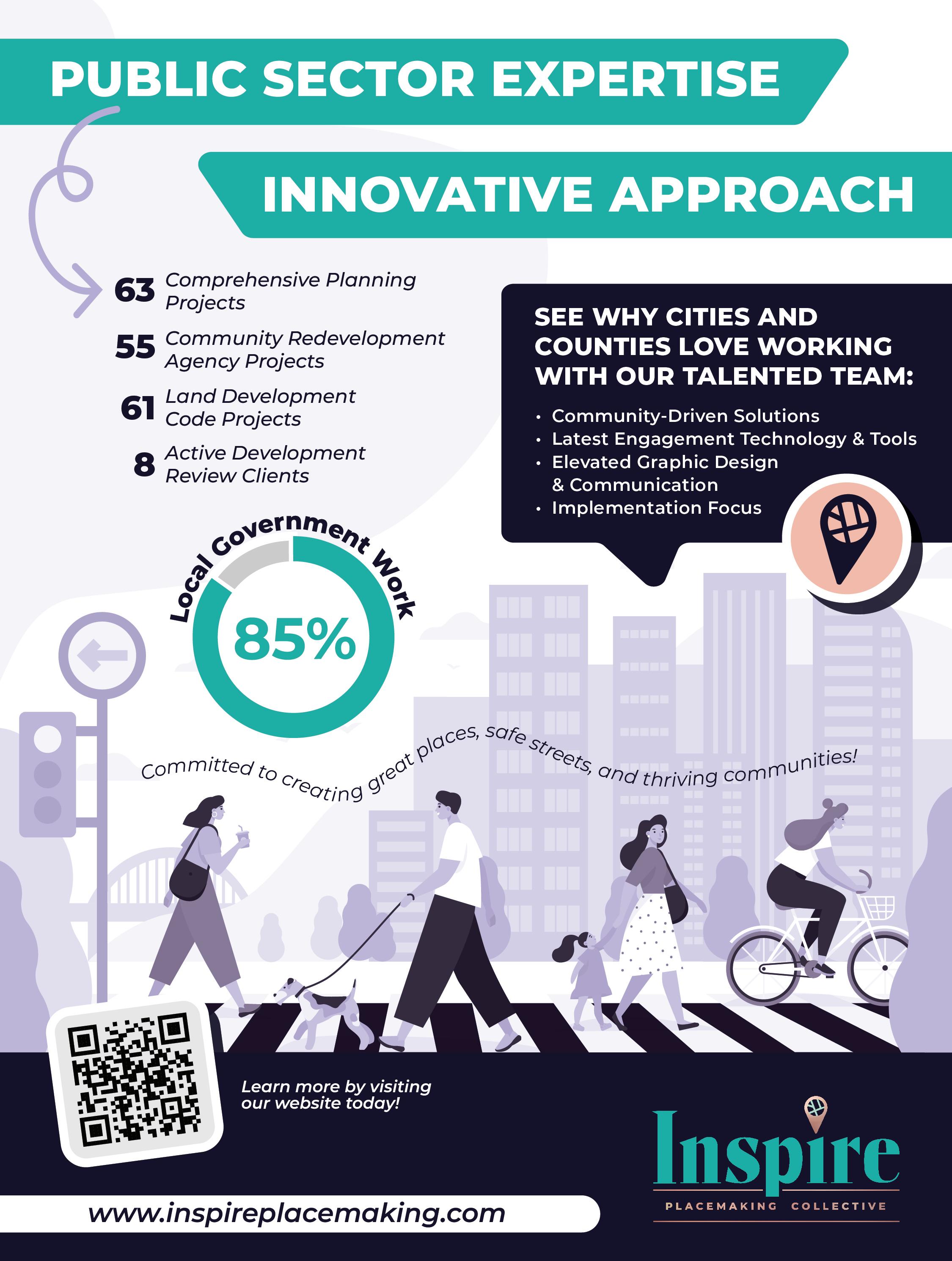
continued from page 18
Come explore downtown revitalization in action as we tour MainStreet DeLand, where you’ll learn how the DeLand Planning Department, Community Redevelopment Agency, and Main Street DeLand work together to drive economic growth, historic preservation, and smart redevelopment. Explore how strategic planning, zoning policies, tax increment financing, and public-private partnerships have transformed this district into a thriving, walkable downtown where businesses flourish and the community thrives.
Along the way, you’ll visit beautifully restored historic buildings, experience vibrant public spaces and streetscape enhancements, and hear from experts who have guided DeLand’s transformation. Whether you’re tackling similar challenges in your own community or looking for innovative ideas, this tour offers actionable insights into balancing preservation with progress.
Wear your walking shoes and get inspired for your next big project by exploring the past, present, and future of DeLand’s Main Street!

Have you ever wondered how SunRail came to be? While inaugural service began in 2014, with a recent extension north to DeLand completed in 2024, system planning was years in the making.
The tour will explore the various partnerships that were required and challenges overcome to make the vision a reality. We will also learn about recent revitalization efforts in Sanford as well as Transit Oriented Development (TOD) plans around the Deland station.
Don't miss the train ride included as a part of this tour.

Nearly 150 years have passed since the Ponce De Leon Inlet (formerly called Mosquito) Lighthouse was initially activated in 1887 and the fishing resort known as the Pacetti Hotel first opened its doors for business.
Discover the rich and fascinating history of these two historic properties and the small coastal fishing village that developed around them. Learn and see how the multi-agency dune and shoreline restoration effort is taking shape to address resiliency in this Volusia beachside community.

Take a tour on the wild side!
Visit two critical environmental conservation programs in Volusia County, first stopping at the Lyonia Environmental Center to learn how the Volusia County School Board, Volusia County Government and other partners were able to conserve critical habitat (scrub jay) as well as create amenities for the public.
Attendees will then visit the D Ranch Preserve, the newest 400 acres protected by Conservation Florida. Learn of their plans to improve the once cattle ranch into a key conservation piece in southwest Volusia County. Hear about Volusia's Forever Program which was the genesis for Florida Forever.
CELEBRATING THE PAST, IMAGINING THE FUTURE: HOW TWO UNIVERSITIES IMPACT DAYTONA BEACH (HALF DAY) Daytona Beach is rich in history and poised to be an epicenter of aerospace innovation!
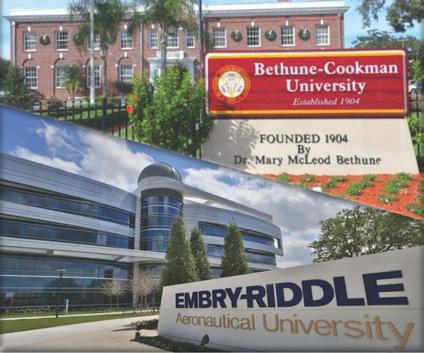
Join us as we celebrate Mary McCleod Bethune, founder of Daytona Beach’s historic black university, Bethune-Cookman University. As a cherished civil rights activist, educator, humanitarian, and personal friend and advisor to President Franklin and Eleanor Roosevelt, listen to how local leaders pushed for her statuary to be placed in the U.S. Capitol Building. See the exact replica at the $14M Riverfront Esplanade where we learn about the public private partnership and redevelopment of Daytona’s downtown park.
Then, we turn our imaginations to a future where flying cars are commonplace! This idea of urban air mobility (UAM) has garnered much attention as another mode of transportation. Come visit Embry-Riddle Aeronautical University and its MicaPlex Research Center where students and professors are working together to transform the urban landscape as UAM becomes a reality.
continued on page 22

continued from page 20

Change your community and discover how affordable and transitional housing is being provided through adaptive reuse and public-private partnerships. This tour will provide insight into the complexities of planning and funding transitional housing that supports underserved populations, families, unaccompanied youth and veterans.
Attendees will visit two housing developments, Hope Place and Barracks of Hope, offering an inside look at how these initiatives came to life and meet the evolving needs of the community.
Learn about the challenges and successes of repurposing existing school and church structures to create stable, supportive environments while navigating zoning, funding, and stakeholder collaboration. Tour participants will leave with fresh strategies and inspiration for championing similar ventures in your own community.
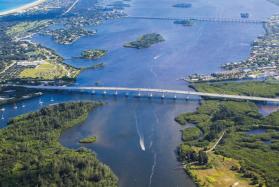
The Marine Discovery Center in New Smyrna Beach was founded in the mid-2000s as the result of a public high school closure whose land included a deed restriction that the property revert back to the state.
Located on the intracoastal, this facility and organization has become a dominant force in community engaged coastal ecology. This staff guided coastal ecology tour showcases the Indian River Lagoon and efforts underway to make our shorelines resilient. Includes a 45-minute land walking tour of the 22-acre property, history, restoration efforts and future vision and two-hour boat tour.
(BRISK WALK – 3+ MILES)
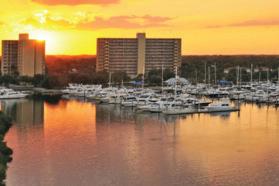
To get your day started, take in the beauty and history of the Halifax River and Daytona Beach on this fast-paced walking tour. We will start at the conference hotel, discuss the development history of the area while we walk along Main Street to the bridge over the river.
After enjoying the views from the bridge, we will wander to the Riverfront Esplanade to talk about how a private/ public partnership can be successful. After enjoying the river views from the Esplanade, we will proceed over the beautiful Broadway Bridge and back to the conference hotel through the Grandview Neighborhood.
Expect this walk to be brisk and approximately 3.1 miles.
TUESDAY
Hilton Daytona Beach Oceanfront Resort
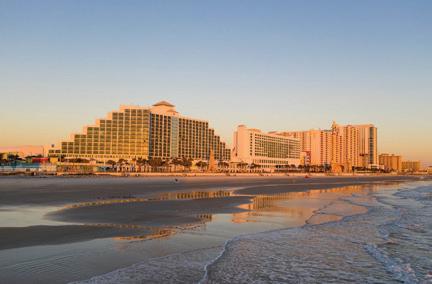
Join us as we kick off the 2025 Florida Planning Conference in style at our Opening Reception, set against the stunning backdrop of the Atlantic Ocean. Hosted at the Hilton Daytona Beach Oceanfront Resort, this evening promises a warm welcome, vibrant networking, and a taste of Space Coast charm.
Enjoy complimentary appetizers and your first beverage on us, with a cash bar available for additional refreshments. Whether you're reconnecting with colleagues or meeting new faces in the planning community, this is the perfect way to start your FPC25 experience.
Let’s raise a glass to great ideas and inspiring sessions ahead, as we liftoff into Florida’s future!
THURSDAY
Beachside Bonfire

Wrap Up FPC25 with a Beachside Bonfire!! Wind down from a packed conference week and soak in the coastal vibes at our Beach Bonfire! Join fellow planners for a relaxed evening of ocean views, casual bites, and great conversation. It’s the perfect way to celebrate the close of FPC25—don’t miss it!
Appetizers and one complimentary beverage will be provided. A cash bar will also be available for additional refreshments. Don't miss this extraordinary opportunity to connect, learn, and unwind amidst legendary Daytona Beach.


I hope you're all enjoying a wonderful summer!
Here in the chapter office, we’re entering our final push toward the 2025 Florida Planning Conference, now less than two months away.
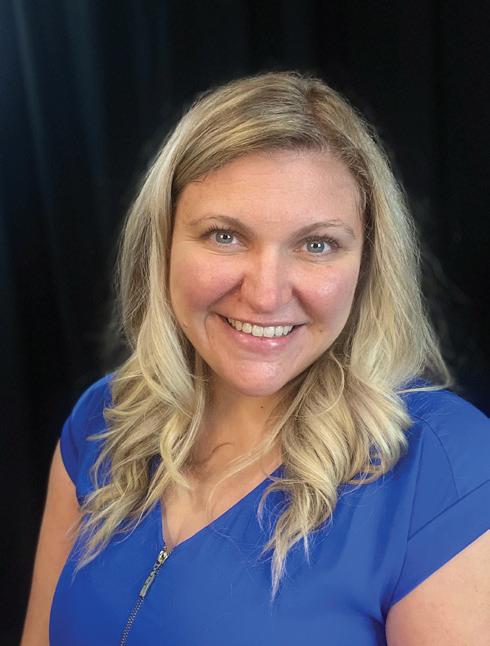
We’re thrilled to be heading back to Daytona Beach after almost a decade. We are keeping our fingers crossed that Mother Nature cooperates this time! The finishing touches are coming together for the conference including hands-on activities for attendees, Planners + Puppies, a closing-night bonfire, two onsite ADU homes to tour, and more.
I want to take a moment to offer a special thank-you to our volunteers — we simply couldn’t host the FPC without you. Volunteers are the backbone of every successful event, handling everything from registration and session support to site tours and logistical coordination. Their dedication ensures seamless operations, enhances attendee satisfaction, and helps keep costs manageable. I deeply appreciate every hour you give — your contribution is indispensable in making FPC25 a success.
In June, I had the pleasure of attending the Planning Officials Training Workshop in Lee County. It’s become an outstanding program—helping appointed and elected officials deepen their understanding of land-use law and planning fundamentals. We’ll be offering the workshop on Day One of FPC25 and again in October in the City of Newberry. If you’re interested in hosting a workshop, please fill out this form
The Executive Committee convened in Gainesville this past May to finalize our chapter’s key values and mission. We can’t wait to unveil the updated Strategic Plan, Mission, Vision, and Purpose statements at the conference … you’re going to love what we’ve developed.
Finally, I attended the National Planning Conference in Denver, where I had a fantastic opportunity to network with other chapter leaders. It was invaluable to learn how fellow APA chapters are enhancing member experience and engagement.
I want to thank you for your attention and dedication to the planning profession. Your hard work continues to enhance our communities across Florida as we move into the future. We’re making great strides together, and your support makes it all possible.

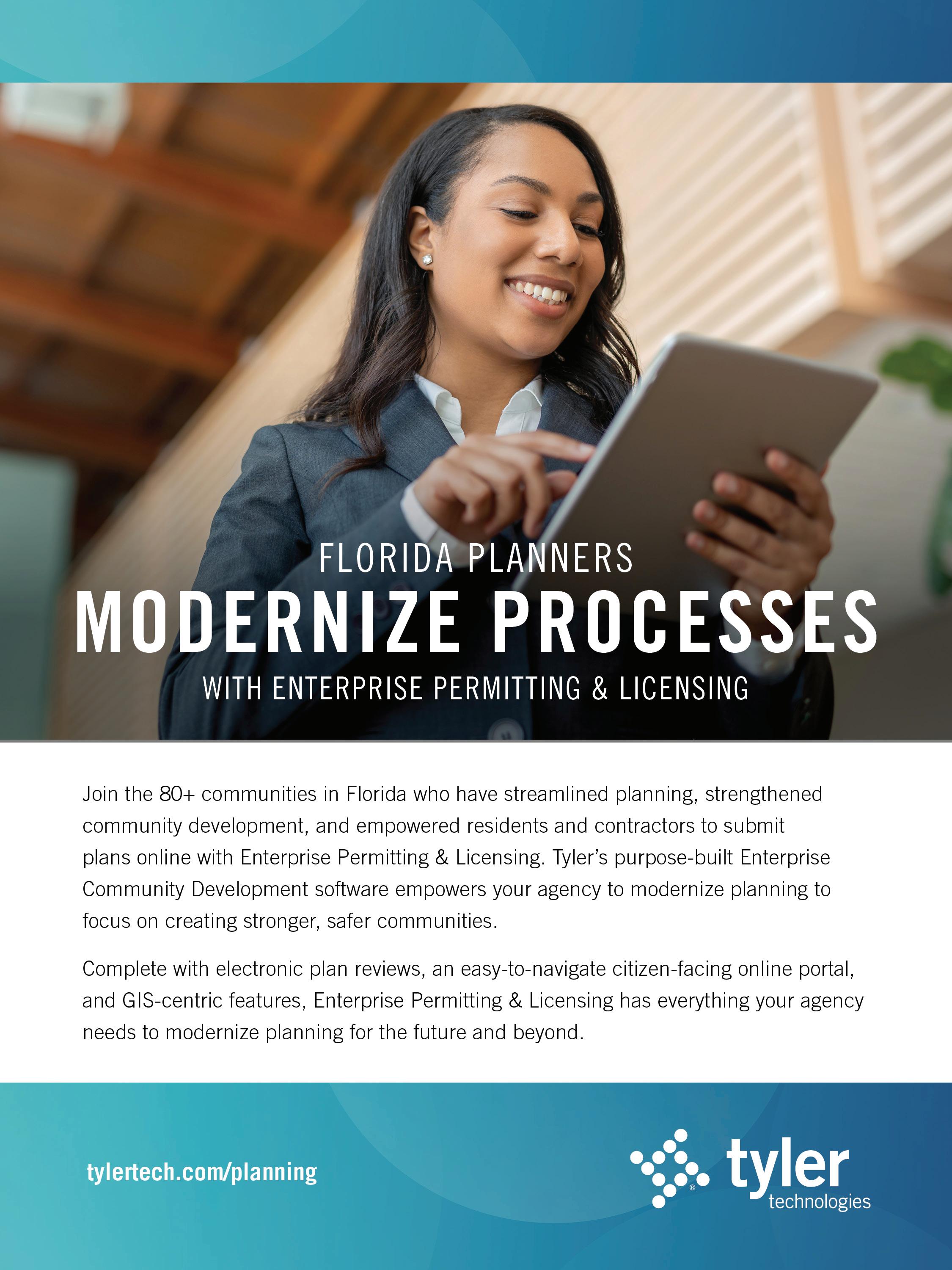
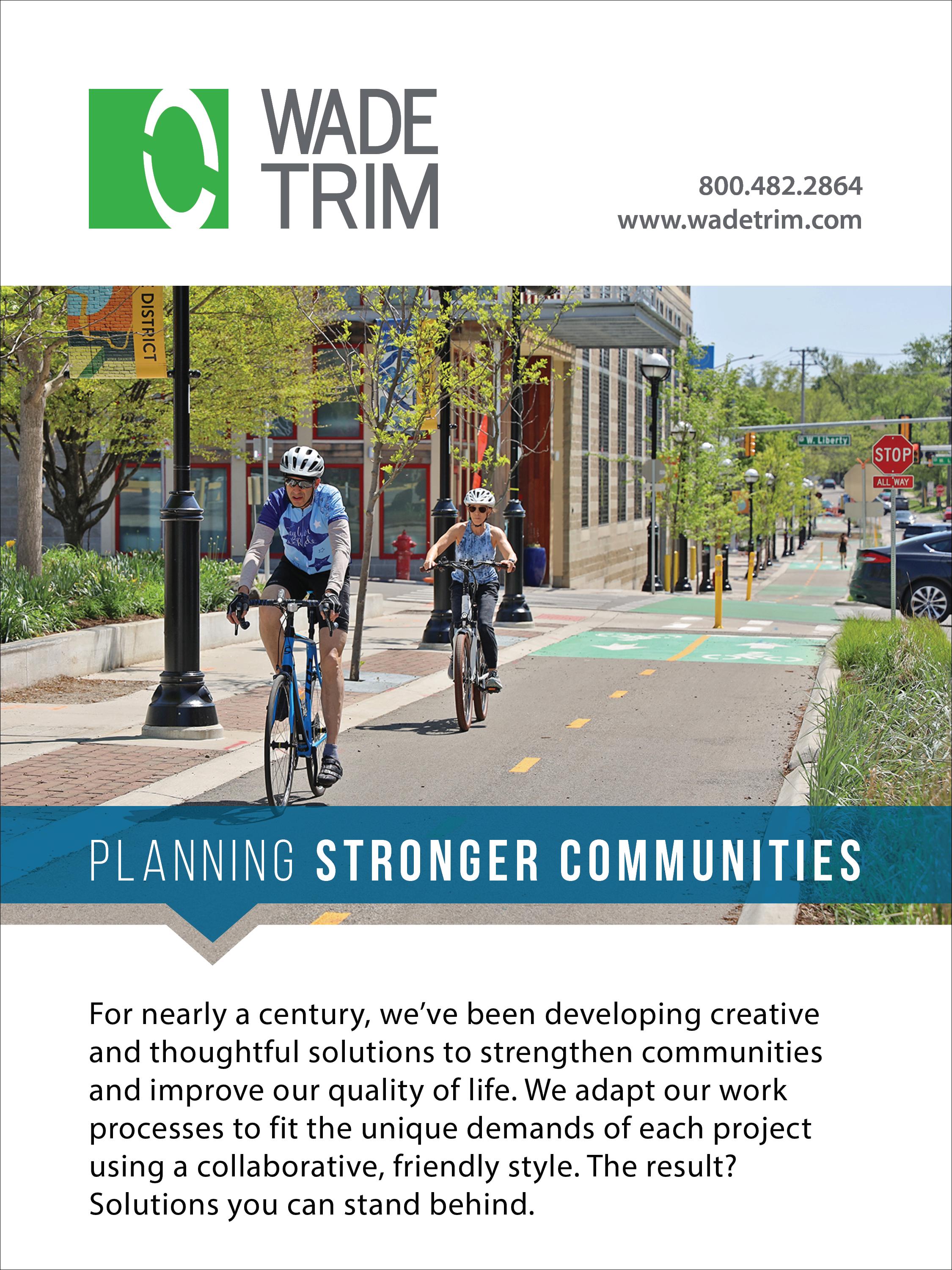
Providing solutions while enhancing mobility is at the heart of what we do. From connecting Florida communities to boosting local economies, we provide safe, efficient, and reliable systems to ensure a resilient transportation network.


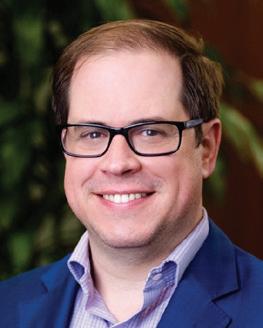
Michael Alfano, JD, MSP, MPA has been promoted to Director of City and County Planning for the Tallahassee-Leon County Planning Department. In this leadership role, he will oversee departmental operations, personnel, and budget management.
Since joining the department in 2018 as a Senior Planner, Michael has held several key positions, including Special Projects Coordinator and Administrator of Special Projects and Neighborhood & Urban Design. He holds advanced degrees both in Urban and Regional Planning and Public Administration, with a focus on policy analysis and evaluation. His expertise includes public engagement, policy development, and advocacy in local governance.

Chelsea Bakaitis, has joined the City of Newberry as a Planner and Community Redevelopment Agency Specialist. In this role, she will focus on project management and redevelopment initiatives.
Chelsea began her planning career in 2013 as a City Planner Intern in Springville, Utah. She brings a strong background in project management, regional planning, and GIS to her new position.

Sarah Bishop, recently joined Palm Beach County’s Planning, Zoning, and Building Department as a Site Planner I, within their Sustainability and Resilience section. In this role, she focuses on housing initiatives and research while serving as a project manager for land use amendments.
As a recent graduate of Florida Atlantic University with a Master of Urban and Regional Planning, Sarah is eager to apply her academic foundation to meaningful efforts that shape resilient and equitable communities. She was also honored to be named APA’s Outstanding Planning Student of the Year. This recognition shows her commitment to inclusive and impactful urban development.

Jack Butler, AICP, M.Eng., has joined InNovo Partners, LLC, as Director of Planning. He will lead the firm’s expansion into new service areas within local government and land development, while continuing to support longstanding clients such as the Florida Department of Transportation.
ments across Florida, Georgia, and Tennessee, as well as the FDOT Central Office. He is also the author of Designing Geodatabases for Transportation (Esri) and the AEGIST Guidebook (U.S. DOT), and will support the firm’s work in GIS and AI integration.
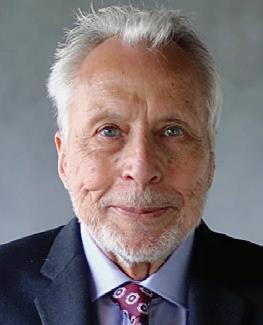
James Carras, MPA, proudly enters his 11th year as a lecturer at Harvard Kennedy School. A passionate advocate for equitable development and inclusive capital systems, James teaches two graduate-level courses: Equitable Community Development and Financing Community Economic Development.
Recently named a Faculty Affiliate at Harvard’s Bloomberg Center for Cities, he continues to contribute to strengthening city leadership and innovation in urban policy and community investment.
As a proud HKS alumnus and Fort Lauderdale community member, James remains committed to mentoring the next generation of leaders shaping communities in Florida and beyond.
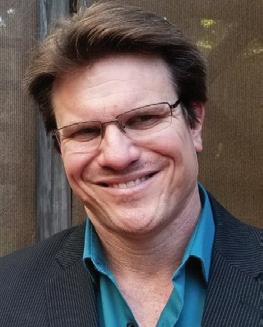
Noel Comeaux, AICP, PMP has joined The Diallo Group/Onyx as a Senior Planner, where he supports the Department of Defense in both strategic and urban planning. Noel brings extensive experience working with federal agencies, including the Defense, Homeland Security, and Transportation departments.
With a Master of Urban & Regional Planning from the University of New Orleans, Noel’s expertise spans transportation planning, social planning, and economic development, making him an asset in his new role.
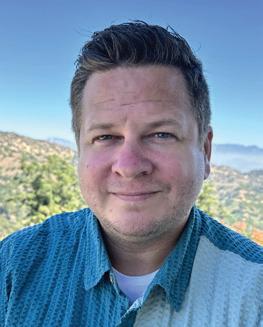
Matthew Davis, AICP has announced that Canopy Mapping Co. will now operate independently from its St. Petersburg office. This transition allows Matthew to focus on his passion: helping planners integrate emerging technologies into decision-making.
He holds a Master of Engineering in Engineering Management, certifications in GIS, cybersecurity, and project management, and is currently pursuing a Ph.D. in Public Policy. His work centers on advancing AI adoption in planning practice.
Jack brings extensive experience from senior roles in local govern- continued on page 30
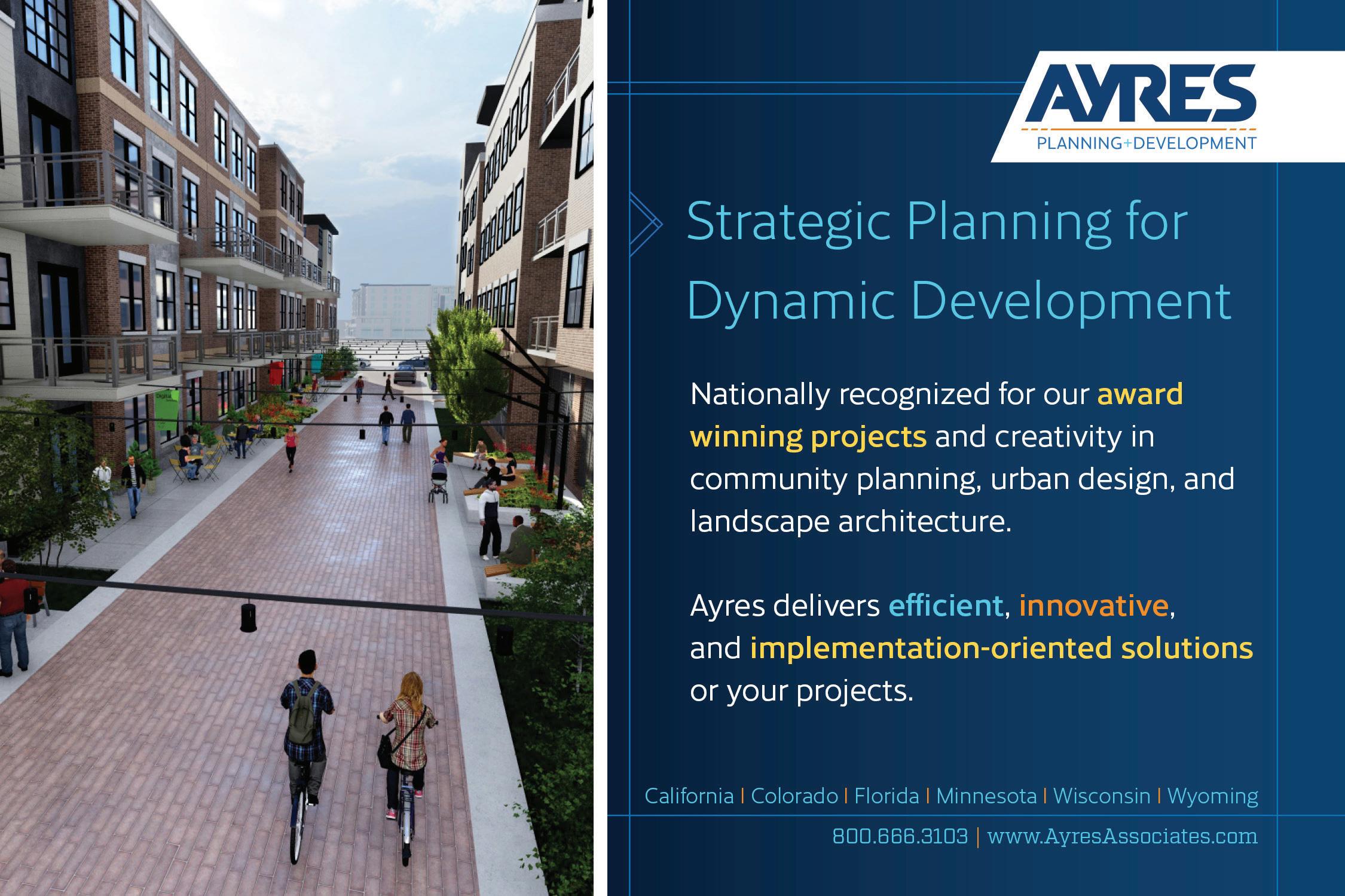
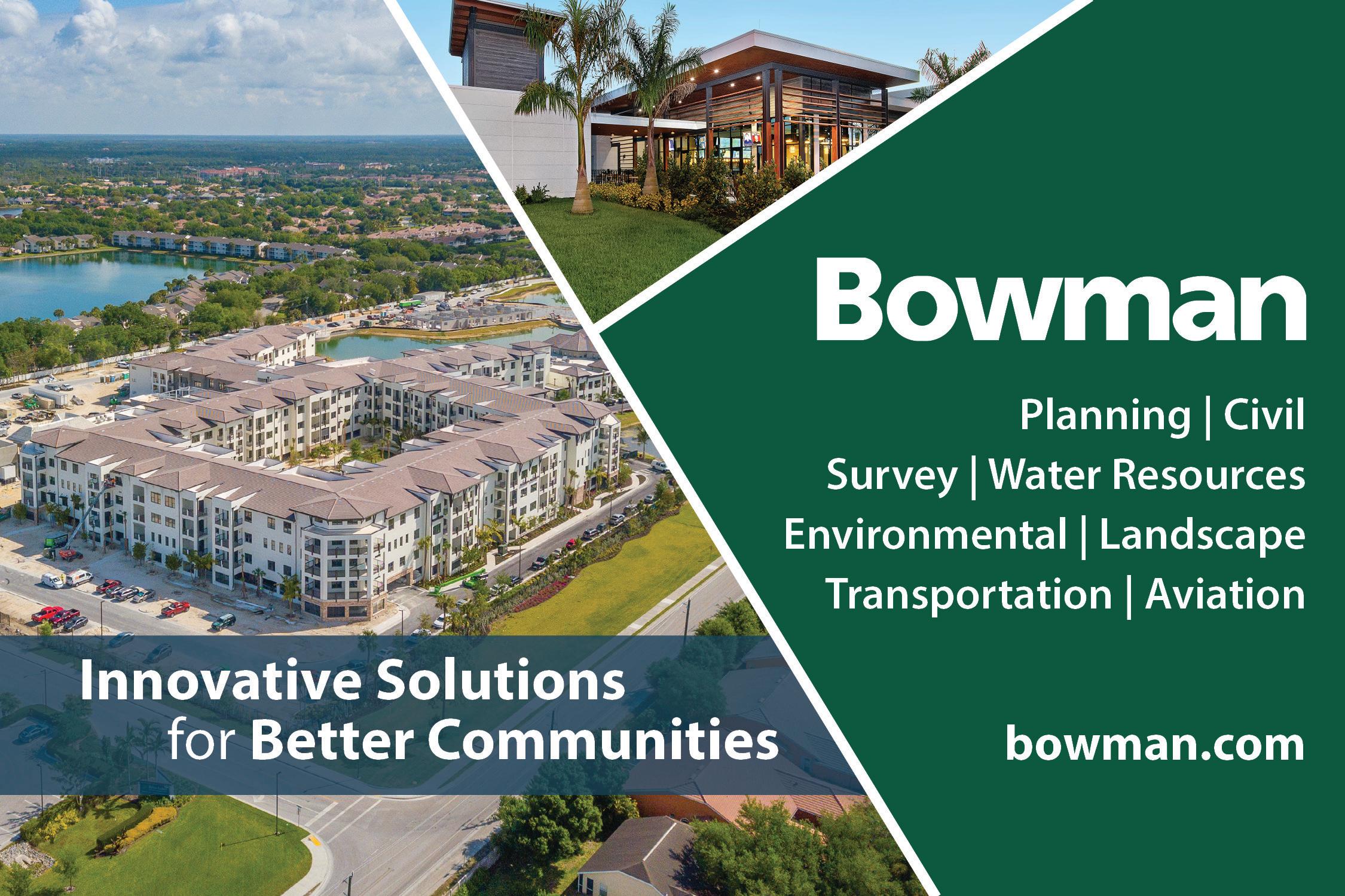
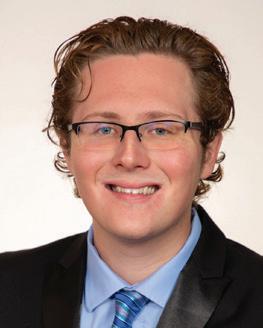
Connor Ford, AICP Candidate, has returned to his home state to serve as Senior Planner for the City of Cape Canaveral. Since stepping into the role, he has led initiatives such as the city’s Economic Development Open House and an Arbor Day celebration promoting native landscaping and urban tree canopy goals.
A recent graduate of Texas A&M University with a Master of Urban Planning, Connor brings a collaborative, forward-thinking approach to planning — supporting policy development, public outreach, and long-range strategies that shape vibrant communities.

In 2024, Brett James, AICP, LLA, finished a distinguished 34-year career with the Naval Facilities Engineering Systems Command. He now serves as Senior Planner/Landscape Architect at The Urban Collaborative, LLC, where he contributes to national and international planning projects.
Brett previously served as Director of Planning & Development for the City of Jacksonville. He holds degrees in Landscape Architecture (Oklahoma State University) and Regional & City Planning (University of Oklahoma). With deep expertise in strategic and urban planning, Brett continues to deliver innovative land and facility solutions that align public investments with long-term community needs.
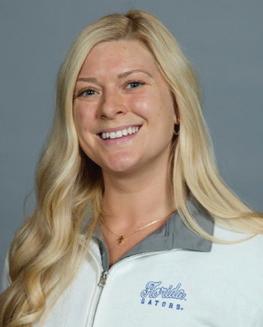
Lauren Mooney, recently had the opportunity to represent the University of Florida at the National Planning Conference this year in Denver, Colorado.
As a current master’s student at UF, studying Urban and Regional Planning, she was excited to speak about APA Florida, along with connecting with professionals and students from across the country.
Lauren has also been able to get involved with APA Florida by volunteering for the Small Towns and Rural Planning Division, learning more and supporting her current research initiatives centered on the concept of Third Places in rural communities, specifically in Levy County, Fla.

Luis Nieves-Ruiz, FAICP, was honored with the Deal of the Year Award at the Central Florida Commercial Association of Realtors Hallmark Awards for his leadership on the Beaumont P3 Redevelopment in Kissimmee.
Luis holds a Master of Regional Planning from Cornell University and serves as Director of Economic Development at the East Central Florida Regional Planning Council. His extensive service on boards and volunteer initiatives reflects his deep commitment to community development.
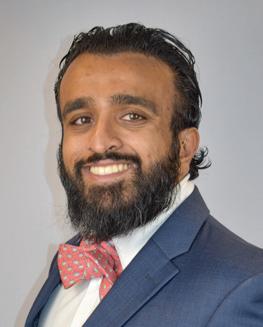
Miten Patel, AICP, PMP, CNU-A, LEED GA, was named Land Use and Planning Manager at Universal Studios. In this role, he oversees development activities related to land use, zoning, environmental compliance, and infrastructure.
Miten earned both his Bachelor of Arts in Public Administration and Master of Science in Urban and Regional Planning from the University of Central Florida, with a concentration in Sustainable Design. He was recently named to UCF’s 30 Under 30 Alumni list. His public service includes volunteer work with the National Audubon Society, National Park Service, and Seminole County Animal Services.
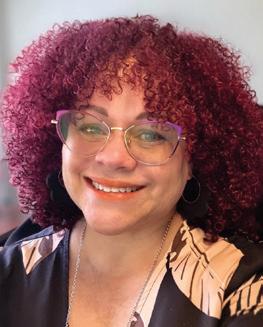
Dagmarie Segarra, has been appointed Deputy Development Services Director for Seminole County Government. She will oversee planning, zoning, code enforcement, and development review functions, as well as lead comprehensive planning and land development code updates.
Dagmarie holds a Bachelor of Business Administration and brings a strong background in GIS, project management, and urban planning.

Cara Serra, AICP, CFM, was recently promoted to Planning Director/Executive Deputy Director at the Tampa Bay Regional Planning Council. In this role, she oversees the agency’s planning activities and initiatives in relation to disaster preparedness, hazard mitigation, and regional resiliency policy.
Starting as a Comprehensive Resiliency Planner, Cara has worked her way up to her current position with the RPC for nearly seven years, bringing a strong background in land use planning and resiliency planning. She also received a Master of City and Regional Planning from the Georgia Institute of Technology.
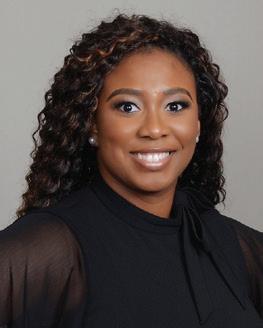
Francine Sutton, AICP, Ph.D., has joined the Bloomberg Center for Public Innovation at Johns Hopkins University as a Civic Designer. In this role, Francine brings her expertise in urban and regional planning, combined with a strong interest in user continued on page 32
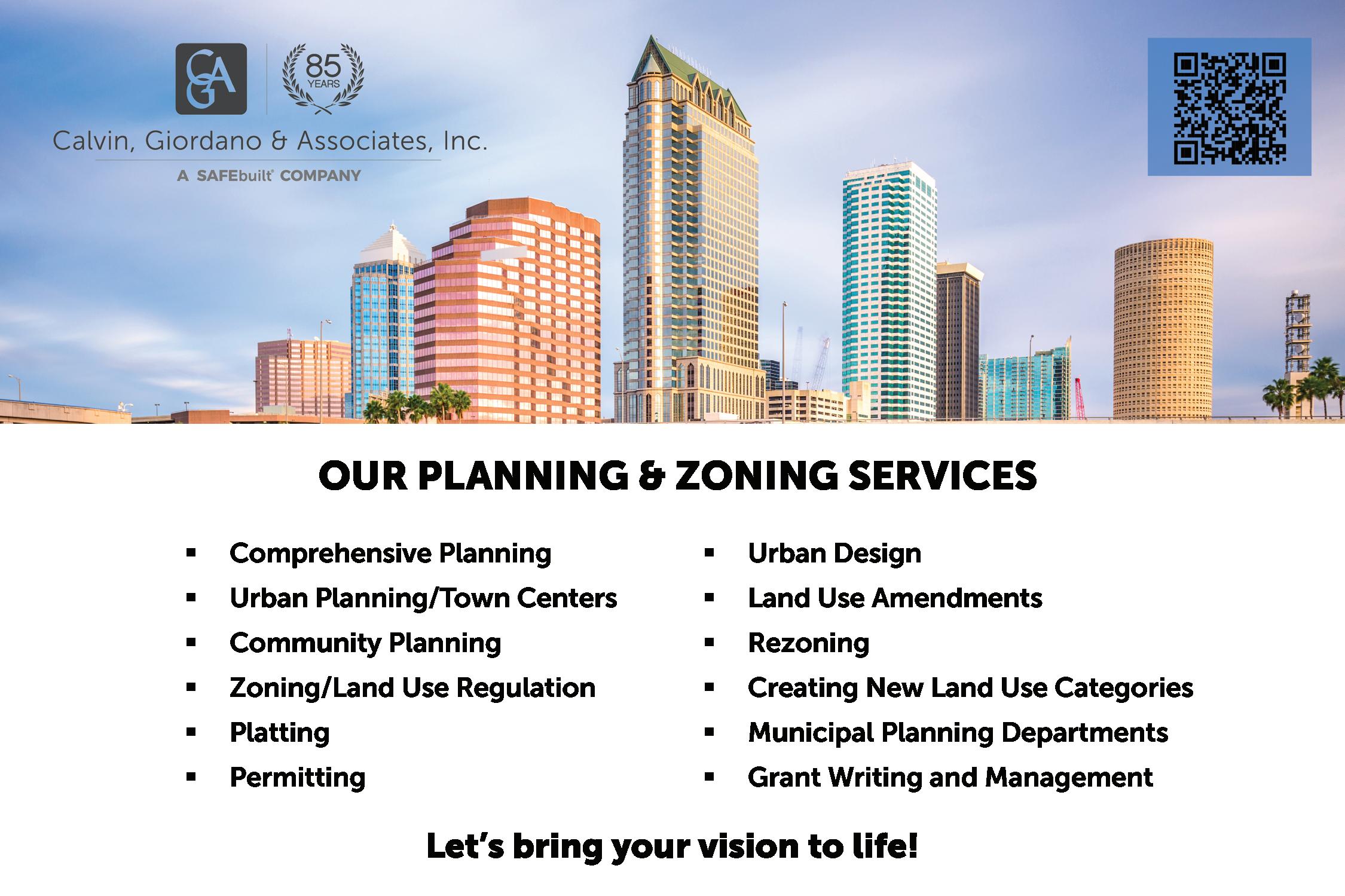
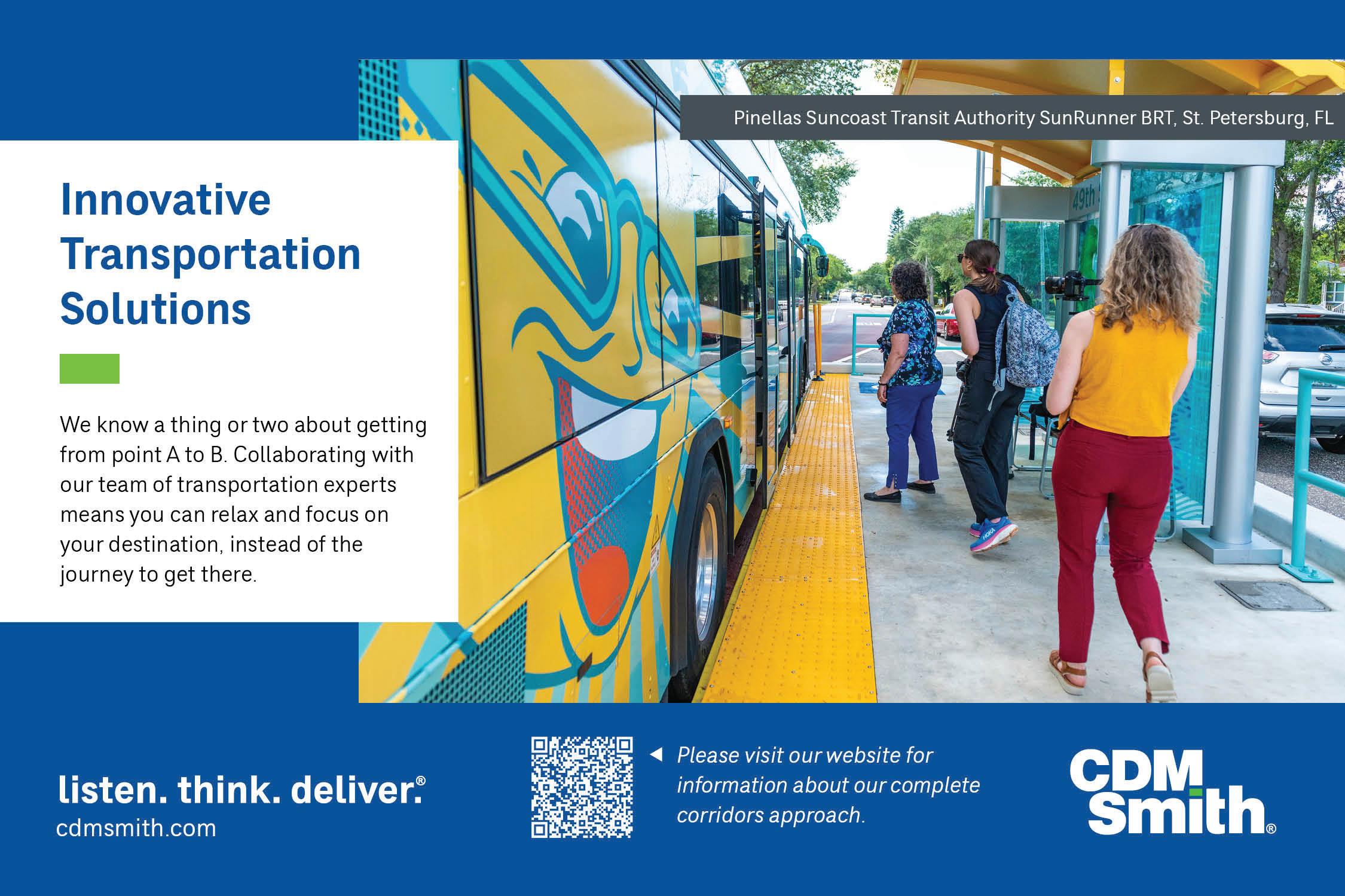
continued from page 30
experience (UX) design, to support innovative public sector solutions. She holds a Master of Arts in Urban and Regional Planning and recently earned her Ph.D. in Texts and Technology with a concentration in Digital Media. Francine is also pursuing certification in project management through the Project Management Institute (PMI), further enhancing her interdisciplinary skill set.
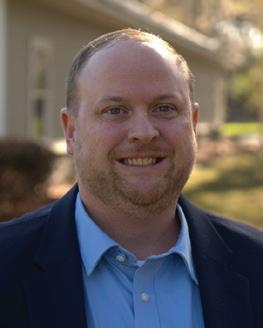
Justin Tabor, AICP, has been appointed Senior Planner within the Planning and Grants Division at North Florida Professional Services, Inc. In this capacity, he will apply his expertise in urban design, transportation planning, GIS, project management, and economic development to support local government clients across North Florida.
Justin holds a Bachelor of Arts in Public Administration with a minor in City/Urban, Community, and Regional Planning. He began his career as a Planning Intern with Orange County and most recently served as Principal Planner for the City of Alachua.
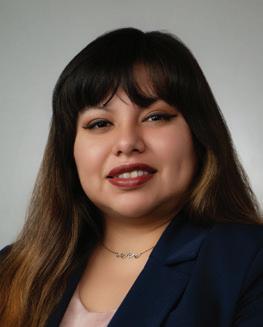
Alizgreeth Tezen, has joined AECOM as an Architectural Designer within the Urban Advisory Planning Department. In this role, she will contribute to transit-oriented development (TOD) projects, public engagement strategies, and strategic planning initiatives.
Alizgreeth holds degrees in City/Urban, Community and Regional Planning and Architecture. Her career began as a Planning and Zoning Technician and progressed through roles in public and private sectors, including Planner I, before transitioning to private practice.
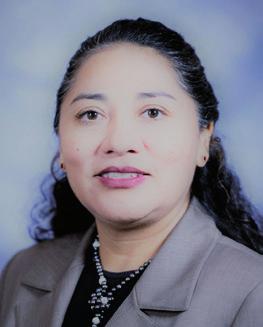
Adriana Trujillo-Villa, AICP, CPM, has been named Assistant Manager of the Orange County Transportation Planning Division within the Public Works Department. She will oversee professional service contracts related to roadway capacity and safety studies, term agreements, and intergovernmental coordination with transportation agencies.
With more than 19 years of experience in both public and private sectors, Adriana has led politically sensitive projects, cultivated strategic partnerships, and engaged effectively with both citizens and elected officials at the local and regional levels.
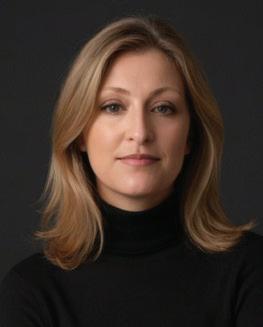
Amy E. Tull, CPM, CNU-A, was recently promoted to Assistant Director of Planning Services with Pasco County’s Planning, Development, and Economic Growth Department. After starting as an entry level Planner I, she has excelled through the ranks and been promoted over the years.
In this new role, she has been working to implement best planning practices, place making, new urbanist strategies, and organizational leadership. Currently, Amy is working on an exciting project involving updating the County’s Comprehensive Plan through implementing place making policies and guiding young planners to learn tools to help them grow into impactful generational planners.
With a Bachelor of Science in Public Administration from the University of Central Florida and a Master of Arts in Geography, GIScience and Spatial Analysis from the University of South Florida, Amy brings a strong background that will support her future initiatives with Pasco County.

Larry Wheatcraft, has been appointed Senior Planner for the Town of Ponce Inlet following the completion of his Master of Science in Urban and Regional Planning.
Larry brings a unique background in military and law enforcement service, which has strengthened his leadership and organizational capabilities. His professional interests include integrating public safety with environmental sustainability and promoting equitable community development.


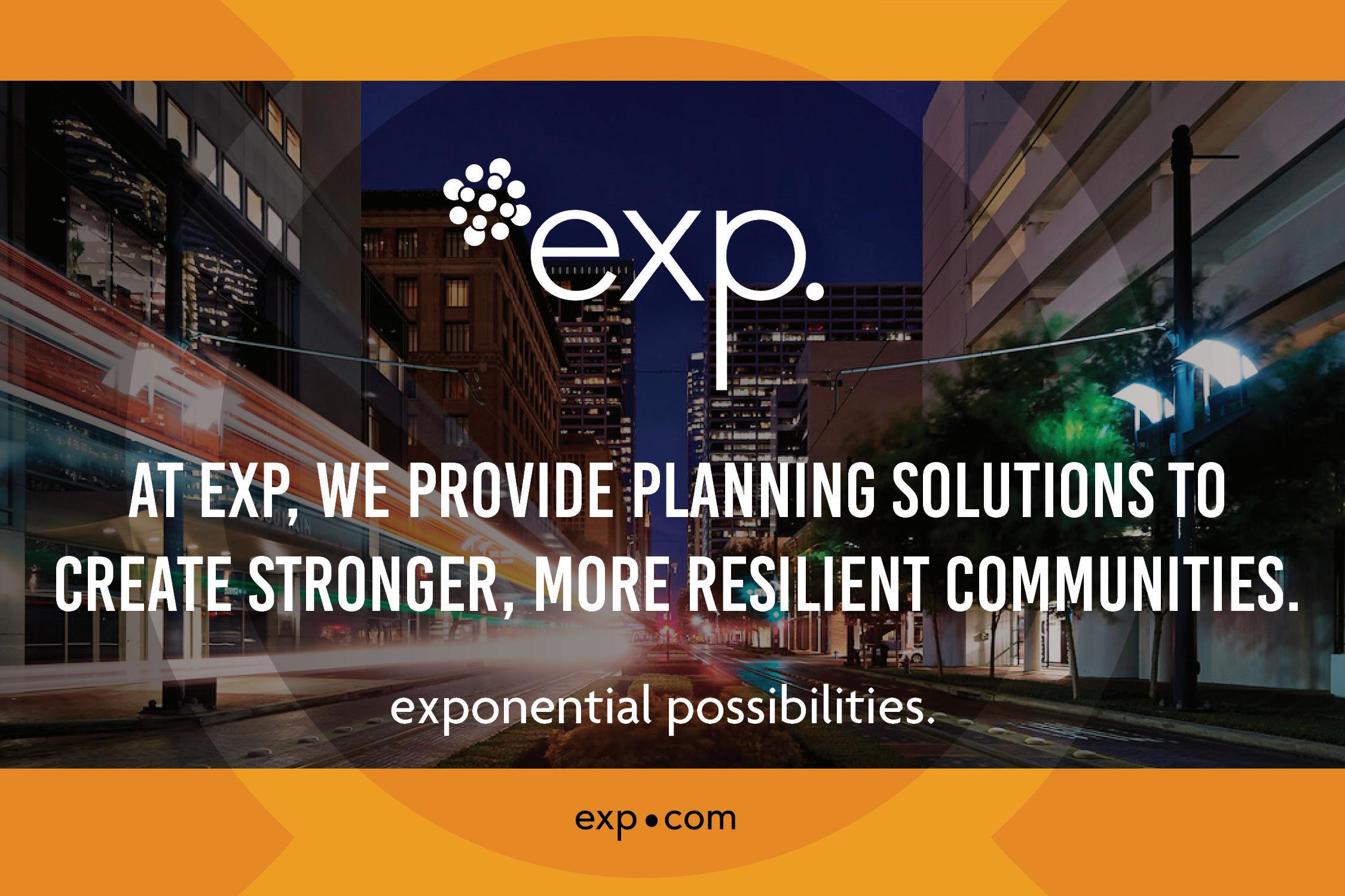
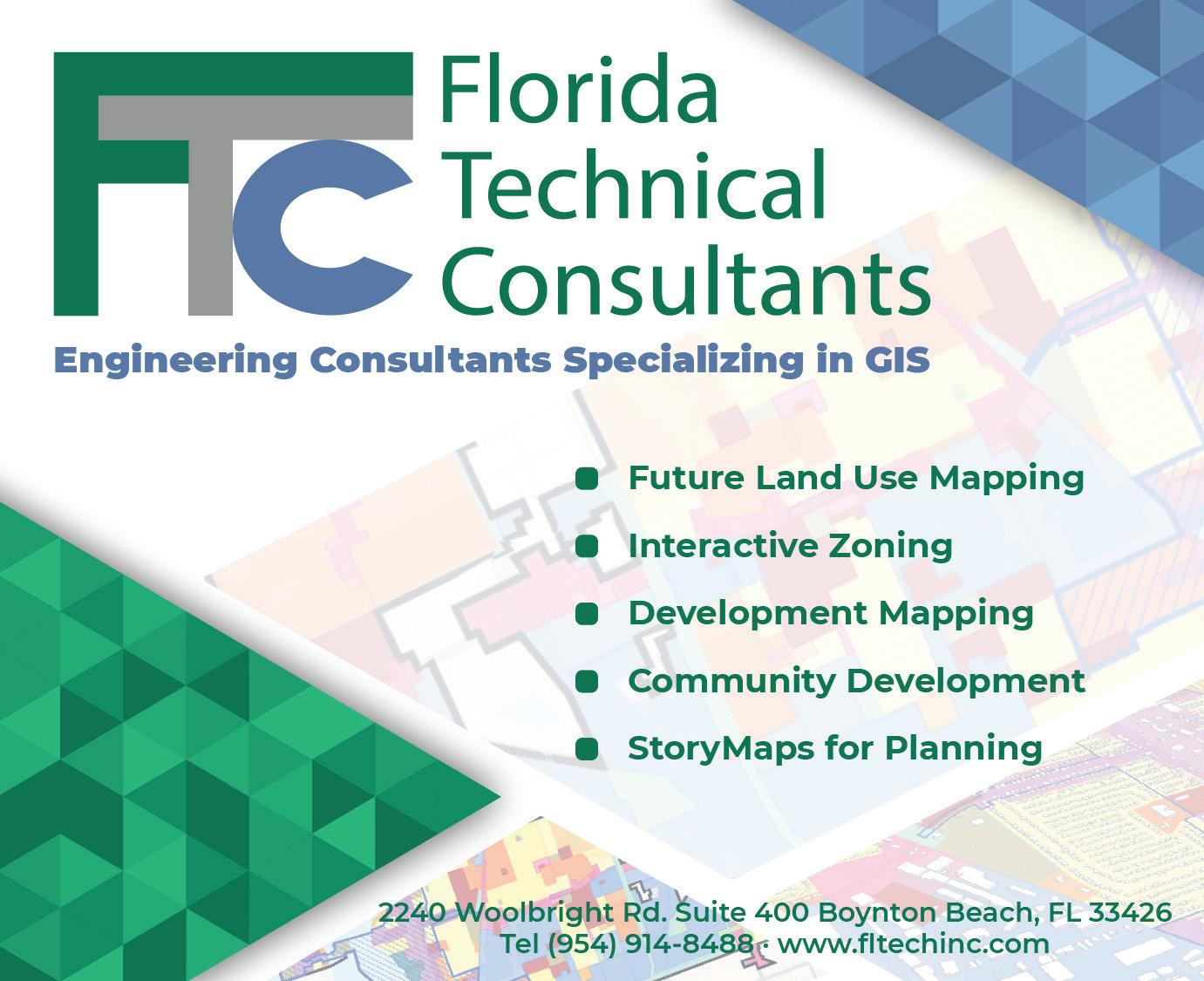
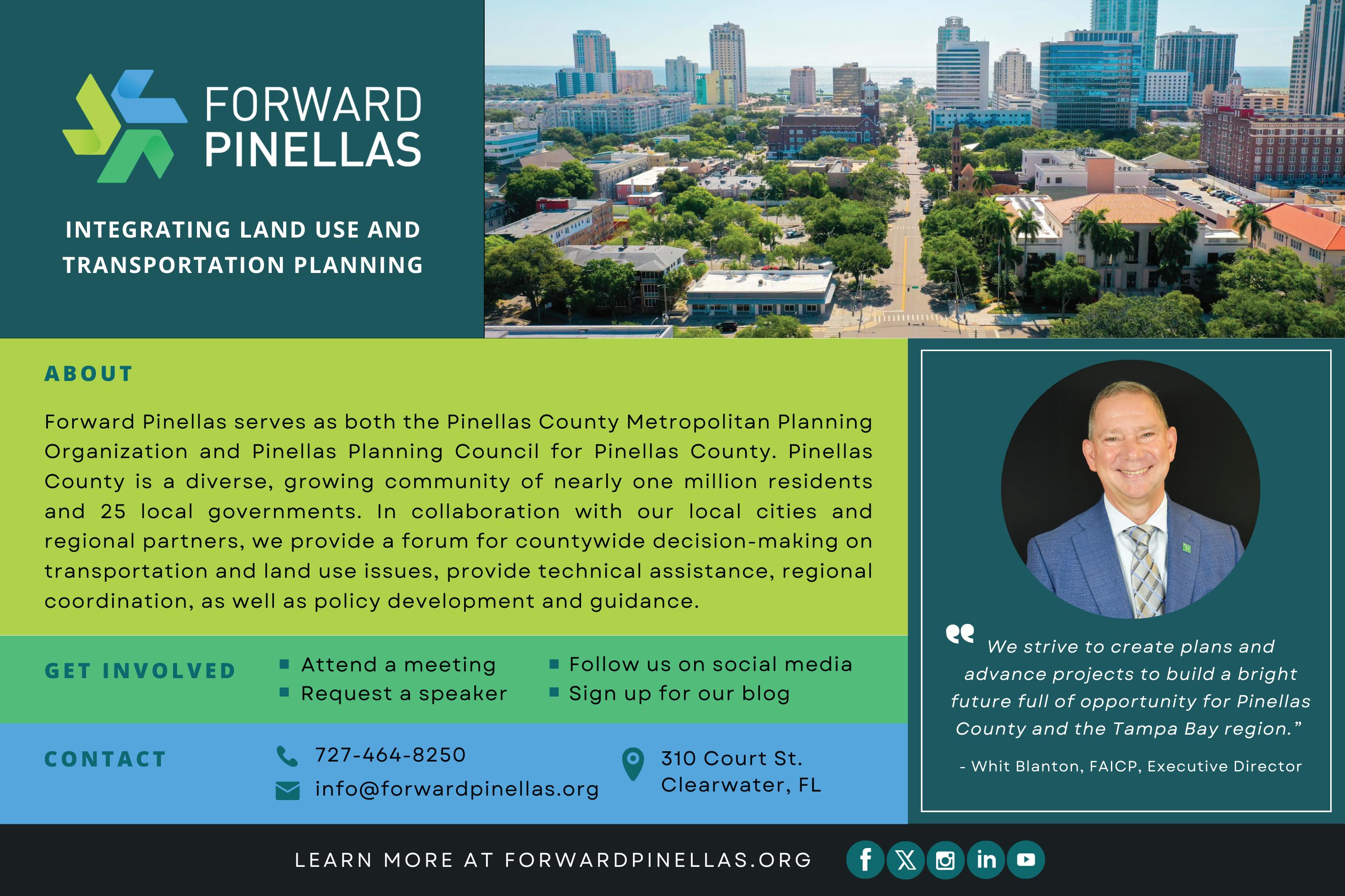


To our newly certified members: welcome to the distinguished group of AICP planners! We look forward to supporting you in your continued professional journey.
We applaud your hard work, dedication, and commitment to excellence in the planning profession. Earning the AICP credential is a significant milestone and a reflection of your knowledge, ethical standards, and professional practice.
And to all our long-standing AICP members—thank you for upholding the values and standards of the profession. Your ongoing commitment sets a strong example for the next generation of planners.
Let’s continue shaping a more sustainable, inclusive, and vibrant future for all communities across Florida.
Congratulations to the following 53 members who passed the AICP Certification Exam in May:
Emilee Aguerrebere
Fredrick Atkin
Michael Baker
Xavier Balerdi
Rebecca Bond
Alan Booker
Jeff Brammer
Rebekah Brightbill-Dasari
Amber Brocki
Nilia Cartaya
Jason Cheberenchick
Julia Clark
Gavin Covey
Ciara Dallas
Nicole Dufva
Leslee Dulmer
Shayna Eaton
Christina Evans
Connor Ford
Richard Furci
Alvaro Gabaldon
Harrison Garrett
Andrew Georgiadis
Alyssa Goldberg
Thatcher Hart
Adrian Hayes Santos
Denise Hernandez
John Hutchens
Umar Javed
Emily Lyn
Autumn Martinage
Laura Martinez
Courtney McMillion
GET READY FOR THE FALL 2025 AICP EXAM Free Live Prep Series Starts Aug. 7!
Are you planning to take the AICP Exam during the Fall 2025 testing window or in the near future? Join the APA Florida Treasure Coast Section for our FREE AICP Exam Preparation Series, designed to help you succeed!
�� Fall Session Dates: August 7 – November 1, 2025
�� Format: Live sessions via Go-To-Webinar (recordings available)
�� Schedule:
Thursday Evenings (6–9 pm ET): Topic-focused sessions
Saturday Mornings (9 am – Noon ET): Practice questions
�� What’s Included:
• Live instruction and Q&A
• Access to recorded sessions
• Study materials and practice exams (APA Members only)
�� Want to join? Sign up for the email list here
For more information about the AICP credential and the One Path to AICP process, visit planning.org/aicp
We’re excited to support your professional development journey!
Tiffany Menard
Brittany Metzler
Mark Meyer
Christopher D Moore
Mary Noonan
Yasmine Noubani
Deidre Oge
Christian Popoli
Jeremy Rogus
Adrian Santiago
Elizabeth Shulman
Deborah Tackett
Matthew Thomas
Merylene Thomas
Alison Trezek
William Vermillion
Garret Watson
Rebecca Webster
Patrick White
Steven Williams
– FALL 2025 EXAM CYCLE
The application window for the APA AICP Certification Diversity Scholarship for the November 2025 exam closes at noon CT on Aug. 28.
APA will award 50 scholarships through a lottery-based selection process. These scholarships are available to eligible APA members and may be applied toward either the exam fee or the assessment fee—but not both within the same cycle.
The concept of diversity, as recognized by APA, is inclusive and broad. It encompasses, but is not limited to, characteristics such as race, ethnicity, socioeconomic background, gender, age, disability, educational attainment, spiritual beliefs, tribal affiliation, nationality, immigration status, veteran status, and other lived experiences.
Members who self-identify with one or more of these categories and demonstrate financial need are encouraged to apply. Scholarship recipients will be selected by APA in mid-September 2025. More information here.
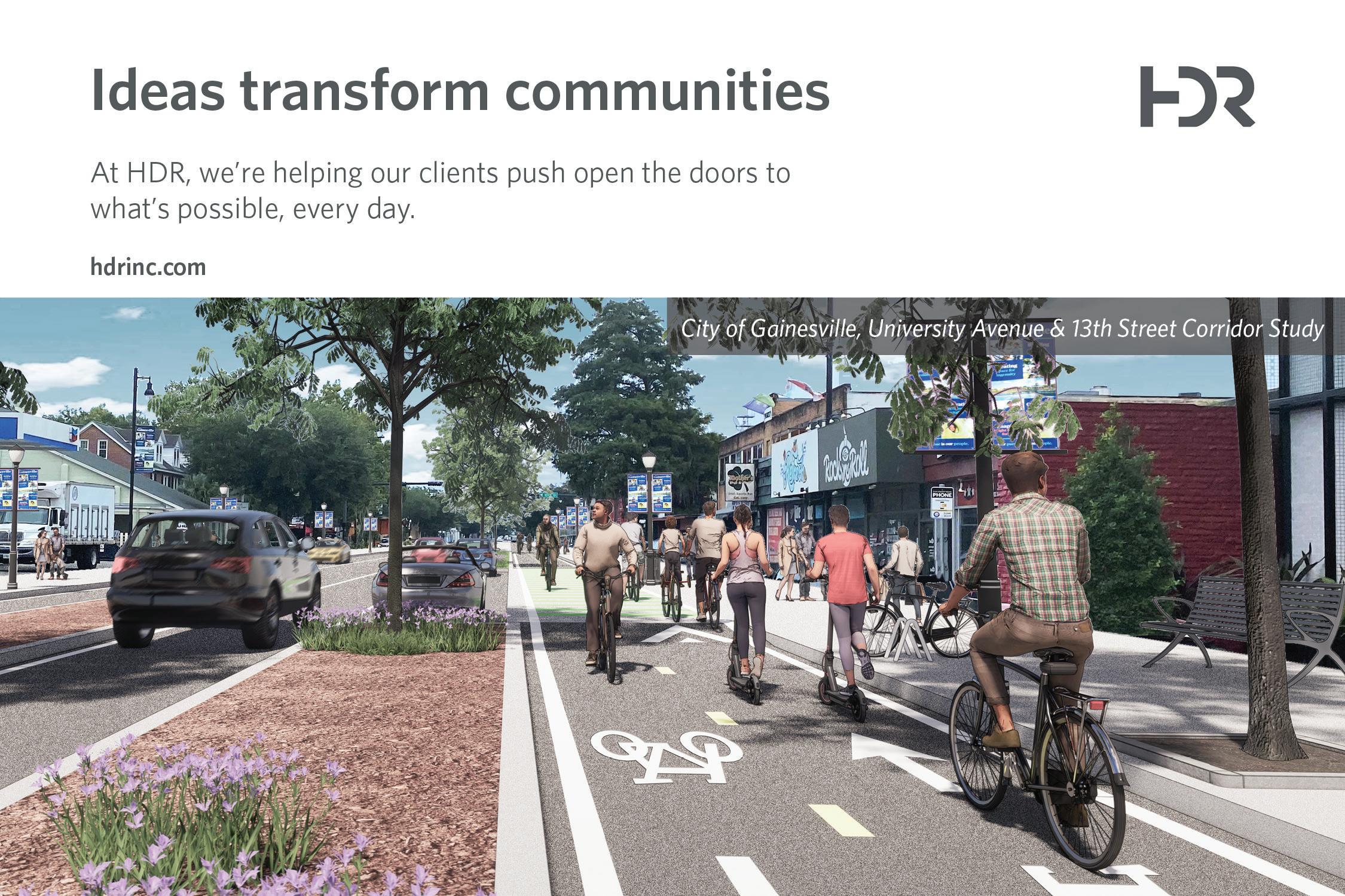
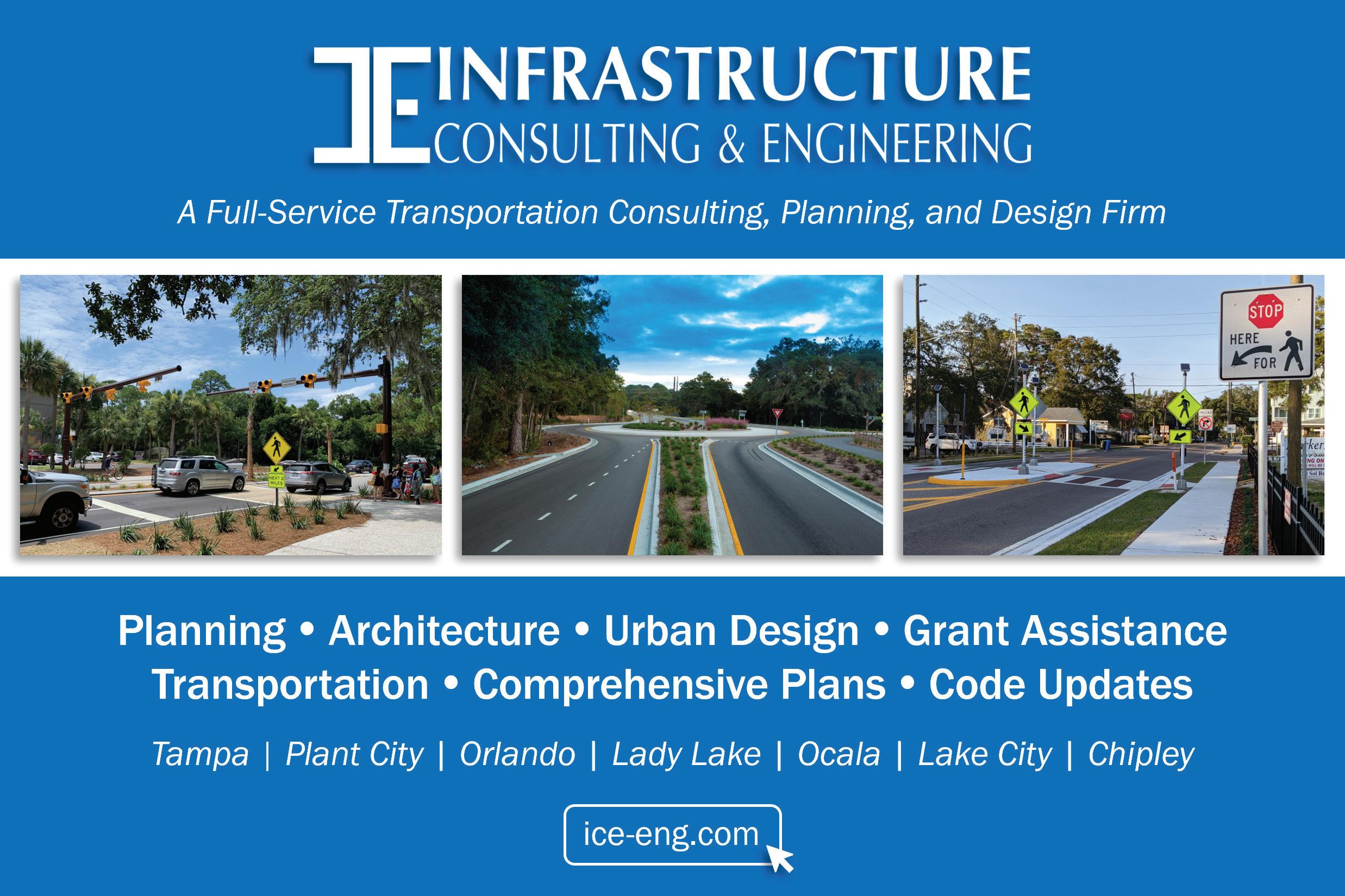

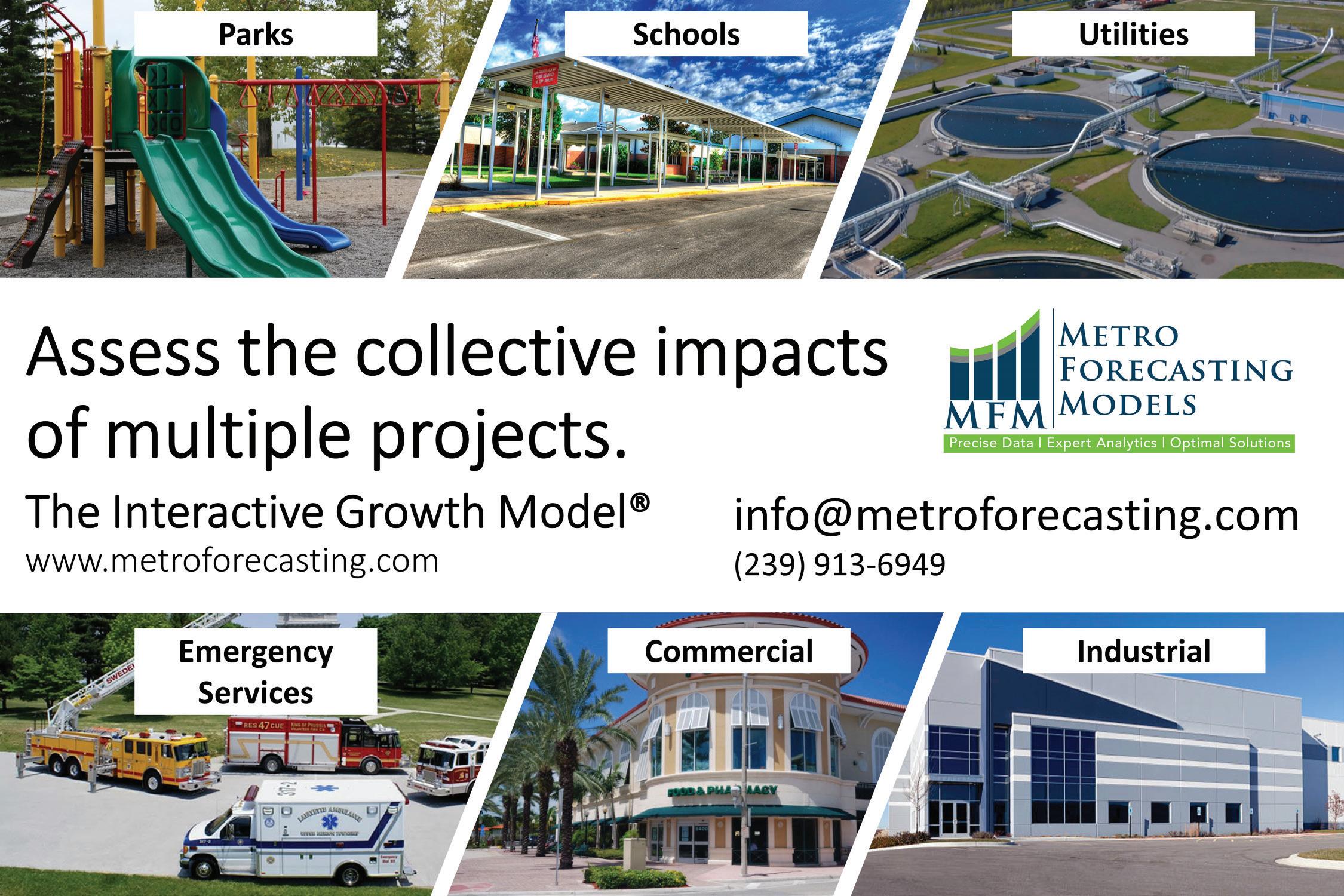
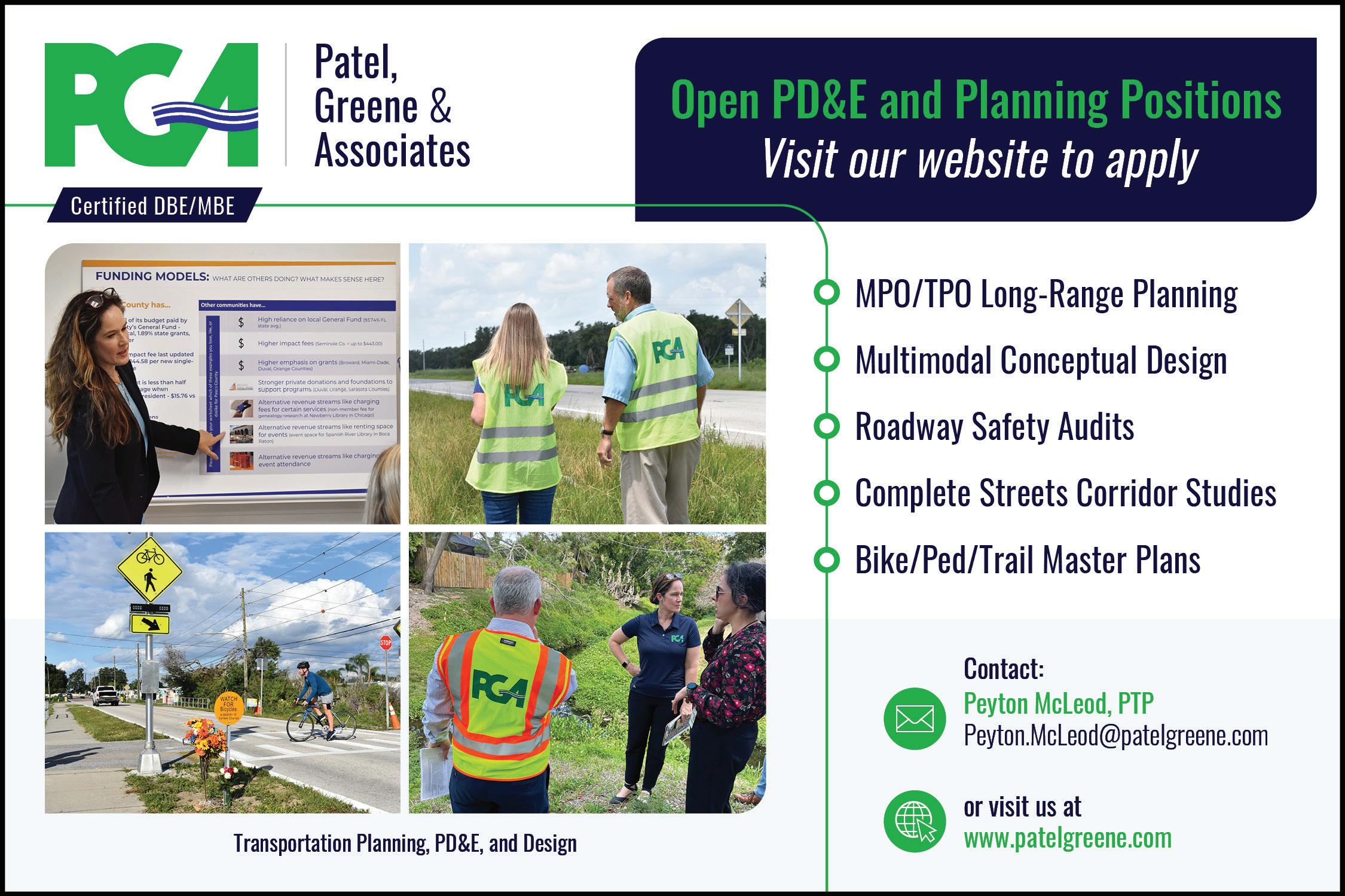
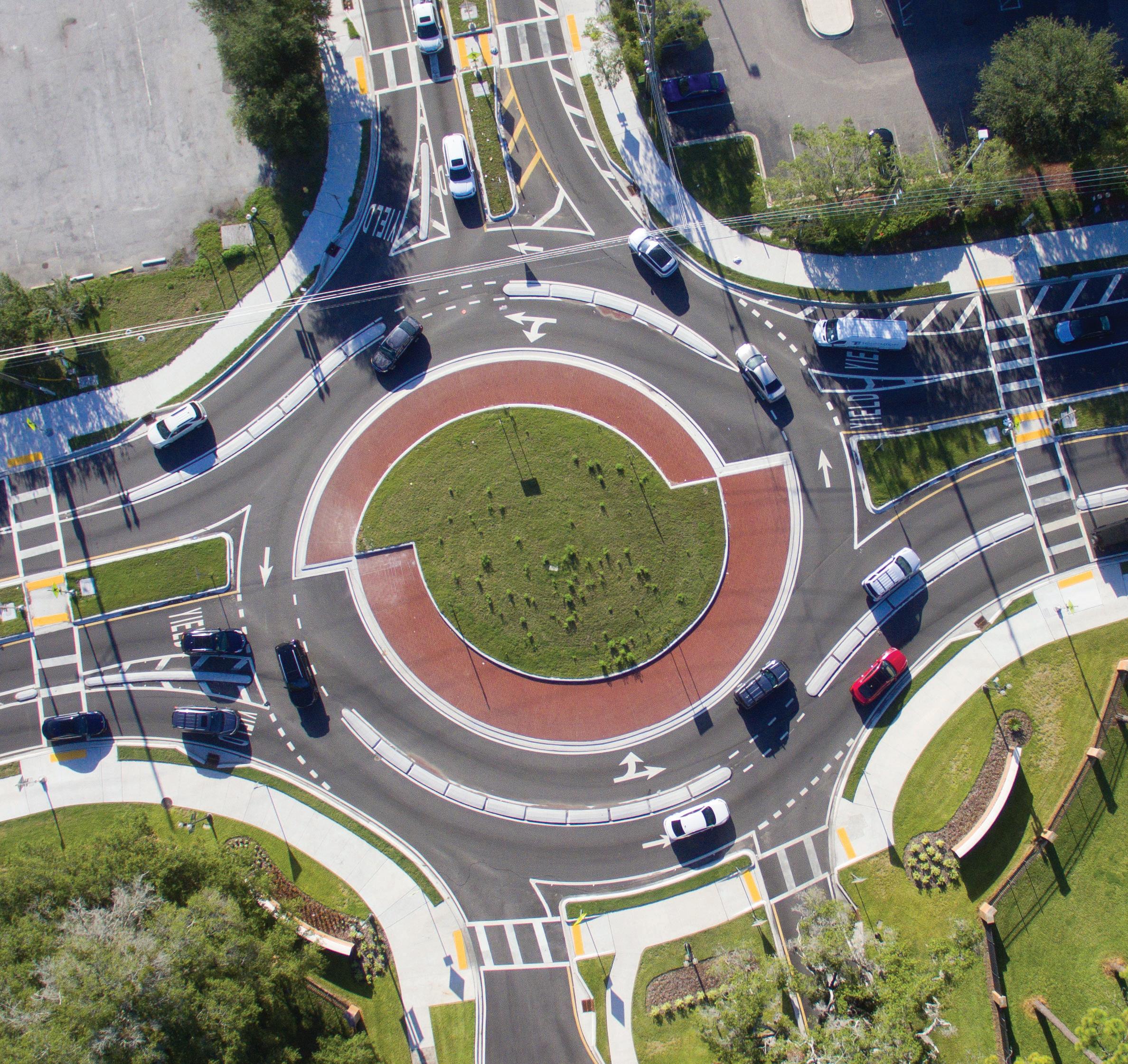


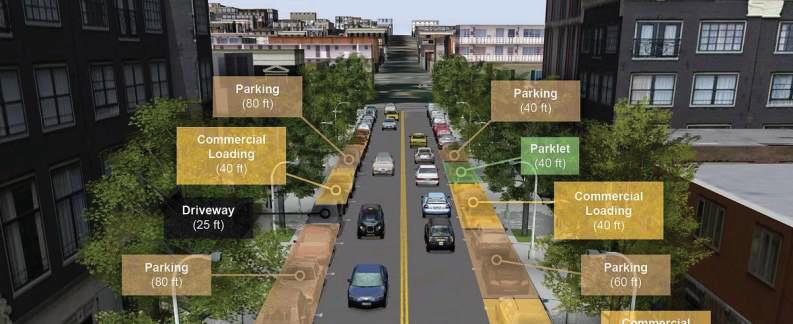
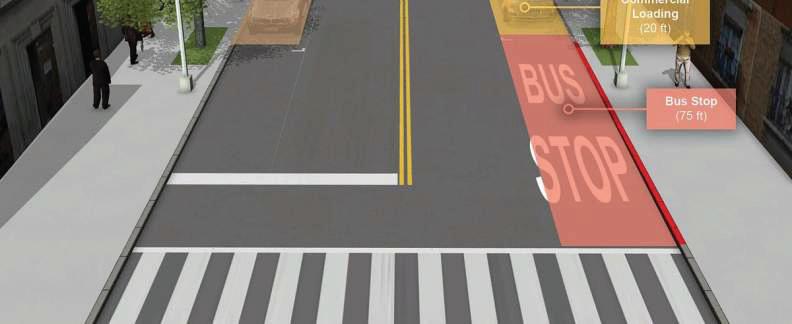
APA Florida remains committed to supporting sound, community-centered planning policy at all levels of government.
In response to the complexity of this year’s legislative session, we’re launching a Legislative Review Series to help members understand the key issues, budget implications, and policy changes affecting planning across the state. This three-part series is designed to keep you informed, engaged, and empowered—whether you’re a student, emerging professional, or seasoned planner.
SESSION 1: HIGH-LEVEL OVERVIEW WEBINAR
Monday, July 29 | 1 – 2:30 pm ET
1.5 CM or 1 Law CM
Kick off the series with a broad overview of the 2025 session, including major bills, budget highlights, and what they mean for Florida’s planning landscape.
Register here
SESSION 2: DEEP DIVE AT FPC25
Wednesday, September 18
8:15 – 10:15 am ET | 2 CM + 1 Law CM
Join us in Daytona Beach for an in-depth analysis of key legislation (including the Live Local Act) and its long-term implications for planning practice. This session is part of the Florida Planning Conference.
SESSION 3: FINAL REVIEW & POLICY WRAP-UP WEBINAR
Tuesday, October 28 | GoToWebinar
We’ll close out the series with a final look at implementation, legal updates, and what’s next for planners heading into 2026.
Register here
We look forward to helping you stay ahead of the curve on the policies shaping Florida’s future.
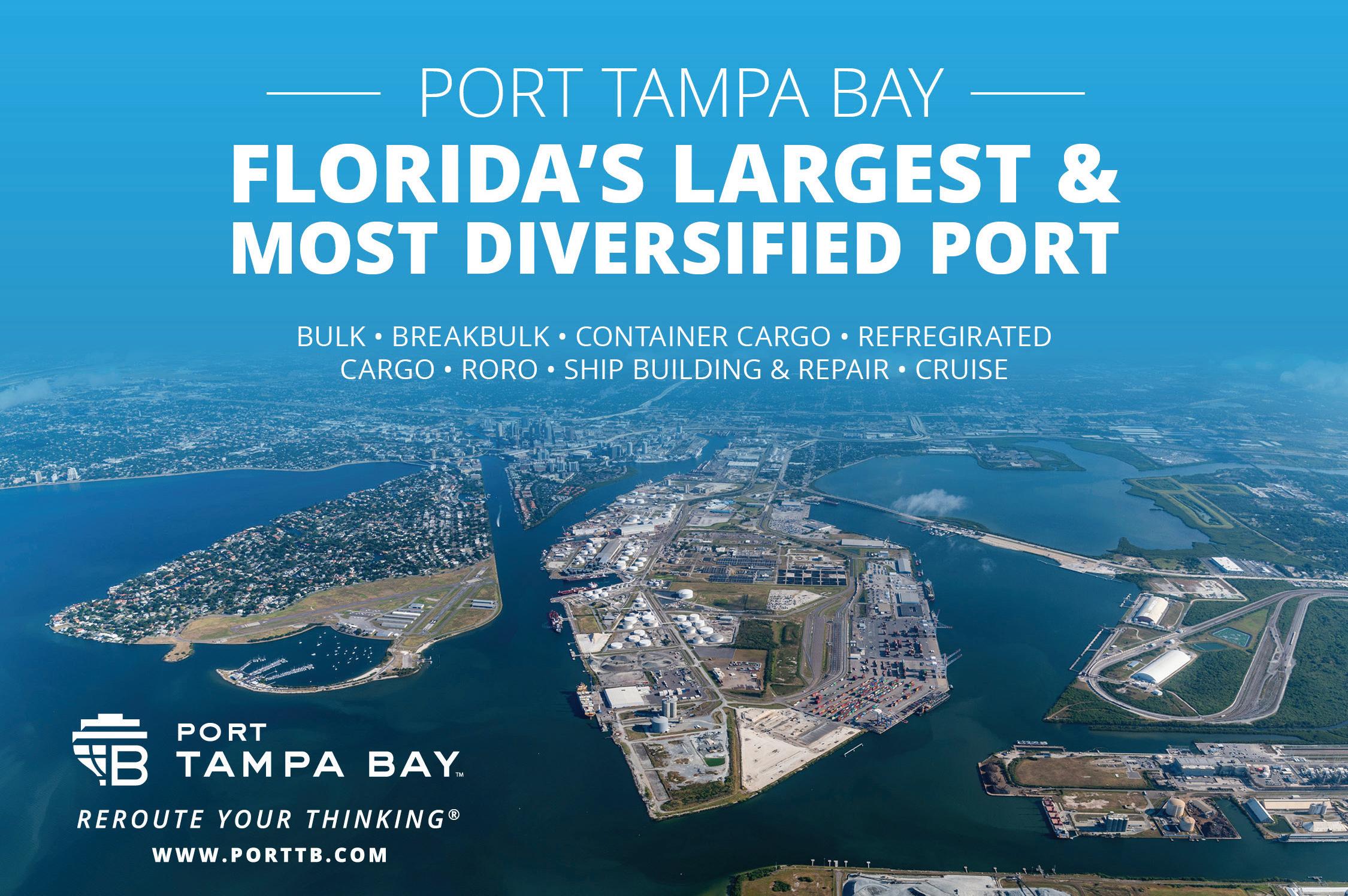
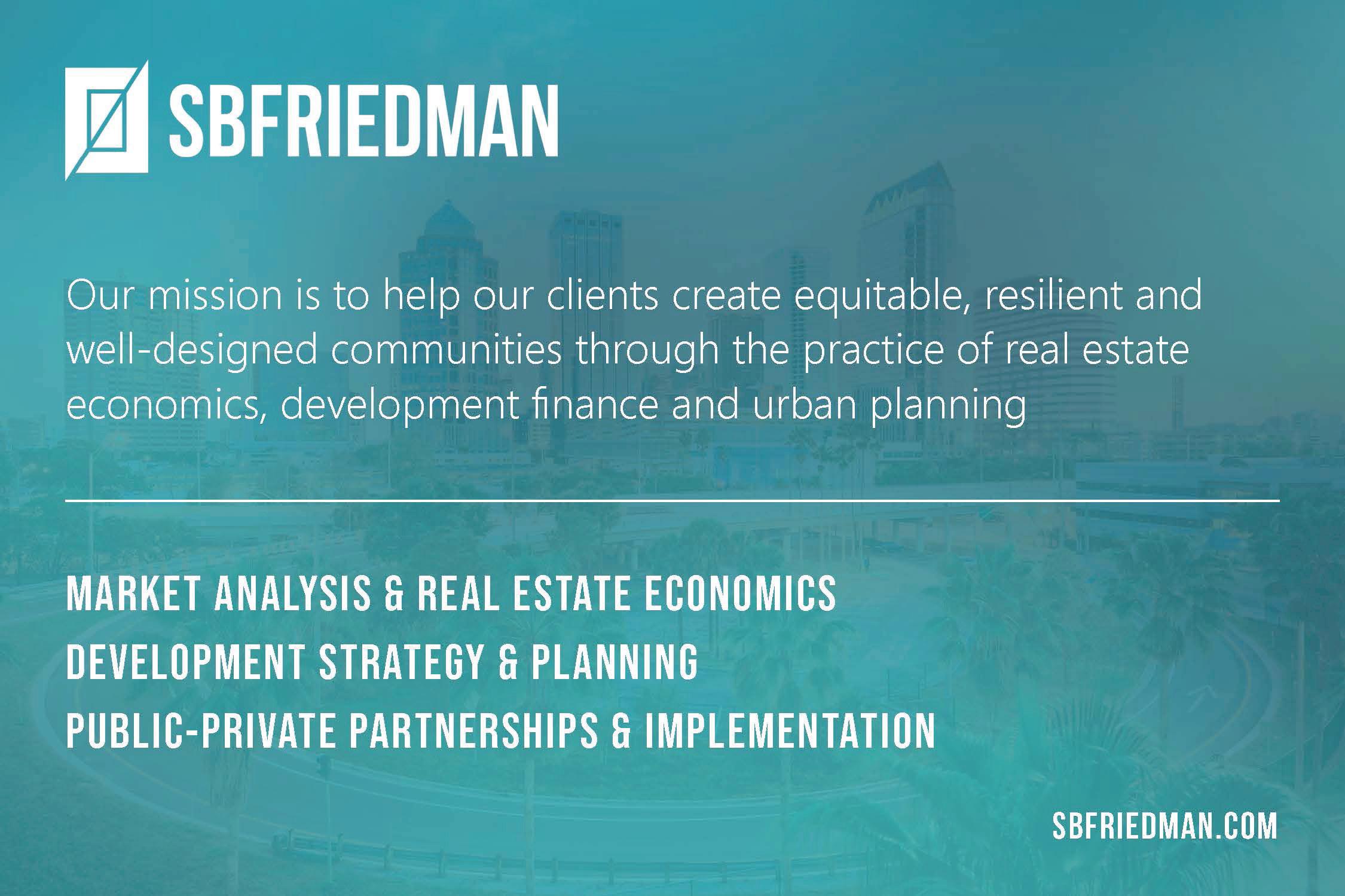
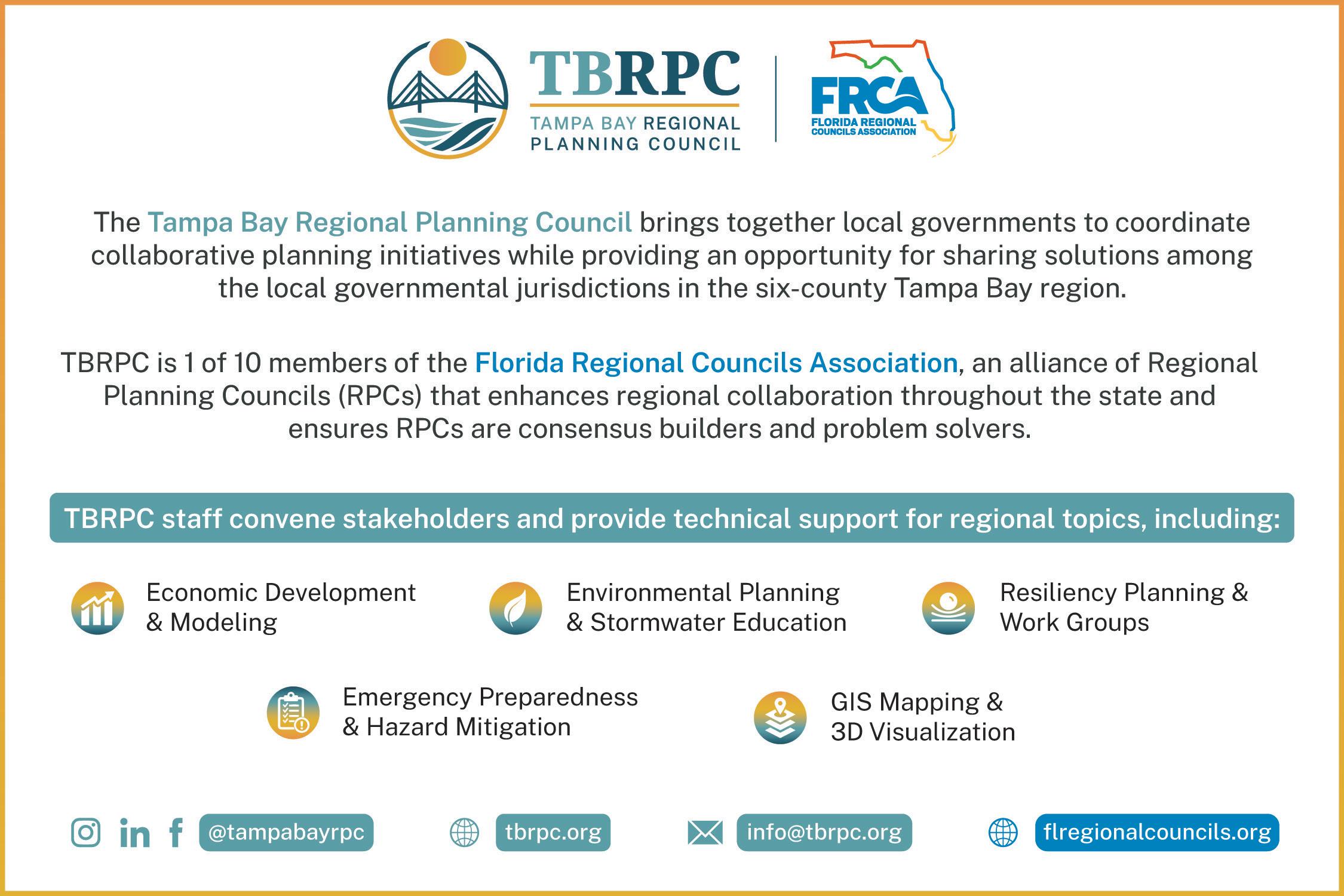
Your APA Florida Chapter has been hard at work advancing planning, empowering professionals, and strengthening communities across the state. Here’s a look at how we’ve been working for you:

Earlier this year, the APA Florida Executive Committee undertook a thoughtful review and update of the Chapter’s Mission and Vision statements.
Guided by our core values, this effort reflects a renewed commitment to principled leadership and service. These updated statements now inform our daily work, reinforcing our dedication to helping members grow, lead, and contribute meaningfully to Florida’s future.
We’re thrilled to unveil our new APA Florida Culture Statements with all our members at the Florida Planning Conference!
The APA Florida Plan for All Committee recently hosted Salary Negotiation Seminars in the Orlando Metro, Sun Coast, and Broward Sections, designed to help planners better understand their value in the job market and develop effective negotiation strategies. These workshops were particularly valuable for early- and mid-career professionals, as well as anyone looking to make a career move or prepare for performance evaluations. Each session provided practical tools and advice, helping planners advocate for fair and equitable compensation.
As part of our ongoing professional development offerings, we’ve hosted several free webinars open to all members. Two standout sessions include:
• Community Engagement: Practical Solutions for Future-Proofing Transportation. This session explored the role planners play in promoting healthy communities, with strategies for integrating public health into planning practice. (1 CM)
• Empathic Design This webinar offered valuable insights into resilience planning, climate adaptation, and the tools local governments can use to prepare for future challenges. (1.5 CM)
These sessions are recorded and available to view at your convenience, so you can keep learning whenever your schedule allows.
If you have an idea for a webinar, fill out this form
The APA Florida Treasure Coast Section successfully hosted the AICP Exam Study Group, led by Henry Bittaker, FAICP, and Susan Coughanour, FAICP, from January through March, drawing participants from across the country. This free member benefit provided a structured, supportive environment for aspiring AICP planners, which offered:
• Proven study strategies
• Peer accountability
• Expert insights from seasoned professionals
We’re excited to announce that this comprehensive series will return on August 7—just in time for those preparing for the next Fall AICP Testing Window!
Whether you’re just starting your study journey or looking for a final boost of confidence, this is a great opportunity to connect with fellow exam-takers and stay on track.
Sign up for the mailing list here: bit.ly/AICPsignup
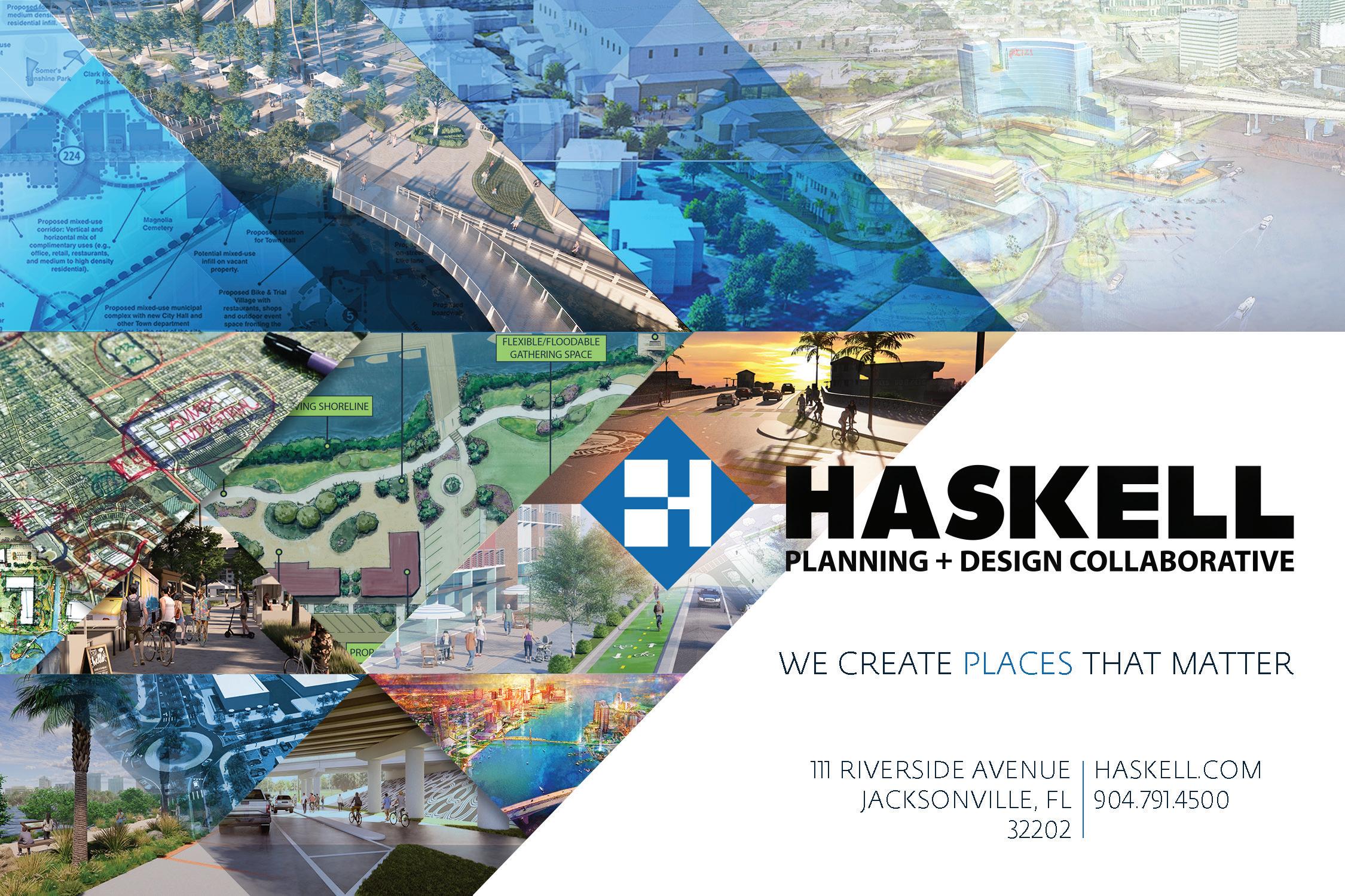

On June 13, we hosted a well-attended Planning Officials Training (POT) in Lee County, with 55 participants including elected officials, advisory board members, and city/county staff. This training is an essential tool for helping appointed and elected leaders understand their roles in the planning process and make informed decisions.
If you missed it, mark your calendar: Another POT will be held at FPC25 on Sept 16 . This is a fantastic opportunity for both seasoned and newly appointed officials to sharpen their skills.
Registration options here: floridaplanningconference.org/potw
�� Want us to come to your city? Request a workshop here
During the 2025 legislative session, APA Florida monitored 237 planning-related bills, keeping members informed and prepared to respond. We championed common-sense planning practices and spoke out when needed — including a call to the governor urging a veto of Senate Bill 180 due to its potential negative impacts on local planning authority and community outcomes.
Review the Sine Die Legislative Reporter here. We are hosting a review session series for all members. Refer to pp 40 for information.
The Executive Committee (EC) met in Gainesville on May 16–17 to update the chapter’s Strategic Plan. This plan outlines our priorities for the next several years and reflects feedback from members, section leadership, and our partners.
The updated draft will be presented to members for review and approval at our Annual Meeting on Sept. 16 during FPC25. We encourage all members to attend and take part in shaping our direction forward.
We’ve hosted three Chapter Chats this year, providing a casual, interactive space for planners across Florida to connect and share ideas. Our most recent chat took place on June 17, with discussions on current initiatives and Chapter news.
Watch the June 17 Chat below if you couldn’t make it live.
Our next Chapter Chat will be @ 2 pm ET on Tuesday, Aug. 26 and will focus on the Chapter budget and strategic plan updates — your input will be important! Register here
We are currently working on revamping the vision and scope of our Community Planning Assistance Team (CPAT) program to better align with today’s community needs and planning challenges. CPATs offer pro-bono planning support to underserved communities throughout Florida.
Stay tuned! We will be issuing a call for volunteers soon and would love to have passionate members like you involved in the next phase of this important initiative.
Whether you’re attending a webinar, volunteering your time, or participating in a Chapter Chat — you are part of what makes APA Florida a strong, vibrant professional community. We’re grateful for your commitment and look forward to seeing you at FPC25 in September!
Have a question or want to get involved? Reach out to us anytime


Advertise in the Consultants Directory
The Consultant Directory is a fitting place to showcase your firm. $250 buys space for a year in the newsletter (four issues) plus inclusion in our web-based consultant directory. Display ads to promote your business, conference, projects and more are available. Contact the Chapter office at 850-201-3272 for rates and details.
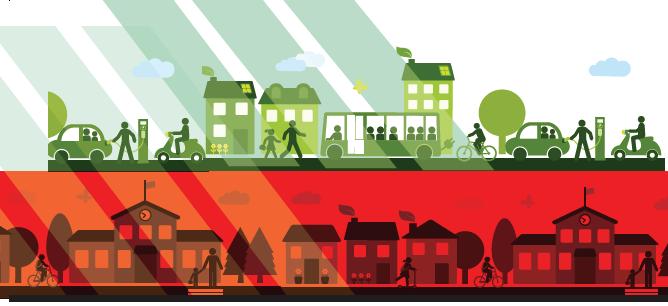

In a Livable Community, people of all ages can make their town or city a lifelong home Learn about what’s happening in Florida. Contact Laura Cantwell at lcantwell@aarp org

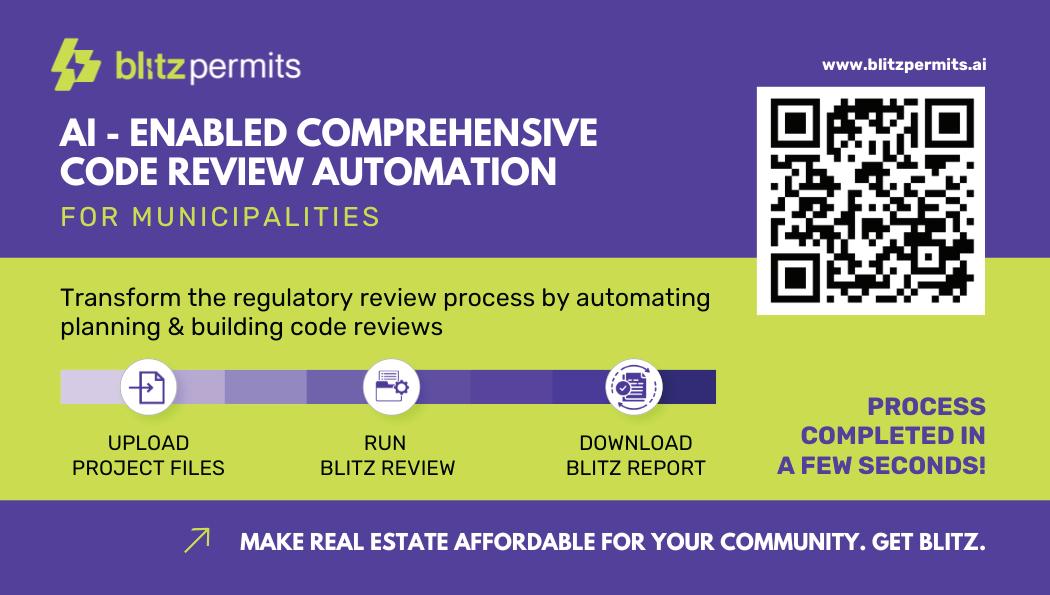
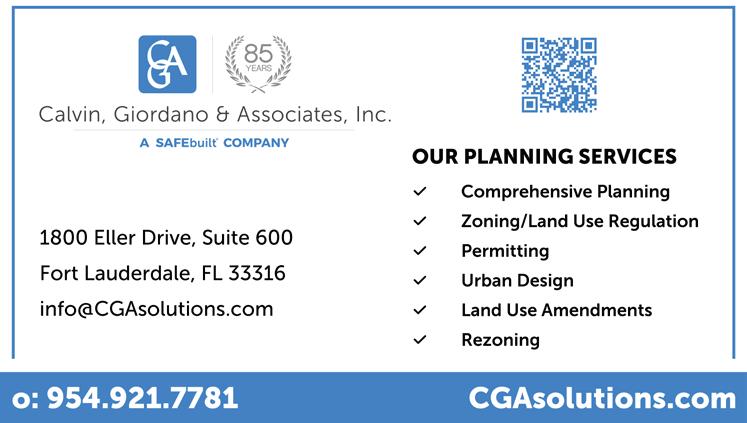
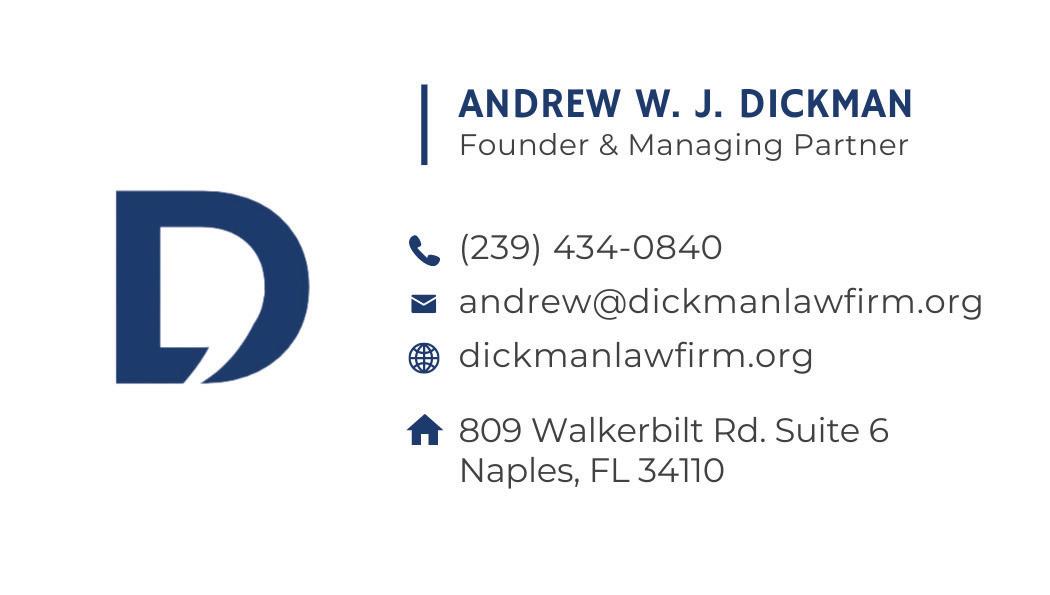
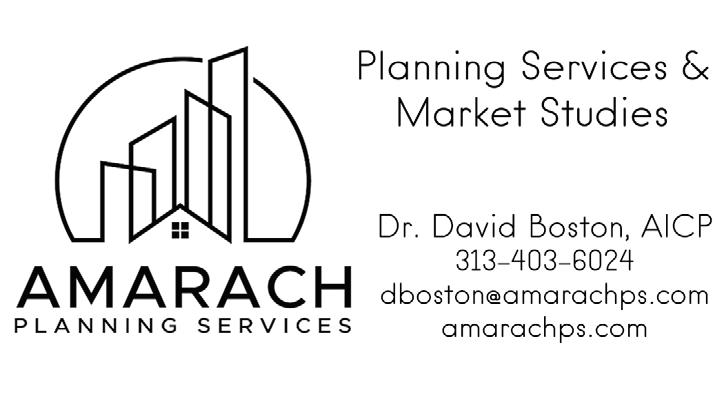
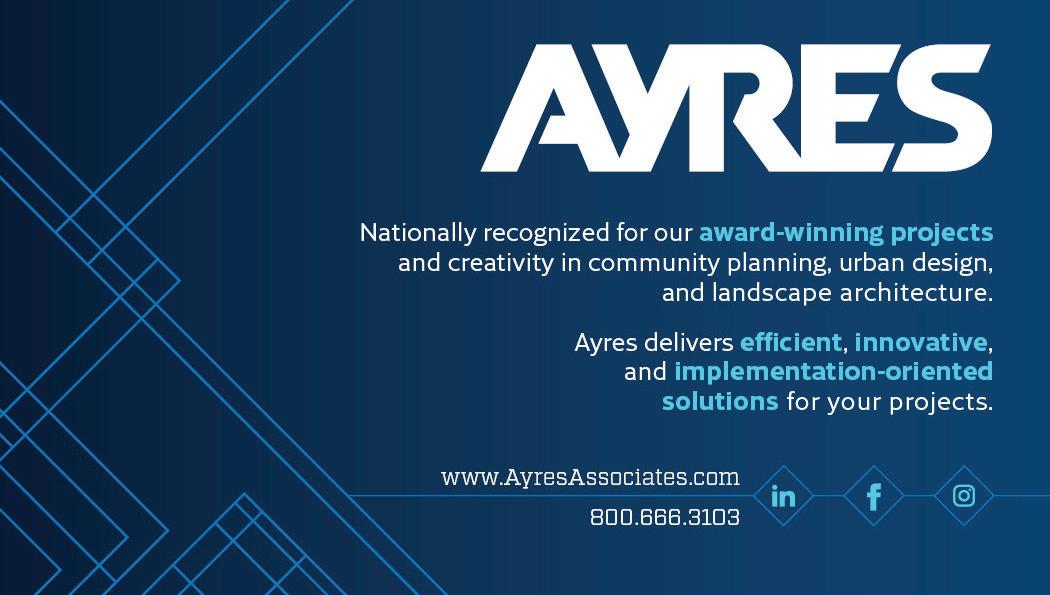
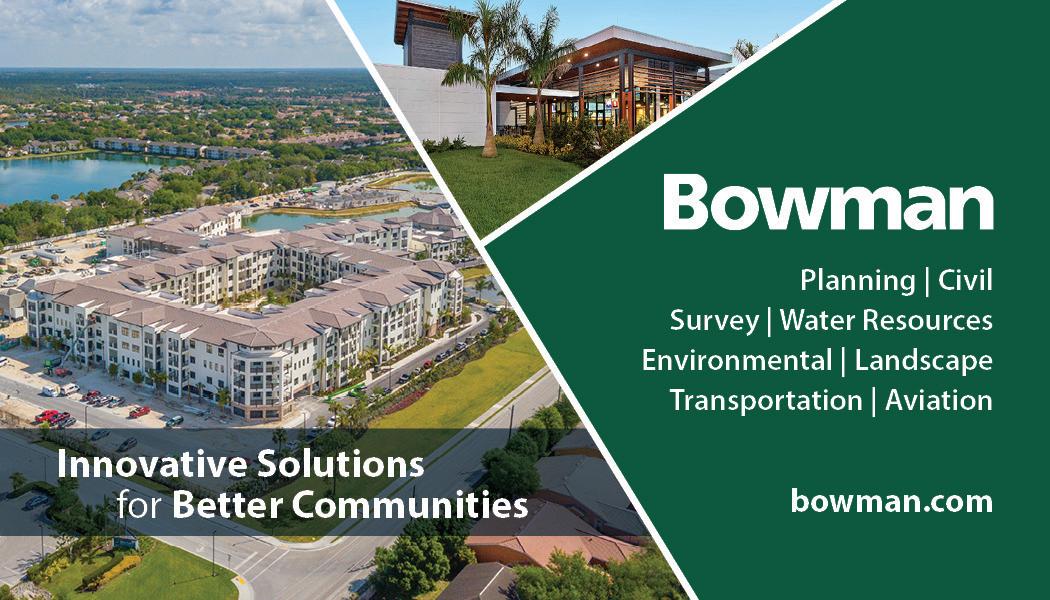
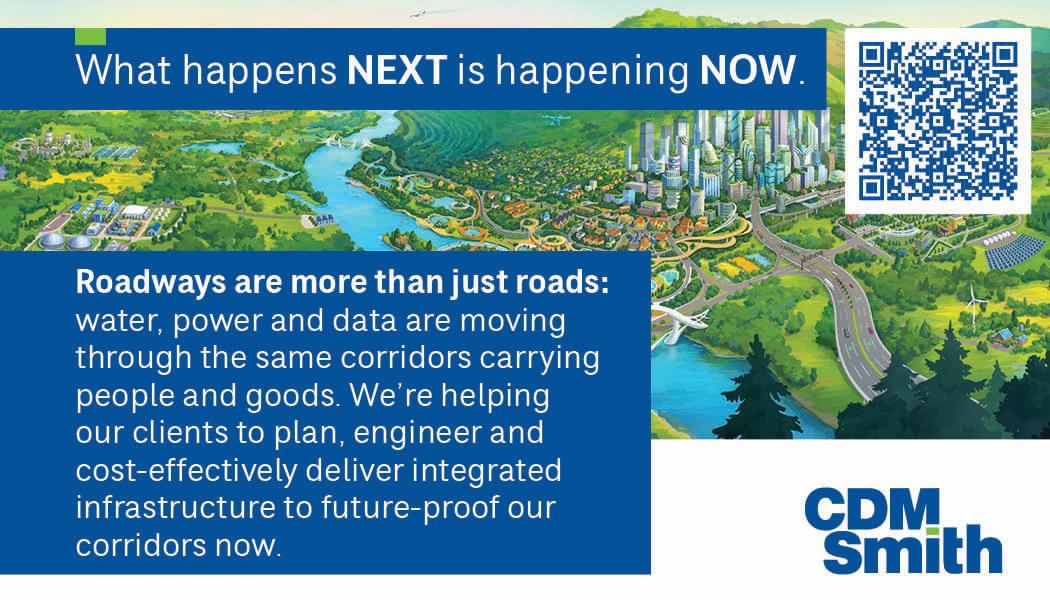




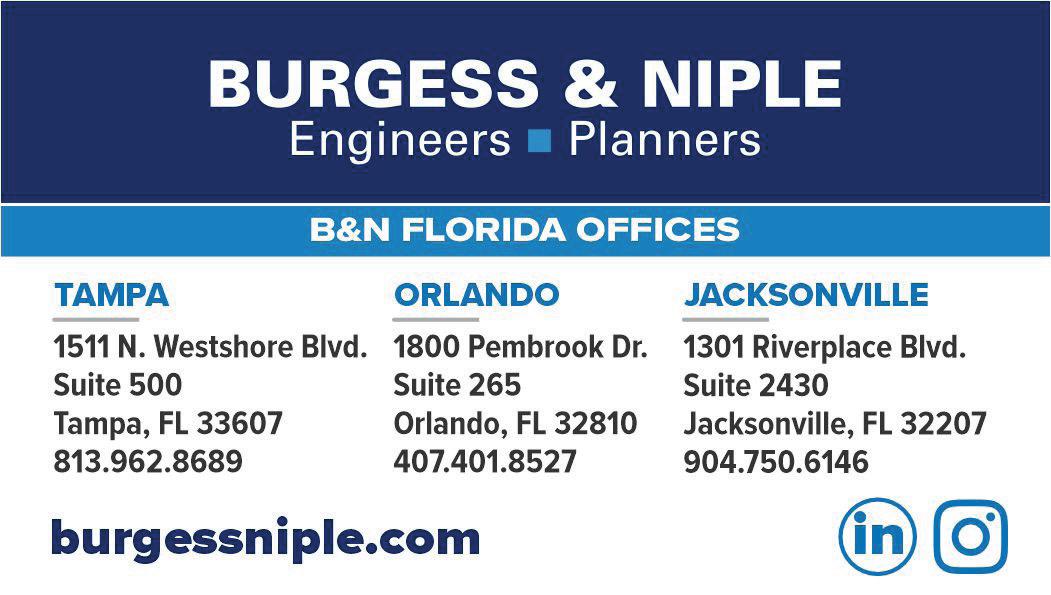
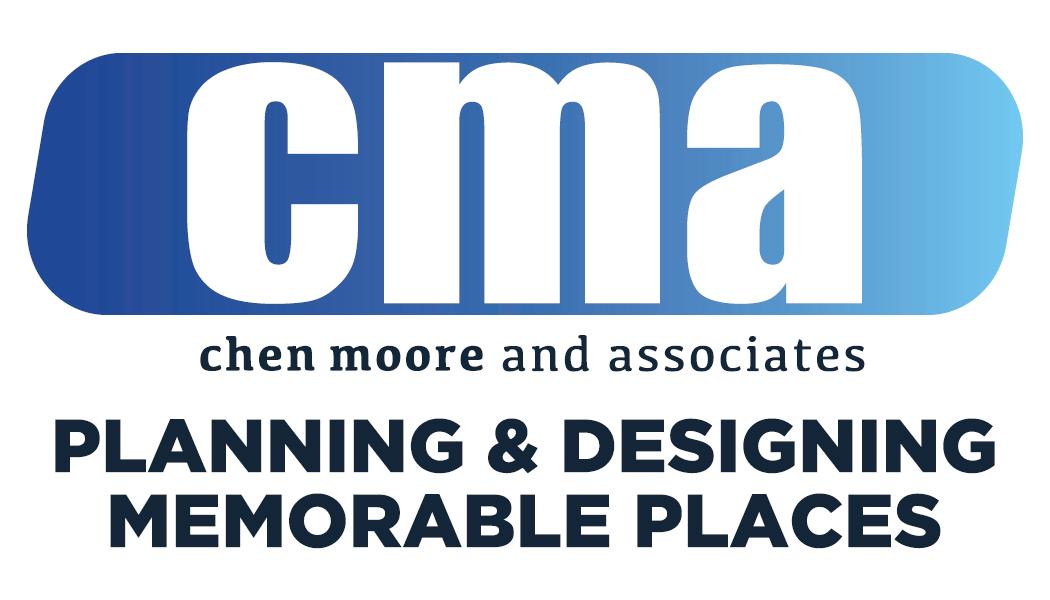

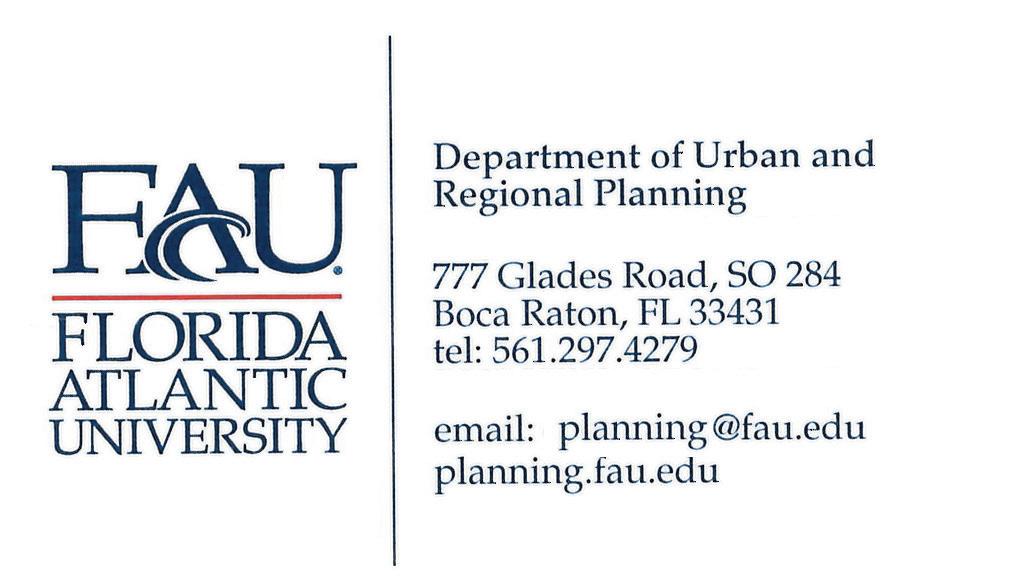
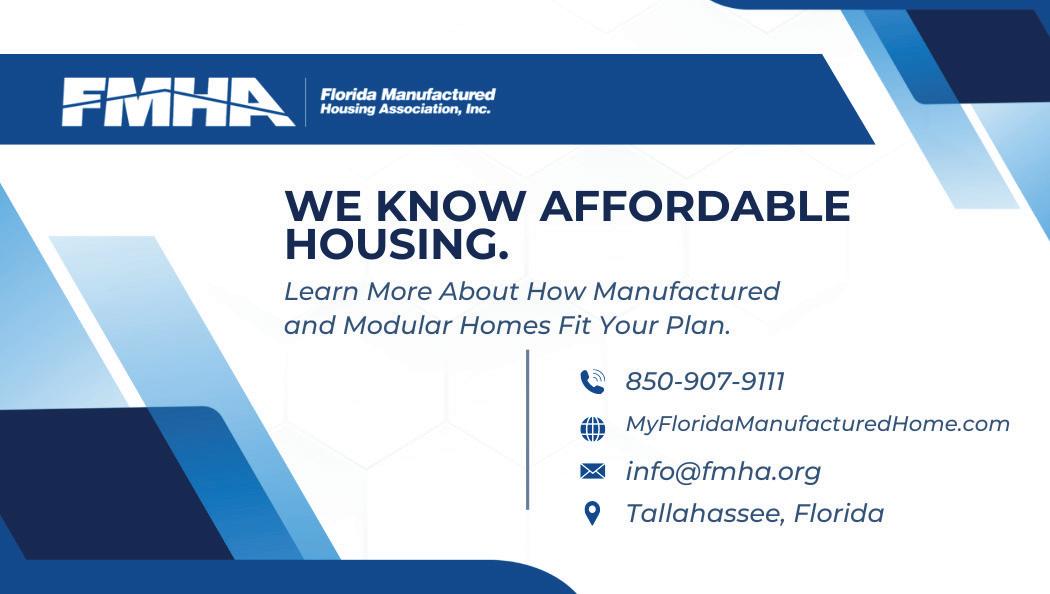

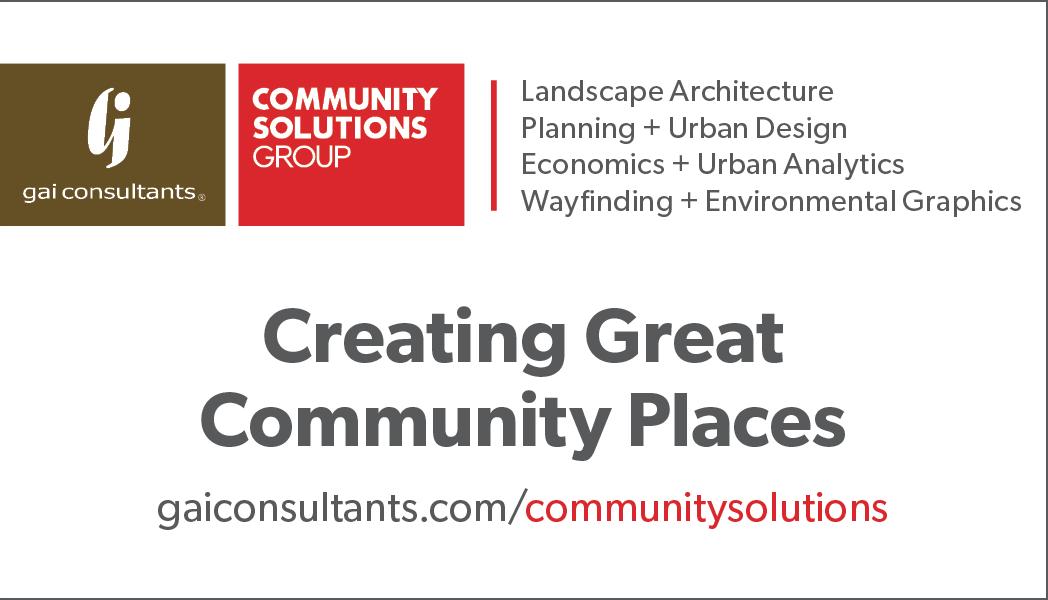
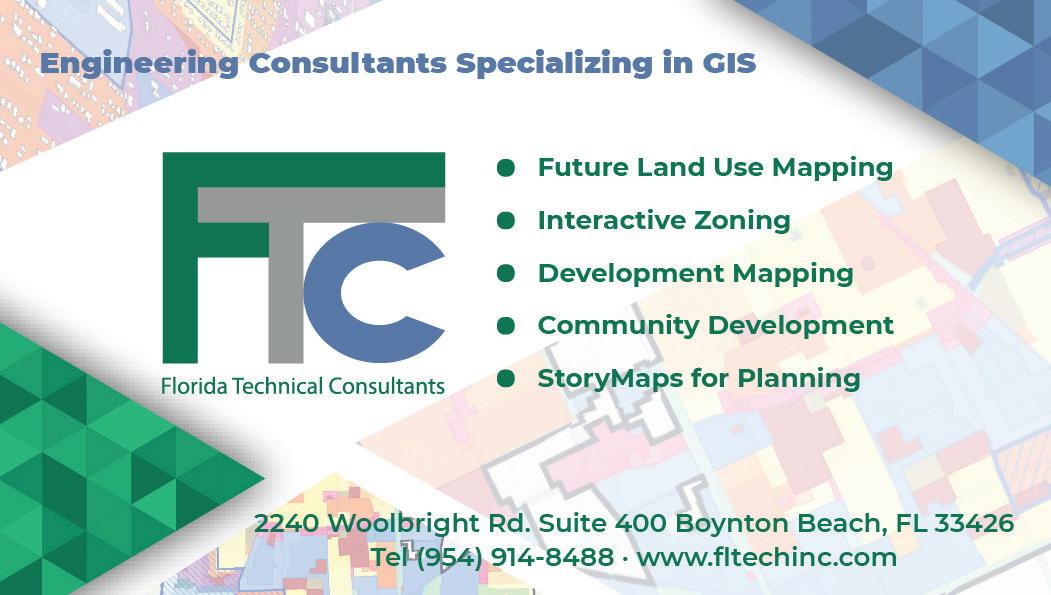

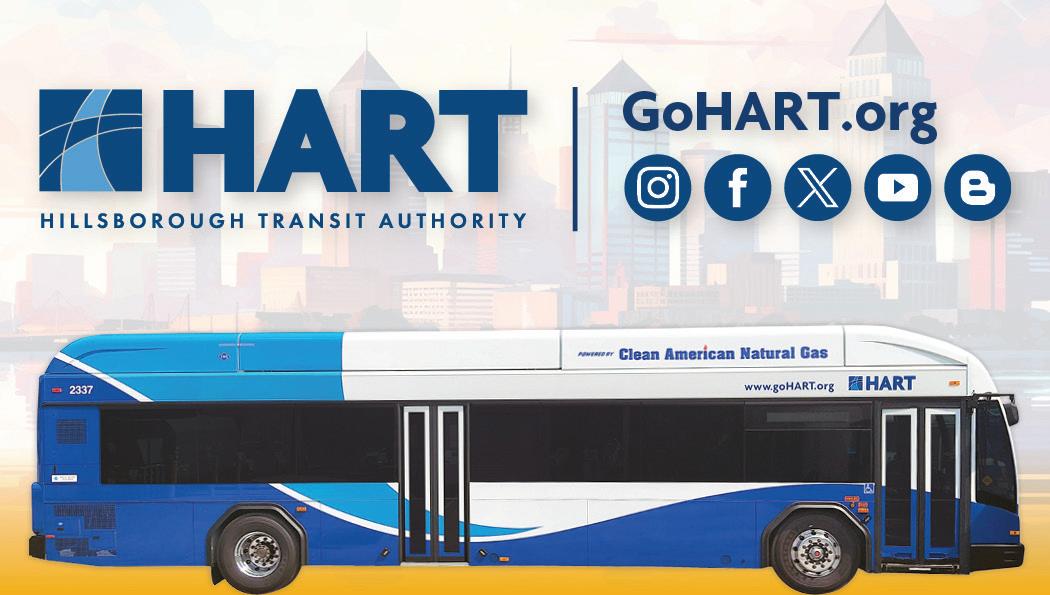

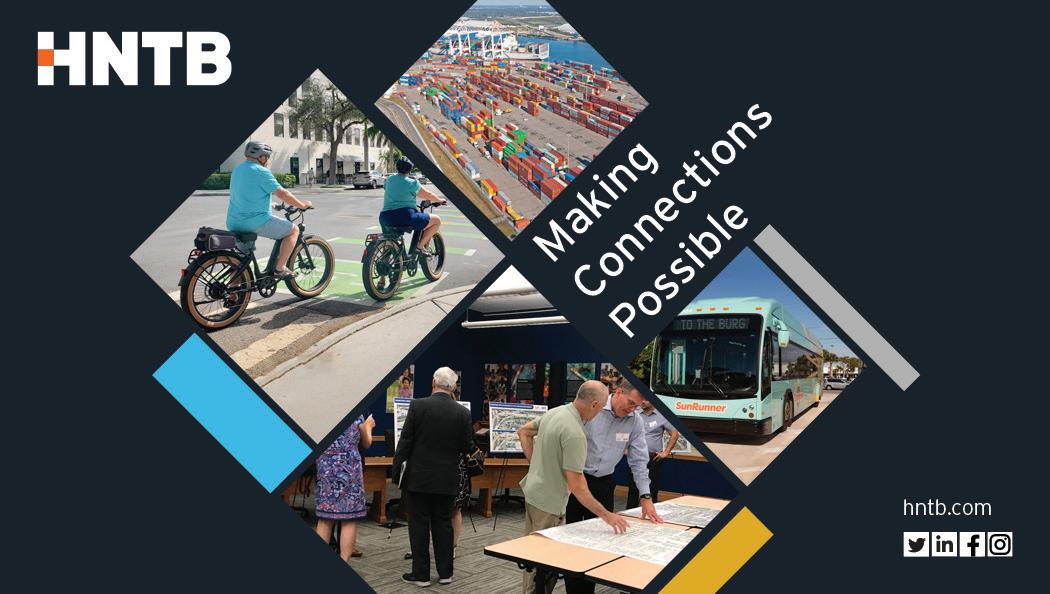
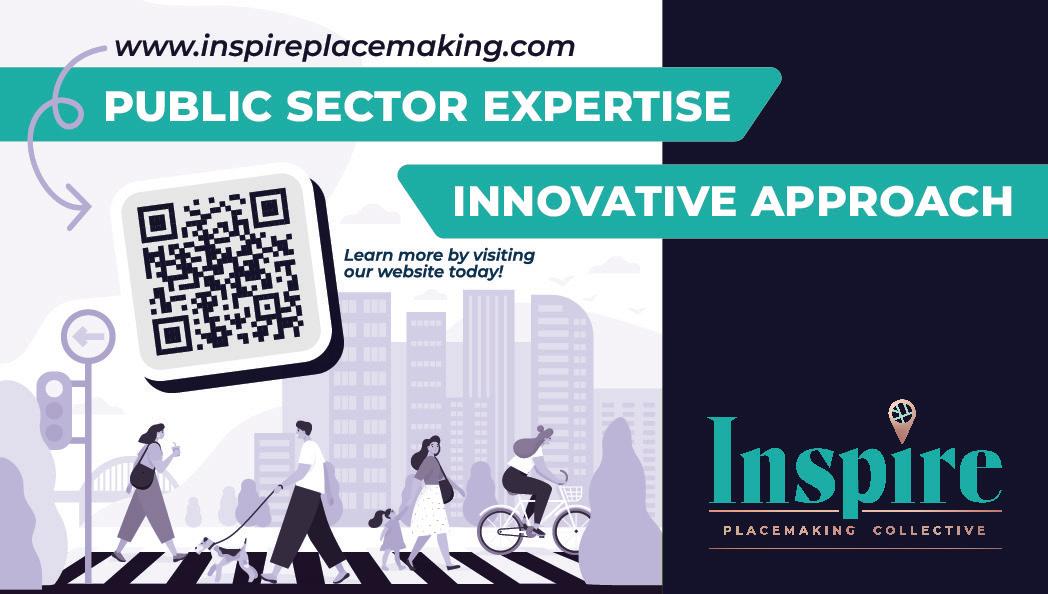
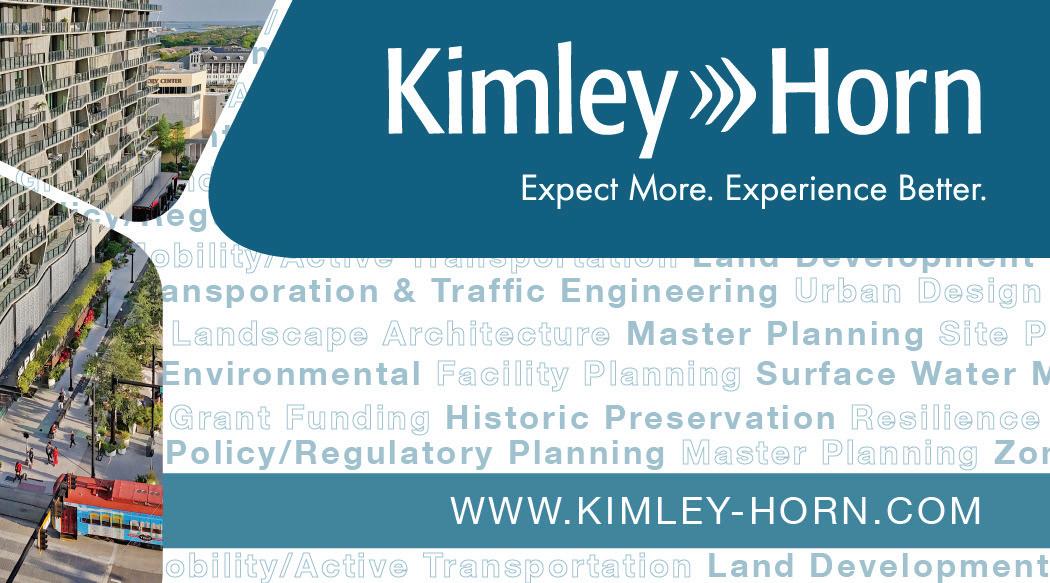

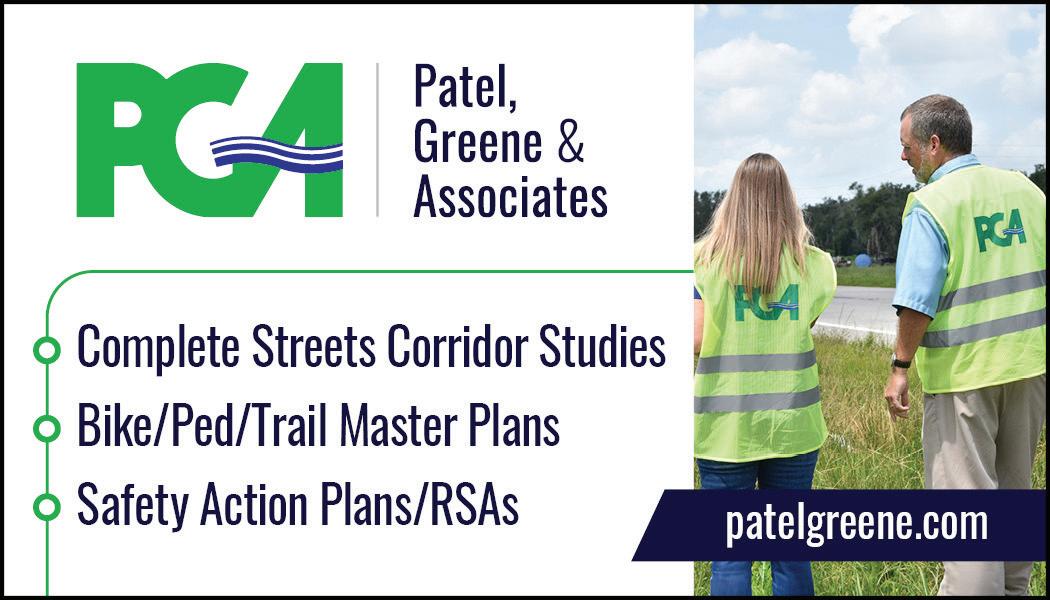
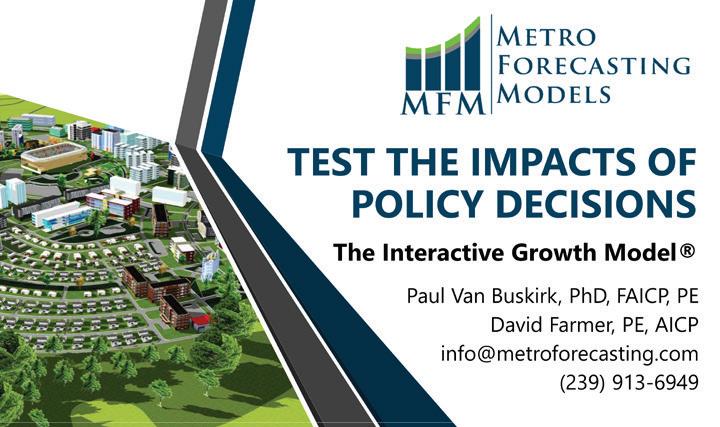
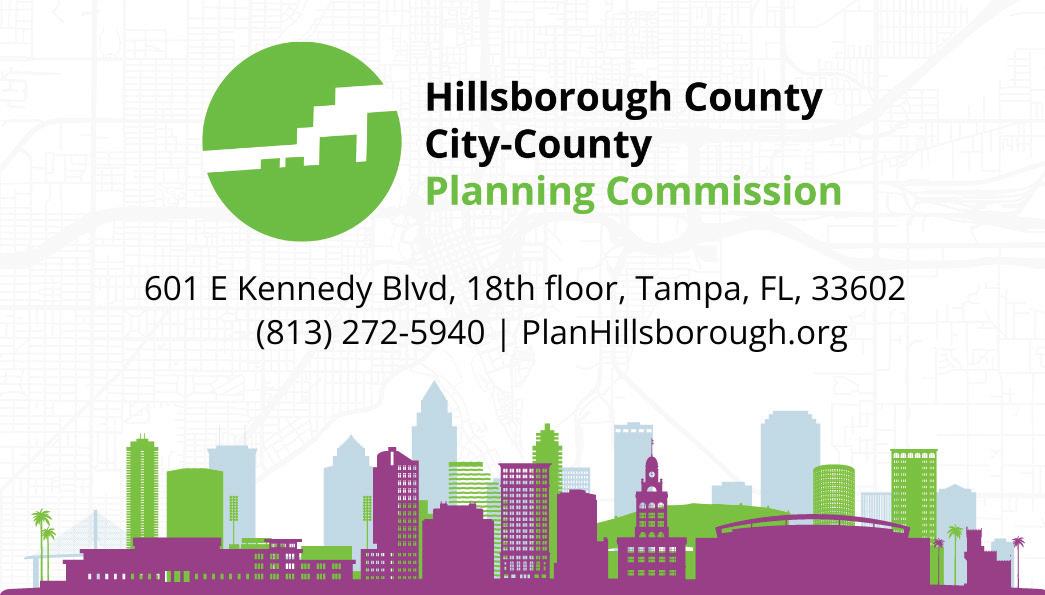
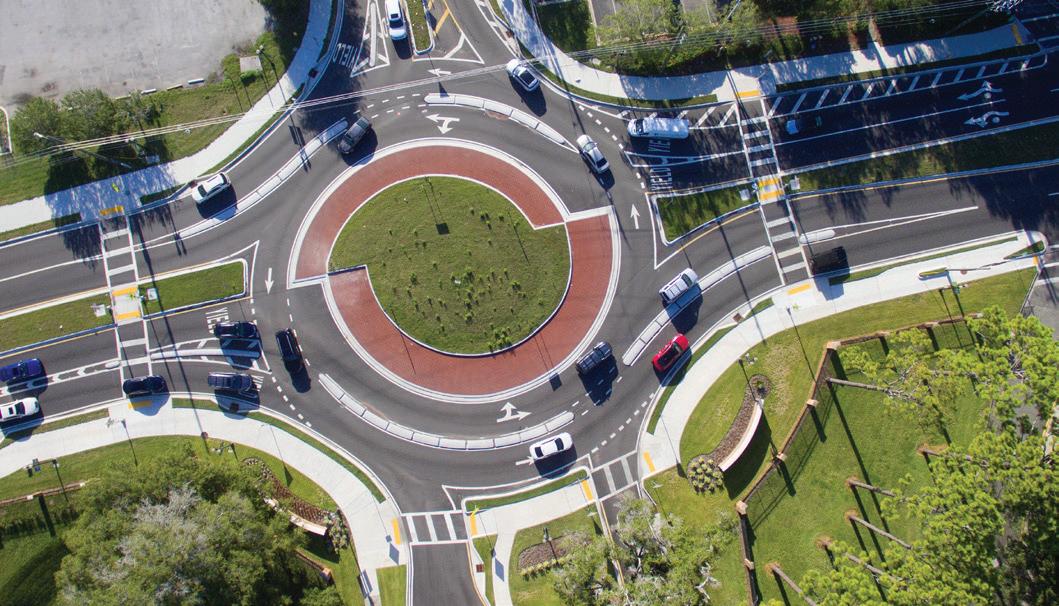


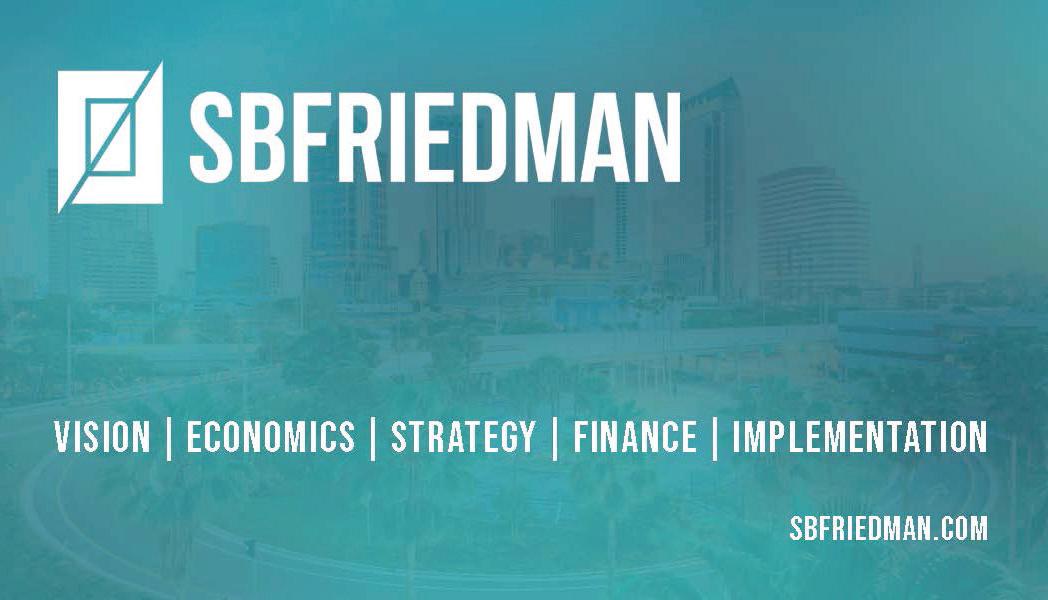
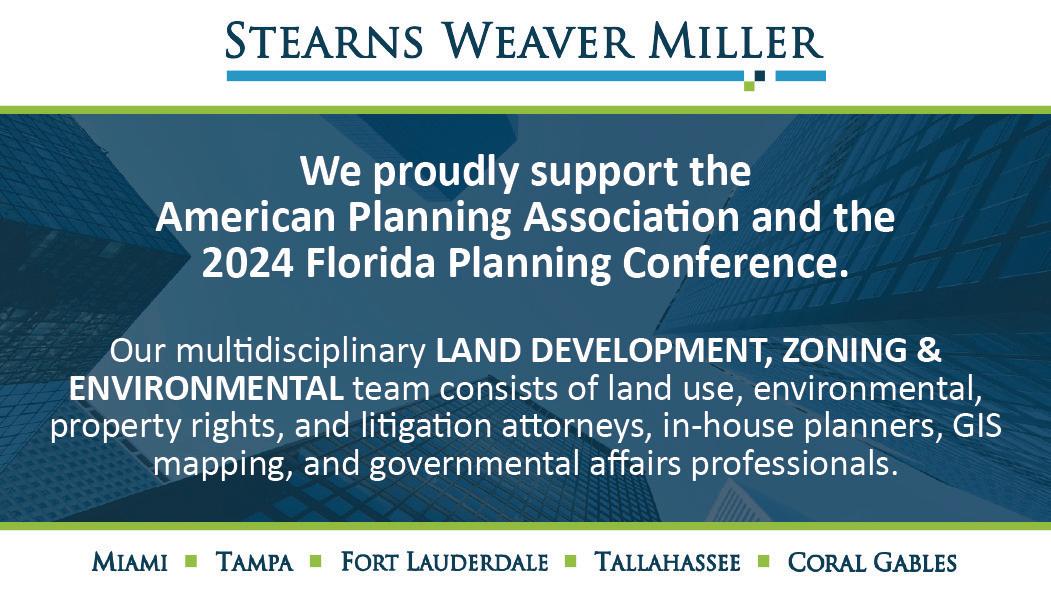



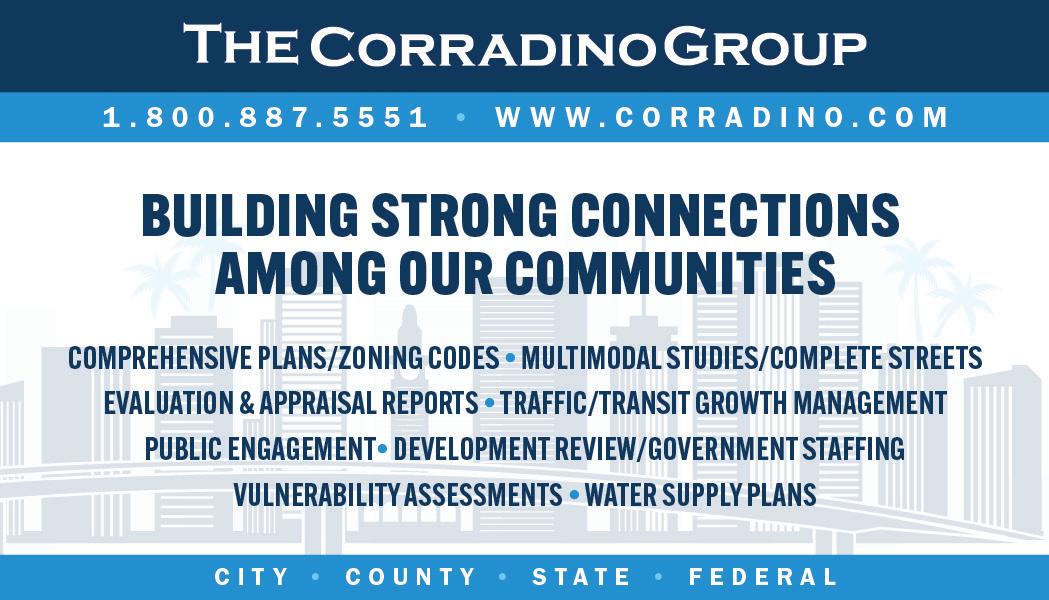
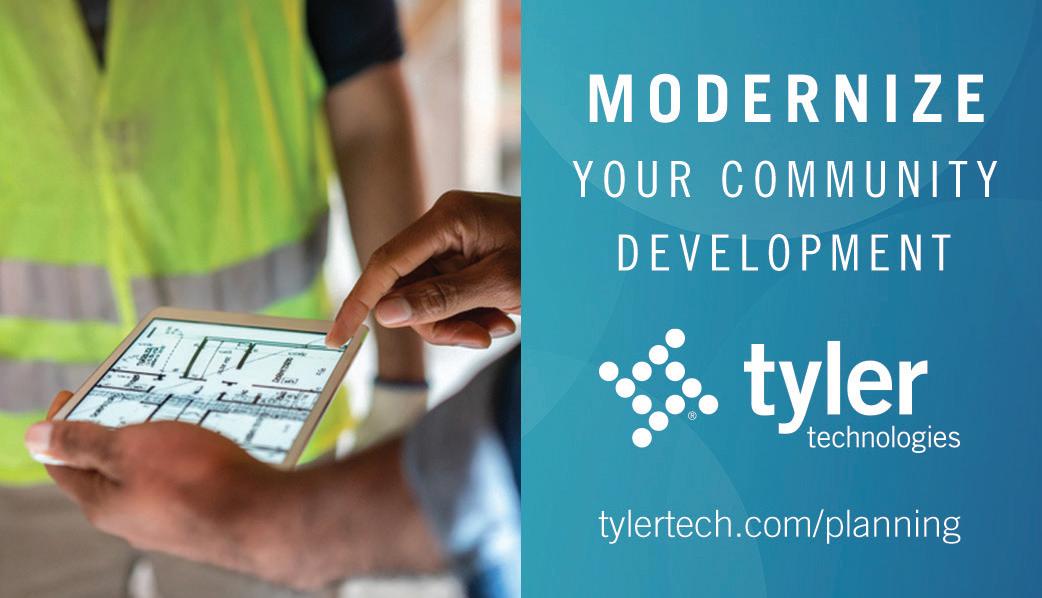
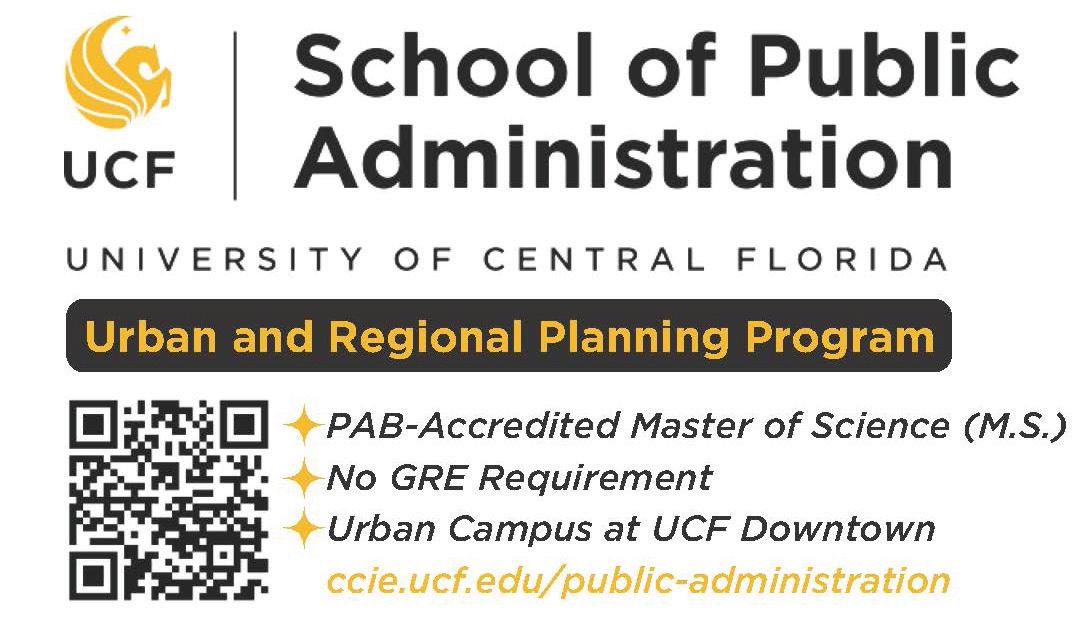
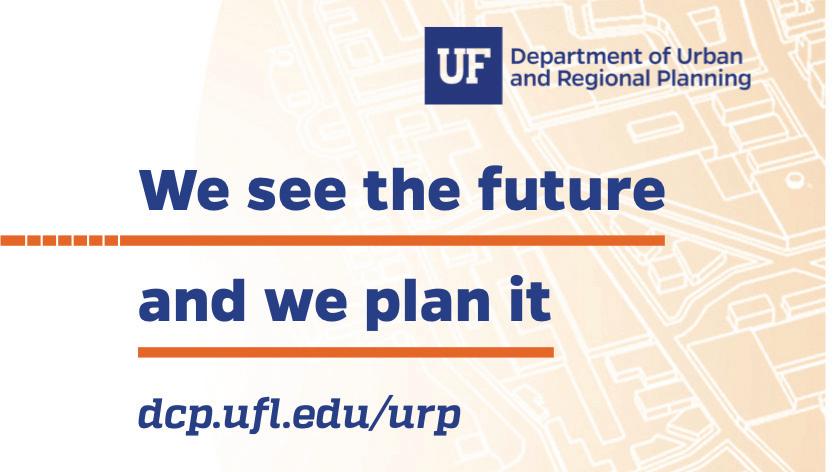
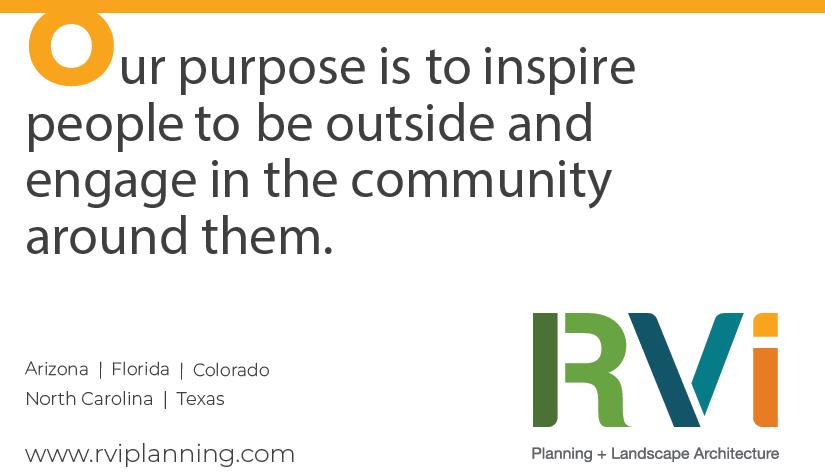

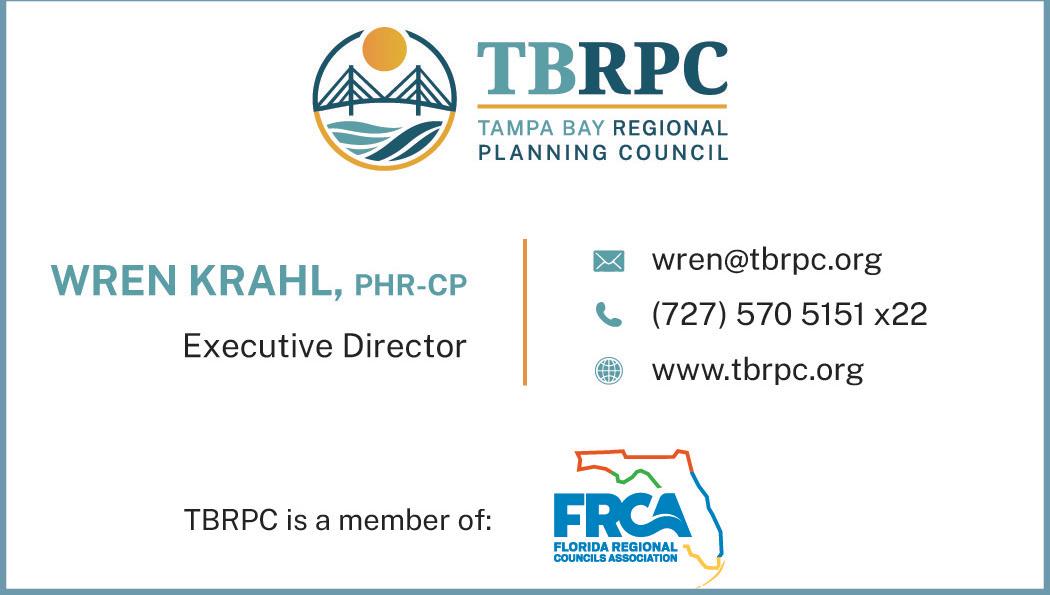




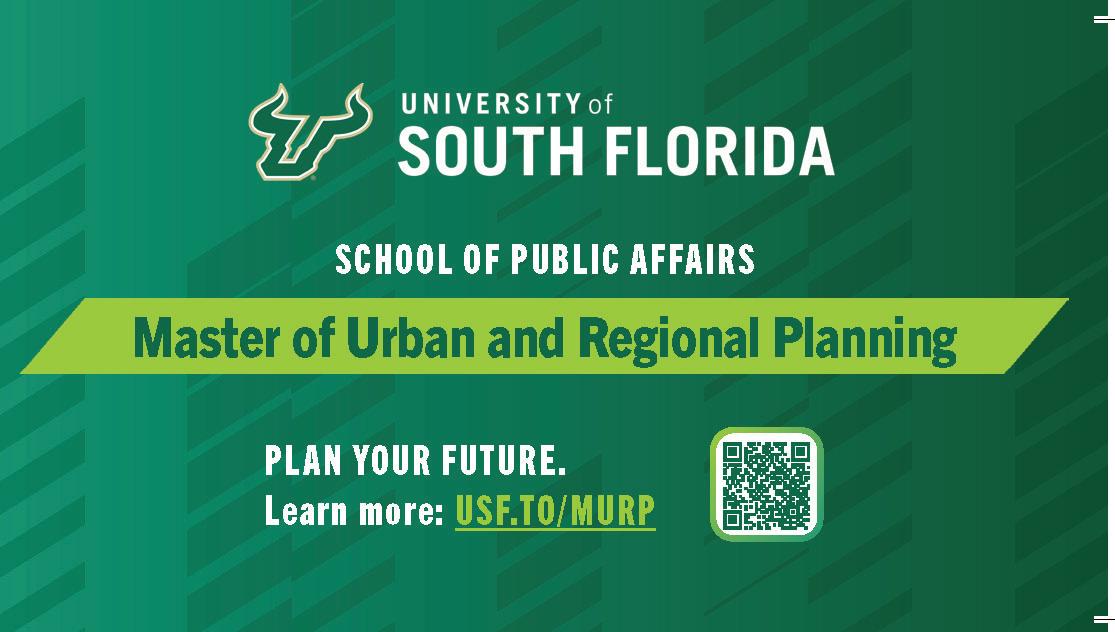
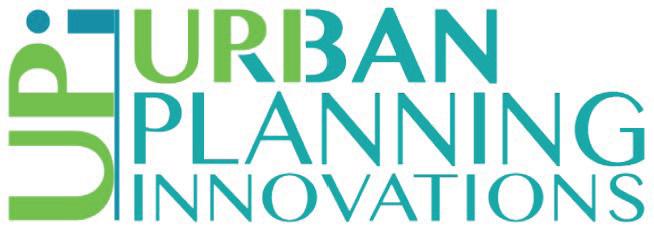
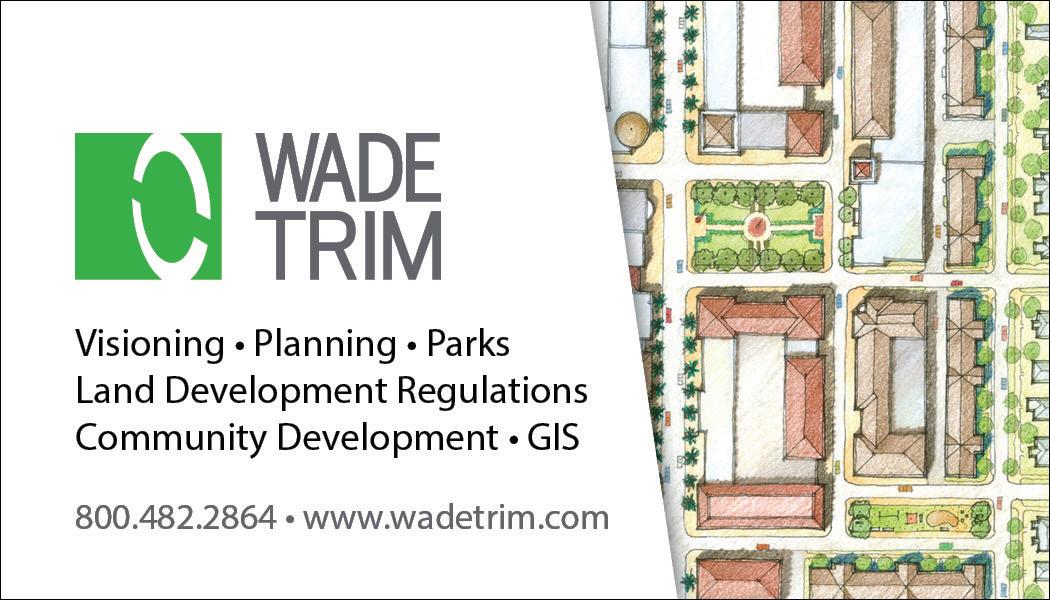
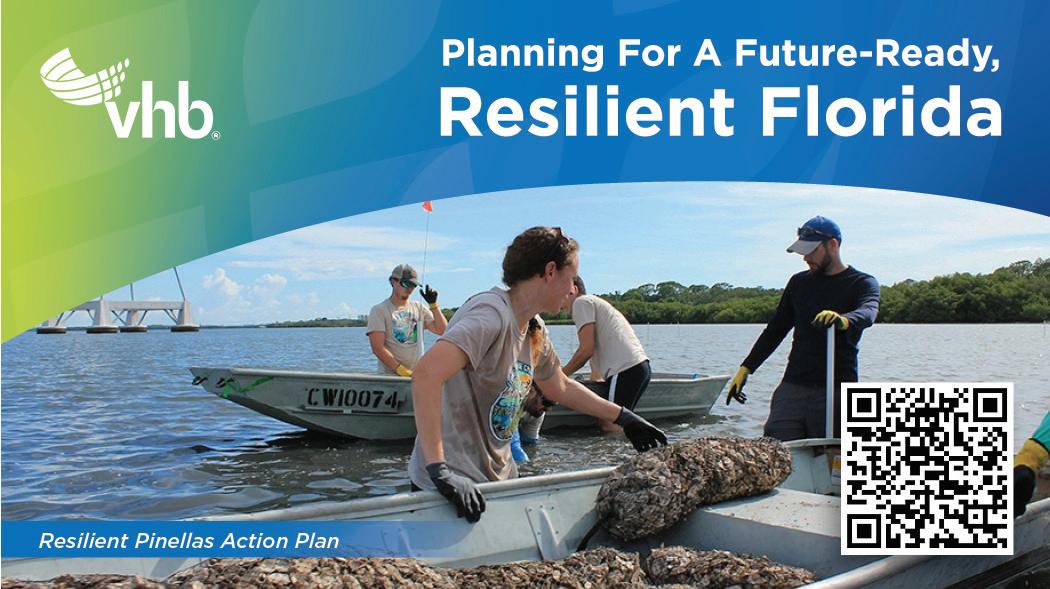
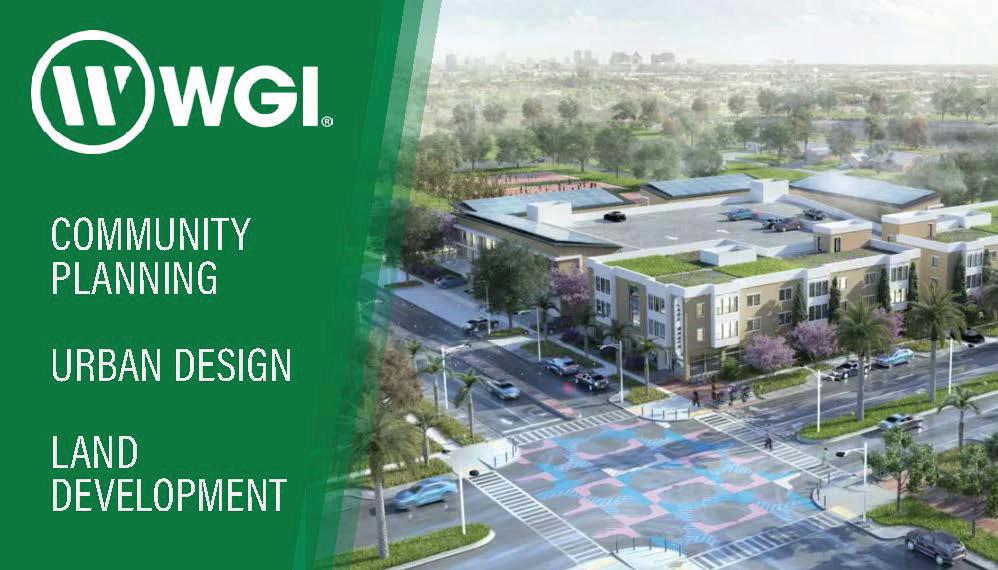
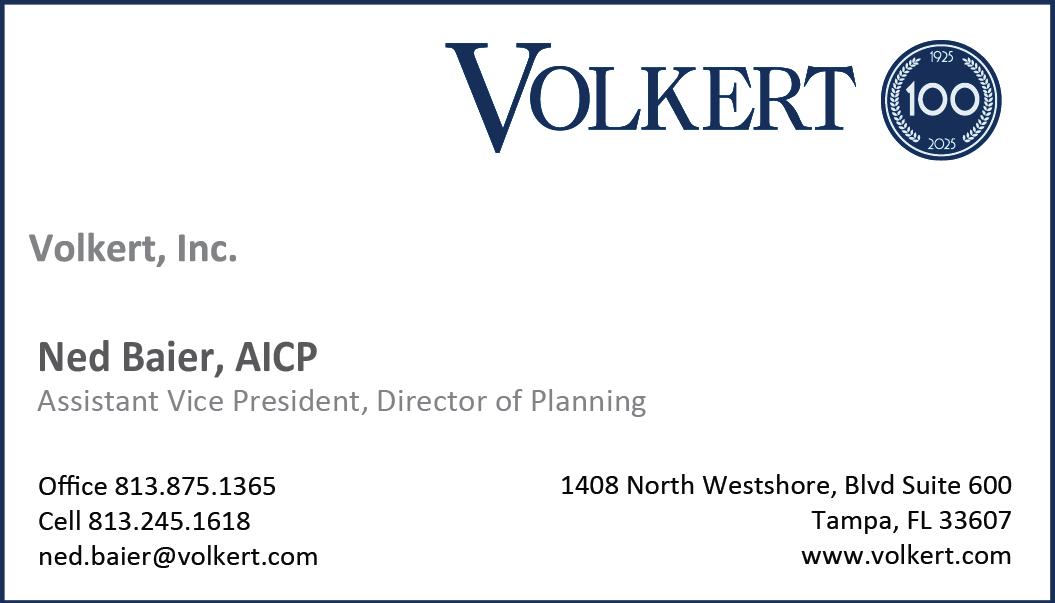
continued from page 6
“We need to manage our assets wisely to ensure long-term sustainability.”
The engineers agree that the future lies in a “One Water” approach — integrating gray and green infrastructure, fostering interagency collaboration, and investing in staff training. “This isn’t your father’s utility anymore,” Niforatos said. “It’s about helping communities survive, adapt, and thrive.”
As utilities across the country face mounting pressures, the message from these experts is clear: resilience isn’t optional, it’s essential.
Chris Niforatos, P.E., is an Associate Planner with Kimley-Horn. He can be reached at chris.niforatos@kimley-horn.com.
continued from page 10
informed the prioritization of projects, with intersections like Ridgewood & Fillmore and corridors like Lincoln Avenue receiving Tier 1 status for immediate attention.
The plan also outlines a phased Action Plan, categorizing projects into short-term (0–5 years), mid-term (5–10 years), and long-term (10+ years) goals. A detailed cost matrix and funding strategy — including leveraging over $225,000 in annual city allocations and pursuing state and federal grants — ensure the plan is both actionable and sustainable.
Ultimately, the Presidential Streets Master Plan is more than an infrastructure blueprint—it’s a community-driven roadmap for resilience, equity, and livability. By blending smart growth principles with environmental stewardship and civic pride, Cape Canaveral is setting a precedent for coastal cities facing the dual challenges of aging infrastructure and climate change.
Zach Eichholz is the Chief Resilience Manager with the City of Cape Canaveral. Kelly Klepper, AICP, is a Senior Associate Planner with Kimley-Horn. He can be reached at kelley.klepper@kimley-horn.com
Published by the Florida Chapter, American Planning Association, the Florida Planning digital magazine has a current circulation of 3,200 members, subscribers and other readers. Four issues are published a year.
For APA members, Send to: Member Records Department
American Planning Association 205 N. Michigan Ave., Ste. 1200 Chicago, IL 60601
Fax: 312-786-6700 or log onto www.planning.org/myapa
Florida Planning welcomes articles, announcements, letters, pictures and advertising. Call 850-201-3272 regarding articles. The next issue will be published November 2025.
Article deadlines are generally four weeks prior to publication. Ad deadlines are generally two weeks prior to publication. Consult the editor for any exception to this schedule.
APA Florida is a non-profit organization funded through membership dues and fees. Contributions are also welcomed for general purposes and earmarked programs. Please note that contributions are not tax deductible.
For news and information on chapter concerns, visit the APA Florida website at florida planning.org
APA Florida
2017 Delta Boulevard, Suite 101 Tallahassee, FL 32303
Phone: 850-201-3272
Email: connect@floridaplanning.org
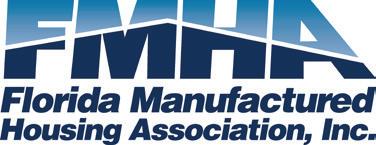
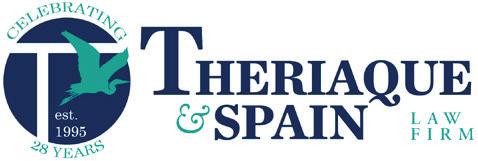







JULY 29: LEGISLATIVE SESSION REVIEW
Webinar. Hosted by APA Florida. What happened in Tallahassee during the 2025 Florida Legislative Session? Fantastic question and we’ve got the answers. APA Florida is hosting three Legislative Session Reviews to help our members break down the budget, the bills, and their impact on community planning across the state. Whether you’re a student, emerging professional, or seasoned planner, this series will keep you informed and empowered. Register here. Free. 1.5 CM or 1 Law CM.
AUG. 28: DEVELOPING AND BUILDING A NETWORK THAT WORKS FOR YOU
Webinar. Hosted by APA Florida. Please join us for this informative webinar to learn more about the importance of building a strong professional network and get tips on how to build your network. Learning objectives include:
• How to introduce yourself to others when first meeting them.
• Continuing a conversation after introducing yourself to others.
• How to nurture and maintain meaningful connections.
• How to leverage your contacts to add value as a planning professional and accelerate your professional growth.
• Why having a robust and diverse professional network is important. This webinar will be a good fit for planning professionals at all levels in their career who are looking to expand or diversify their professional network. Information here. Free. 1 CM.
Daytona Beach. Hosted by APA Florida. We’re excited to once again host the Planning Officials Training Workshop at FPC — a full-day, in-depth session led by some of Florida’s top planning experts. Whether you’re an appointed advisory board member, serve on a utilities or historic preservation board, are a city clerk, or work in local government, this workshop is designed to strengthen your understanding of:
• Local planning and zoning fundamentals
• Land use law and legal frameworks
• Future planning trends and best practices
• Effective public engagement strategies
• Ethics of the planning practice
All backgrounds and positions are welcome and no prior experience in planning is needed. This is a valuable opportunity to grow your knowledge and contribute more effectively to your community. $45. Registration options here.